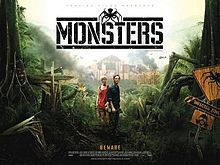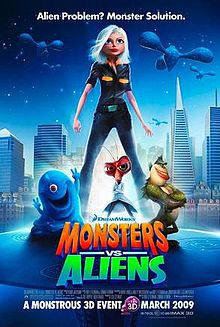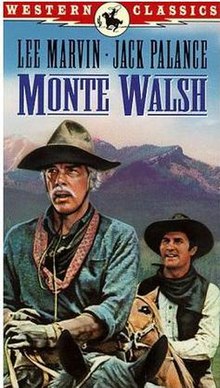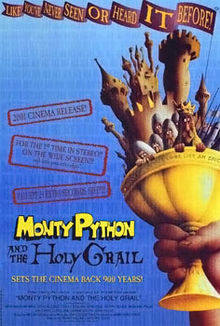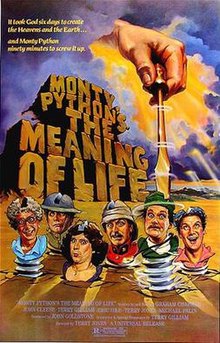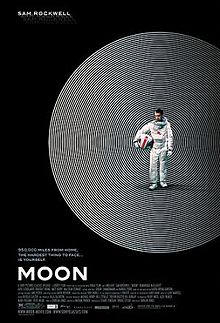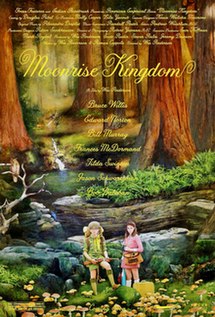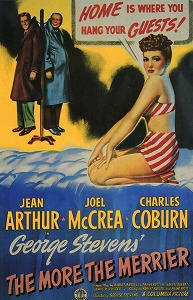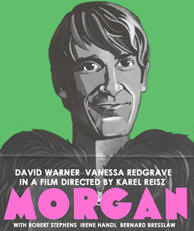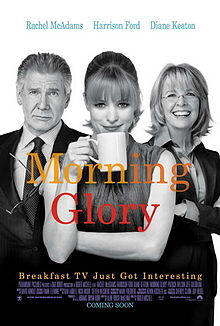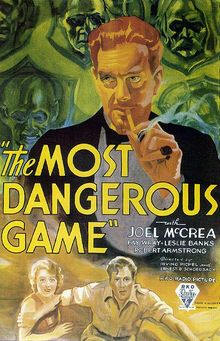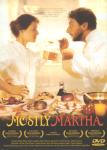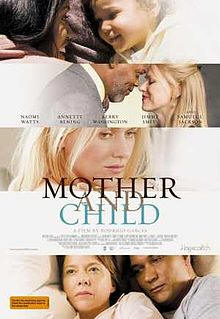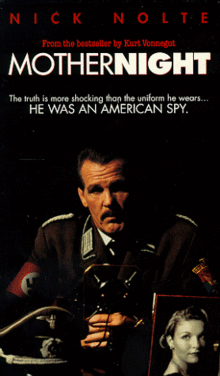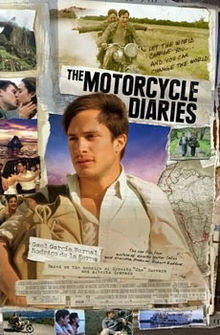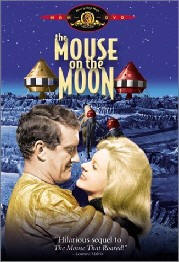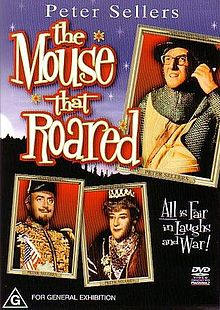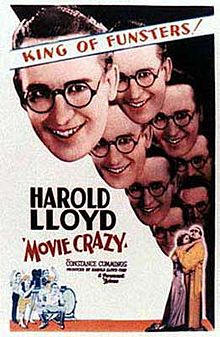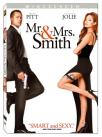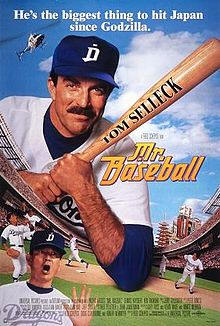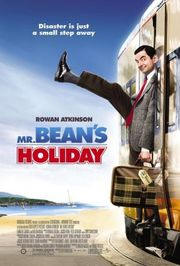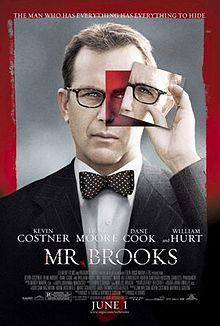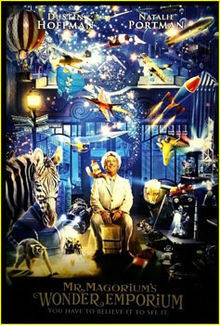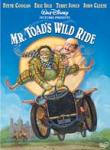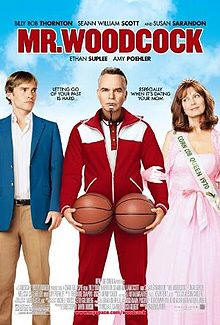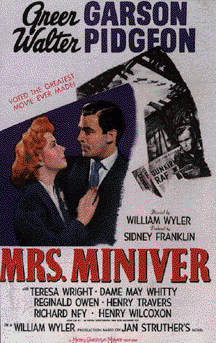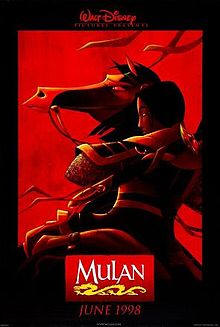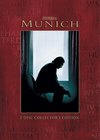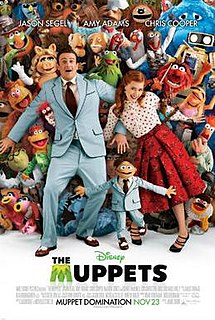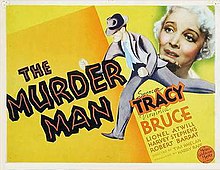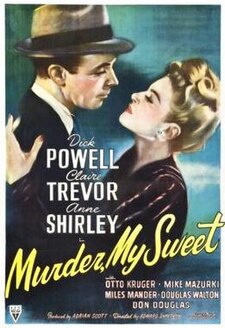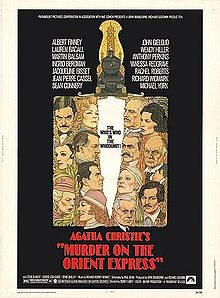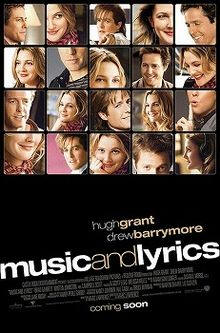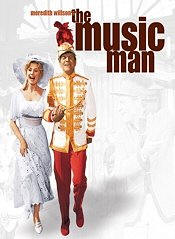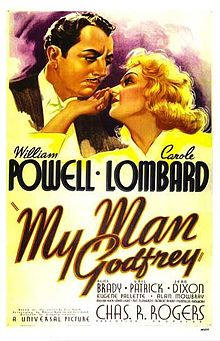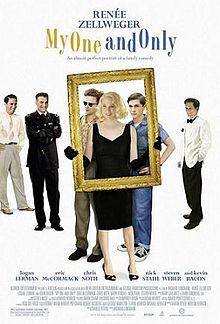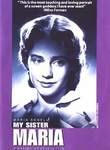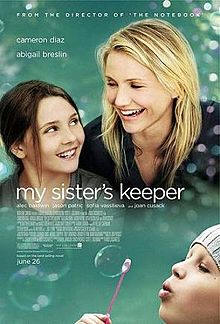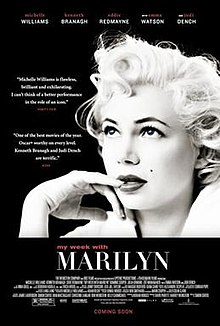|
Movies we've seen © 2004-2013 by John Varley; all rights reserved |
M
|
M*A*S*H (1970) See Top 25 Favorite Movies. IMDb.com The Machinist (El Maquinista) (Spain, 2004) I don’t know why the IMDb lists the Spanish title first, except that all the producers have Hispanic names. Oh, wait, I see that it was filmed in Barcelona. I’d never have guessed. A man claims not to have slept in a year. I don’t even know if that’s possible, but you’d figure big-time hallucinations, so we assume a lot of what we see may not be real. His life is clearly coming apart, but he doesn’t seem to be a bad guy. A loner, but not crazed. He even has a sense of humor, and is reaching out to a waitress at the airport and a whore with a heart of gold. So you wonder what is really going on, and when you find out at least it’s not some lame SF idiocy or supernatural bullshit. It worked okay, in that it was believable, but still a bit of a letdown. The movie looks great in a creepy way, and the music is pure dark and spooky. But the real story on this movie is that Christian Bale lost 60 pounds (from 180) to play it. I submit that this is insanity. This is health-threatening, and you can’t help stare at him. Looks like he just checked out of the Treblinka Holiday Inn. Okay, De Niro porked up for Raging Bull, and it was effective, and Renee Z. added weight for Bridget Jones and took it off for Chicago, but this is ridiculous. None of my business, of course, but I can express my disapproval, okay? IMDb.com Mad Dogs and Englishmen (1971) I’m not a fan of concert movies, but there are a handful of exceptions, and this is one. It follows the triumphant tour of Joe Cocker and his band—actually more like a family, in the good old hippie sense—through North America, the tour that made him a big star. There has never been and probably never will be again a singer like Joe Cocker. The first time I saw him I seriously thought he might have cerebral palsy. But no, he’s just the best white male blues shouter ever. I don’t know what his signature twitches are all about. But look at his mouth while he sings. His tongue is sticking out! He and Leon Russell covered some of the best songs of the era, many of them by The Beatles, and had a whole new slant on every one. They seemed to pick up members as the tour progressed, to the point that the chorus had about a dozen members by the time they do the last number. I am partial to rock bands that have a brass section, and chorus, and don’t spend a lot of time on ego-boosting guitar solos, and this crazy group fills all those needs for me. Highly recommended. IMDb.com Mad Hot Ballroom (2005) For quite some time now, schools in the five boroughs of New York City have been running a program from the American Ballroom Theater called Dancing Classrooms. About 6,000 kids enter the program, all of them 5th graders, 10 or 11 years old. Try to remember what you were like in the 5th grade. You’d passed through that brief period when it didn’t much matter which sex you were; boys and girls played together, sometimes, though the boys were rougher. Then the segregation began, some regimented, and some self-enforced. All through elementary school girls stuck with girls and boys stuck with boys. If you were a girl you might have had a crush on a particular boy. If you were a boy, you mostly thought of girls as a nuisance. (The general rule, okay? There’s always exceptions.) Each gender was pretty much a mystery to the other. Boys were weird. Girls were hard to understand. Now get a couple dozen of these kids together in a gymnasium and tell them to take each other’s hands, put your hands on your partner’s waist or shoulder, and … look deeply into your partner’s eyes! Most of these children have not touched a member of the opposite sex, in any way other than an accidental or intentional bump in the hallway, since kindergarten. Some of them are still on the innocent side of puberty, some are in the confusing middle of it, and a few have already been whomped upside the head with it like they was hit by a crazy stick. Very, very scary! At the beginning, you never saw so many left feet, as each child has two of them. They are total stiffs, and they don’t much like this class. But the teachers manage to ignite a fire, and each time we see the kids they are more into it, until by the time of the Big Contest they’ve reached the point where it’s pretty much all that matters to them. For now. But there are preliminaries, semi-finals, lots of hoops to dance through before they can go to the Rainbow Team finals (where one of the judges is Ann Reinking). And of course, there can only be one winner, which means there are lot of losers, as in all of life. So what are you going to do? You can’t have a swim race without a winner. What’s the point? It’s a race, somebody wins. You can’t play poker without money; money is the entire reason for poker’s existence, no matter what my ex-wife tried to sell us on. (“Let’s just play for fun!” “Poker, for fun?”) You can dance for fun, most of the dancing in the world is for fun … but the plain fact is, people will work harder if they are in competition with each other, they will get better quicker, they will find an intensity few can achieve for “fun.” I think the contest at the end of this class is a good thing … but there is a price to pay. Most of these kids have never been in a hard-core competitive environment. They’ve never really lost. They don’t know the heartbreak, the sense of failure and shame. They’ve worked hard. It’s tough to watch the losers, because their grief is right out there in front. There is no stiff upper lip in the fifth grade. These children are crying, and most of all, confused. They thought they’d win. In all of our mental movies, we are Rocky, we are the underdog who wins the Big Game in the last five minutes. It’s a hard lesson to learn, at age 10, that there are always far more losers than winners, and that, in your life, in all probability, you are going to lose many more times than you are going to win. But it’s a lesson we all have to learn (except for Michael Phelps and his ilk). The first-time director, Marilyn Agrelo, focuses on three schools:
(And by the way, it’s always seemed odd to me that New York City gives its schools numbers rather than names. I just can’t imagine how their cheerleaders could go out there and holler “Go PS 134!” And what are their school mascots like? Letters? The PS 56 Zees? It's not as if NYC doesn’t have enough famous native people to give each school a name. There’s Fiorello La Guardia, Bella Abzug, John Lindsay, Peter Stuyvesant, Son of Sam, Typhoid Mary, Boss Tweed, John Gotti …) I don’t know how many schools she assigned camera crews to in order to be fairly sure of having a lot of footage of the eventual winner (and she got it, the winner is one of those three), but I assume there were others. There is a little footage here and there of the previous year’s winner, from Forest Hills in Queens, which I gather is a pretty upscale neighborhood. I didn’t like their teacher. But I loved this film. It’s been compared to Spellbound, but I liked this one better. The tension at the end was unbearable … as it was in Spellbound, but in a creepy way. The spelling bee kids were under terrible pressure, mostly from their parents, including one scumbucket who had hired 1000 people back in India to pray for his son’s victory. (The boy lost, and I’d hate to have witnessed the scene back in their hotel room.) Here, in this movie, the parents are simply supportive—those who are there; we don’t learn too much about some of the probably dysfunctional families. Some reviewers criticized the director for showing so little of the home life of these kids, but I didn’t miss it. It’s enough to know that most of the parents at PS 115 didn’t speak English … and many of their kids were still picking it up, too. I’m glad this movie concentrated on the kids dancing, with scenes here and there of their naïve and often funny but sometimes wise observations on life. Oh, they have so much to learn, and some of it will be so hard … and yet many of them look tough enough to deal with it. Others … well, it’s going to be rough for them. It’s also about teachers. You hear stories of incompetence in the classroom, and I’m sure there’s a lot of it, but it really makes my day to see people as dedicated as these dance instructors are. They live and die by their kids, but not in a bad way. We see them encouraging and pressuring the beginners—not taking any bullshit from them—and consoling the losers, and celebrating with the winners. There’s much to be learned, win or lose. One teacher breaks down on camera while talking about what little ladies and gentlemen her students are becoming. She can’t go on. And, believe me, though Marge and Gower Champion would never have anything to fear from any of these kids … they are good! The improvement in 10 weeks is astonishing, as we see them tackle the tango, salsa, swing, rumba, and foxtrot. Every once in a while, life really is beautiful, if only for a moment … IMDb.com Mad Max (1979) Mel Gibson gets the shit kicked out of him for the first time. IMDb.com Mad Max Beyond Thunderdome (1985) Mel Gibson gets the shit kicked out of him in some weird dome thingy. IMDb.com Madagascar (2005) Like The Lion King, this movie has to deal with the paradox of a carnivore associating with herbivores. Simba solved it by eating grubs and maggots (uh, no thanks, but I will have some of the BBQ meerkat, thank you), which just made me wonder, what about insect rights? Here, Alex the lion learns to eat sushi (actually, I don’t think he’d dig the rice, though he’d probably like sashimi) ... so, eating Nemo is okay? Heartless! A movie like this, where the main moral dilemma is predation and being a carnivore is intrinsically bad because you have to kill some sort of cute little sentient critter to survive, makes me realize the pitfalls in adopting the Disneyesque view of the world, and why Bambi was probably a lot easier to write. What, am I serious here? No, not much. None of this is any more serious than Elmer Fudd hunting wabbits and ducks. And yet, I am, just a little bit. The movie wants you to think about a guy eating his best friend, and the solution is to eat somebody else’s best friend. Of course, the one fish we see doesn’t talk, he just lies there like a fish, but we know he does talk, down there under the sea with Sebastian the hermit crab and Ariel the mermaid. Okay, enough of that. The film is funny and frenetic, sometimes too frenetic. CGI is so easy now, “camera” moves are unlimited and built in to the technology, that I think animators are going a bit overboard. But maybe it’s for the same reason they shake the camera these days even in a static shot. Kids won’t watch something that stays still. But stillness can be the heart of humor, as in the film’s funniest scene. Four penguins (by far he best characters in the movie) have broken out of the zoo—hurray, we’re free!—hijacked a freighter, and ended up in the paradise of their dreams: The Antarctic. There is a long shot of them standing there with their backs to us, maybe twenty seconds, four tiny dots, the wind howling, the snow swirling. You can practically hear their minds working. One turns to the others and says, “Well, this sucks.” IMDb.com Madagascar: Escape 2 Africa (2008) Second feature at the drive in with Twilight. IMDb.com Madame Curie (1943) You don’t watch these ‘40s biographies to learn about the people being profiled, at least not if you have any sense. They will follow the grand outlines of the life of the person in question, where they were, the notable things they did (though those events can be seriously skewed, too), but everything else is made up by the screenwriter. I have no idea—though I strongly doubt it—if Pierre Curie was the unworldly, sexually stifled, off-the-shelf “man of science,” to whom nothing mattered except Science. And I do know that they skimmed over very important social and family relations, and completely eliminated Marie’s sister, who she was very close to. But if you want to know the facts, read a book. The reason to watch movies like this is to appreciate the performances of great actors like Greer Garson and Walter Pidgeon. This was the third of eight movies they made together, and in this one the great Dame May Whitty appears again, as she did one of my favorite movies, Mrs. Miniver. All three of them are very good, as is the supporting cast. It was such a great tragedy. As pioneers, they had no idea of the harmful effects of radiation, and did things that would make a scientist today turn white with terror. All her notes and even her cookbook from the 1890s are still so radioactive that they are kept in a lead-lined box and can be studied only by people wearing protective clothing. But I have to say this one is particularly predictable and clichéd. As soon as Pierre turns to Marie and thoughtfully says something about what the survivor would do if one of them died, you knew he had only hours to live. And that’s only one. And the omissions bothered me even more. She not only was not shattered by his death (beyond a reasonable period of mourning) but she re-married not long after. We never see this fellow. Worst of all, what we see is France showering honors on this remarkable woman who won two Nobel Prizes and discovered Radium and Polonium. That was not the case. The French disliked, even hated her, and honored her only when they would look like even bigger jerks than they were if they didn’t. Why? Well, first, she was Polish. Gallic xenophobia. Even worse, she was Jewish … only she wasn’t! But the rumor kept popping up, and to my mind, the biggest difference between German anti-Semitism and French anti-Semitism was that the French didn’t burn their Jews. But many of them were all too eager to turn them over to the Fucking Nazis. So, this one crossed a line even in my tolerant view of revisionist history in biopics. I can’t recommend it. IMDb.com Made For Each Other (1939) I usually cut a lot of slack for these movies of the ‘30s and ‘40s, but this one just got my goat. It reminded me of a much superior film also starring Jimmy Stewart, It’s a Wonderful Life, but doesn’t deserve to be mentioned in the same sentence. Jimmy and Carol Lombard meet and get married in 24 hours. Even I found myself agreeing with his boss and his mother that this was a trifle hasty … for a little while, anyway. He’s a struggling young attorney trying to make partner in a law firm. His boss, Judge Doolittle (the great Charles Coburn) doesn’t see it that way, and promotes an incompetent over him. The couple have a baby, and Carol gets tired of hearing hubby complain about how he’s not getting anywhere, and advises him to stand up for himself! And boy, did I agree with her. The boss is an asshole, and the mother, who lives with them, criticizes literally everything Carol does, and he won’t grow a pair of balls and stand up to either of them. It’s all just so damn predictable. I knew from the moment they boarded the Normandie for a honeymoon to Europe that they’d be called back so he could handle a big case. I knew that, like George Bailey from Bedford Falls, they would never get to Europe. I even knew that when he came back from drowning his sorrows in booze, he would drop the milk bottle he was drinking from. Then the kid gets sick. The only thing that can save him is a rare serum that’s only available in Salt Lake City, 2,000 miles from New York. But there’s a blizzard in Mormontown, and only an insane man would fly in that weather! Needless to say, an insane man is found, but seems to be lost over the Rockies. Carol is despairing, and right on cue a nun pops up and says there is one thing she can still do. Pray. I hate that! The whole idea that God answers one person’s prayer and right down the hall, ignores the prayer of another, is one of the most awful things I can think of. It means “I am God’s favorite! I am better than you, whose baby died!” I don’t know how a good Christian can even entertain the thought, and yet these people even pray to win a football game! And suddenly, when they need help, the boss and the mother become stalwart, loving, good Samaritans, and I didn’t buy that for a fucking minute, either. All in all, this movie just sucks. IMDb.com Made in Dagenham (UK, 2010) Here’s a fun movie about labor organizing that will surely remind you of Norma Rae, and possibly of The Pajama Game. Who can resist a story about the little people rising up against the people who are exploiting them? I sure can’t. This one is about a strike in 1968 at a Ford plant just outside London. Ford employs 40,000 men and 187 women, all of them in the upholstery room which leaks when it rains and is so hot in the summer that the ladies work in bras and panties. They are classified as unskilled, and paid a fraction of what the men make. Naturally, Ford maintains that if it increases their wages even one penny per hour, they will go broke. Hello? Can anybody in this stupid company do math at all? You could pay the women ten times what they’re getting and never budge the bottom line. But the corporate instinct is to fuck you over, even if they don’t have to. The women go on strike, and (surprise!) eventually win wage parity. The movement spread all over the world, except for the countries we’re now exporting all our jobs to, which don’t have unions. When those countries unionize, the manufacturers (Apple, Nike, HP, all you others, I’m talkin’ to you, assholes!) they will look for cheap labor on Mars. The story is rather routine, even though it is true. I could see all the plot points coming. You will, too, I’ll bet. But it is saved by a great performance by Sally Hawkins as the working-class mom turned organizer, and by two great British pros, Bob Hoskins and Miranda Richardson. IMDb.com Mafioso (1962, Italy) Antonio is a Sicilian who left the island years ago and has made a life for himself in Milano, where he is happily married with two daughters. But he feels the pull of Sicily, and returns with them to visit his family. He’s sort of an Italian Clark Griswold, he overdoes anything he attempts, so he assures the wife that it’s not what she’s heard it is, crawling with Mafia thugs, in fact, it’s paradise! You’ll love my family, and they’ll love you! They don’t, of course (though the family learns to like her later, in a well-done scene), and the place is terribly rural for these city folks, with chickens scratching under the bed, stuff like that. Antonio had done some work for the local boss, a deceptively gentlemanly piece of shit called Don Vincenzo, when he was a boy, and after calling to pay his obsequious respects to the Mafia turd, he finds out just how terrible they can be. I won’t reveal any more, but suffice it to say he finally sees the real Mafia, who do things that would gag a maggot in the name of honor and loyalty. Monsters, every last one of them. Don’t believe that Godfather crap. The movie shifts from a light comedy to scary events so subtly you hardly notice it happening, and then you’re on the edge of your seat. Highly recommended. IMDb.com The Magdalene Sisters (2002, UK, Ireland) One of the best of the sub-genre of movies dealing with the atrocities committed by the Catholic Church, or the Catholic-dominated government, of Ireland. I’ve seen half a dozen of them, and they all boggle the mind. This particular one lasted until 1996, if you can believe it. Young women were consigned to "laundries" that might horrify a San Quentin inmate, without trial, for crimes including getting raped, getting pregnant, or just flirting with boys. And it could be a life sentence. The nuns could teach an Abu Ghraib MP a thing or two about humiliation. Excellent film, and the best thing in it is a first-time actress named Nora-Jane Noone. I’ll be looking for her again. IMDb.com The Magnetic Monster (1953) Here’s a perfect illustration of two sort of sad facts. One, I’ll bet a lot of drive-in audiences were pretty pissed off at this film. There is no “monster,” as most patrons would expect. It’s about some mysterious “element” that absorbs energy and turns it into matter, doubling in size every 11 hours. Soon, it will be heavy enough to knock Earth out of its orbit. It also manifests “unipolar magnetism,” magnetizing every metal thing around it. So if you were expecting giant radioactive crab lice—and wasn’t everyone, in 1953?—you were certain to hate this. So the poster and the title were fucking with us. And, two, if you do try to make an SF movie with at least a nod toward real science and scientists … it’s boring. I’ll admit it, I watched this hoping for those giant crab lice. Instead, we get scientists peering at oscilloscopes and other lab furnishings of the era (most of it actual devices and not just random flashing lights, according to the credits), and solemnly talking about stuff that almost makes sense if you know any real science. Curt Siodmak, writer and director, made a lot of early SF things like this, and he did know a little science, enough to shoot the shit more convincingly than most people in Hollywood. He was best known for Donovan’s Brain, book and movie, which wasn’t bad. The head scientist is the ever-reliable, ever-grimly-and-humorlessly-concerned Richard Carlson, of I Led Three Lives. You old enough to remember that cold war turkey? The movie is peculiar, as for the first hour it is super cheap. Long takes of people walking into buildings, cars arriving in driveways, time-filling shit like that. Crude office sets, cheesy labs. Then suddenly in the last 15 minutes we are brought to a huge set, the “deltatron” deep underground in Nova Scotia. It’s five or six stories high, swarming with people, and resembles the sets in Fritz Lang’s Metropolis. Where did that come from? I wouldn’t be surprised if it was a leftover set from something with a bigger budget. Grade B moviemakers did that a lot. If it was, IMDb doesn’t mention it, and I can’t identify it. Whatever, it’s pretty impressive. But in the end, this isn’t really worth your time. IMDb.com The Magnificent Ambersons (1942) This was the second film Orson Welles made in Hollywood, and the first one he didn’t control entirely. He never again had the sort of blank check he had for Citizen Kane, and spent much of his life trying to raise the money he needed for his independent projects. So the studio took control of this one when it was finished, and cut one hour from the running time! Not only that, they destroyed the deleted footage, so that it can never be reconstructed. In spite of that, what is left is pretty magnificent. Oh, how I would have loved to have seen that original cut! It’s not that this version feels abbreviated, but there is the sense of a lot going on that we never get to see. Oh, well, I’ll just cherish what we do have here, which is a defaced masterpiece. IMDb.com The Maid (La nana) (Chile, 2009) There was a time in my life when I had a cleaning service come to the house once a week and tidy things up. That’s my only experience of household help. Even that little bit made me uncomfortable. I think if I got rich I could get used to having employees to garden, clean, and polish the Rolls and feed the polo ponies, but I think I’d want to keep it on an employer/employee basis. Some rich people do it that way, but not, it seems, in Chile, where live-in maids come to work on a long-term basis and often are seen as part of the family. They never really can be, of course, which leads to some uncomfortable situations. But this movie kept surprising me. You expect it to divide neatly between the bad, insensitive family and poor, abused Raquel, but it’s never quite that simple. Raquel has worked for this upper-middle-class family for over 20 years. She knows no other life. We begin with her 41st birthday party, which is awkward. There are family tensions all over the place. The mother sincerely loves Raquel, but will never be able to see the world through her eyes. And frankly, Raquel is starting to go a little crazy. When the mother hires someone to share the workload, Raquel declares war. She is defending her turf, all that she has. She drives the innocent little Peruvian girl away in tears, and even deals with the next helper, a crusty old cynic. But the third girl is too tough for her. She deals with Raquel’s aggression with love, which Raquel is powerless against. She finds herself, maybe for the first time in her life, with an actual friend who likes her simply for who she is. And then even that doesn’t go where you expect it to go … This movie won awards all over the Spanish-speaking world, and at Sundance. Its center is an amazing performance by Catalina Saavedra, Oscar-worthy, in my opinion, backed up by a wonderful supporting performance by Mariana Loyola and, in fact, the entire cast. It was written and directed by Sebastián Silva, who filmed the whole thing in the actual house where he grew up, in a situation much like this. It is powerful, and understated, and intimate and observational. Don’t see it if you expect neat endings and pat resolutions. Real life is too messy for that. But if you like great acting and great writing, this is for you. IMDb.com The Major and the Minor (1942) This was Billy Wilder’s first film as a director. It is also a real education in just how much the world had changed in 70 years. Ginger Rogers doesn’t have enough money to take the train home, so she dresses down and pretends to be 12 to qualify for the youth fare, but the conductors aren’t buying it when they catch her smoking. (No 12-year-old could possibly smoke in 1942! Unthinkable!) Eluding them, she blunders into Major Ray Milland’s room and convinces him she is too frightened to go back to her seat in coach. He insists she stay in his room, using the lower berth. The train stalls, and Ray’s fiancée boards it and finds this strange girl in his room, storms out. Back at the military academy where the Major works, the board is all set to can his philandering ass when he proudly presents his alibi: She’s only 12! What a collective sigh of relief! Board is happy, fiancée is happy … who could possibly not be happy to learn a 40-year-old man has just spent the night with a 12-year-old girl not his sister or daughter in a tiny train compartment … It is simply impossible to imagine that scenario today. If a 12-year-old entered my room I would rip the door off its hinges before even talking to her, which I would do from the corridor outside the room, keeping my hands firmly in my pockets. It looks so weird to us today, that you just have to wonder. Remember, this movie was passed on by the Hayes Office, the Legion of Decency, and who knows how many other censorship bodies, and given a clean bill of health. How could this be? Did the question of pedophilia not even arise? I realized that was precisely the case. It was too ridiculous to contemplate! That a good-looking, amiable, proper gentleman in a uniform could in any way do anything indecent … well, you must have a very dirty mind to even think about it. Child molesters (if such things even exist, and we do not talk about them) are slobbering, filthy, wild-eyed monsters, easy to spot. Certainly poor, certainly of the lower classes, possibly Irish, or more likely, Negro … you know how those people are … Other than that creepiness from today’s perspective, which it takes a while to get used to, this is a very good film. That anybody could mistake Ginger Rogers for 12 is, of course, ludicrous, but it’s a tradition that dates back at least to Shakespeare. A girl puts her hair up under her hat, she can pass for a boy, as in Sullivan’s Travels. (There’s a great visual joke here, concerning the local girls’ school who have all just seen a Veronica Lake movie … and we cut to a shot of dozens of young women sitting in a row, each with her hair combed over one side of her face.) Sexy Ginger can wear socks and flat shoes and a little jumper and pigtails and presto! She’s 12! Ginger Rogers is one of my favorite actresses of the time, even when she doesn’t dance, and she gets all the good lines here. IMDb.com Major Barbara (1941) I’ve not seen a lot of George Bernard Shaw’s plays, just Saint Joan on the stage, Pygmalion (1938) with Wendy Hiller and Leslie Howard, and of course My Fair Lady on stage and screen, if that counts. Here is Hiller again in the title role, this time opposite Rex Harrison. It left me a bit confused, and I guess that can be a good thing, if the confusion is food for thought. Major Barbara is a fanatical officer in the Salvation Army. She is so pure that she is opposed to taking ₤50,000 from an arms merchant and a distiller, feeling it is tainted, even as the Army struggles to bring in shillings. Yet the gun maker is her father, whose money has paid for her privileged upbringing. She still lives at home, immune to the problems of the people she is trying to help. When the General accepts the money she quits, disillusioned. But it’s not a simple story of a capitalist buying off a bunch of do-gooders, salving his conscience. He believes he is doing good, and of course he is, in the sense of providing a lot of jobs. So many questions are raised. Can money be tainted? I don’t think so, at least not in the literal sense. But if it comes with strings, as it so often does … that question isn’t addressed. Then it gets really weird. Papa takes Barbara on a tour of his gigantic factory complex. The scenes of industrial might are like Republican pornography. Oh, yes, yes, pour that molten metal! Roll that white-hot ingot into my forge, darling! Pound those rivets into that sheet metal! The foundries are hot and unpleasant, sure, but work is getting done here, money is being made in huge quantities, and the workers seem happy. Very happy, in fact. Later we tour the housing daddy has built for his workers, and it’s like an Aryan summer camp. Clean, pleasant buildings, sprawling lawns, gardens, schools … cradle to grave security provided by the capitalist, who has absolutely no reason to do any of this, as the workers are so easily replaced.. I said it was confusing, even more so when you know that Shaw was an ardent socialist. Could this be what he envisions a workers’ paradise would look like? Had he never seen the actual sorts of housing that exists in real company towns? Had be never visited a coal mining town? It’s all extremely goofy, and in the end Barbara embraces capitalism as ardently as she once embraced Jesus. Is there some irony here I missed? You can’t even blame it on a bad re-write of the play, since Shaw wrote the script. All I can conclude is that, when it came to politics, Shaw was seriously fucked up. I have to mention Robert Morley, who is very good as the father. And a word about the Salvation Army. Christians usually give me a pain in the backside, specially if they proselytize. The Army is an exception. I respect them for the good work they do in disaster relief. They are always there, handing out soup and blankets and whatever people need, no questions asked. And on a personal level, they fed me many a time when I was on the road as an irresponsible, penniless hippie. All I ever had to do was bow my head while the prayer was said, and then chow down. I’ve never forgotten that. IMDb.com Major League (1989) The owner of the Cleveland Indians dies and his ex-showgirl wife inherits the team. She hates Cleveland (well, who doesn’t?), and wants to move to Miami. But she can’t do it unless the team draws fewer than 800,000 fans. So she fires all the best players—not that Cleveland had any at that time—and hires a bunch of weirdos, rejects, retreads, and assorted losers. Naturally, they overcome every obstacle she throws in their way and beat the goddam Yankees to win the pennant. It’s a good script with a lot of laughs, but the romance between the two ex-lovers is strictly by the book and slows the action down. IMDb.com Make Mine Music (1946) Saturday Night at the Toons! IMDb.com Malta Story (UK, 1953) I’m a sort of WWII buff, but I hadn’t known much about the siege of Malta. The little island is smack dab in the middle of the Mediterranean Sea, and thus, in wartime, was a vital place for airfields used to attack convoys coming from any direction The British held it, but it was a very tenuous hold. The British troops and RAF pilots and the Maltese people were hammered every day by fucking Nazi and Italian bombers. Most of the fighter planes had been destroyed on the ground, and repeated attempts to replace them had failed. Even if they had the planes, they had almost no petrol, what Americans would call kerosene. The situation was beyond dire. There was very little food, either. It was vital that a convoy make it into the harbour, most of all with more petrol. Finally a squadron of 61 Spitfires were able to land, and now the marauding bombers were picked off by the British fighter planes, which also took a heavy toll on the German fighters. The Spitfire was the hottest plane in the European theater at the time. But there was still very little fuel. Alec Guinness plays an RAF photo reconnaissance pilot, a mild-mannered archaeologist in civilian life. There is a romance, but it’s really a small side story to the main one, which is the desperate and, so far as I can tell, extremely accurate telling of the bigger story of the defense of Malta. Jack Hawkins is the RAF commander, sweating his way through one skin-of-their-teeth situation after another. It all came down, in the end, to one ship, the SS Ohio, confiscated from the Texaco company a bit earlier. She was a tanker, the only one in the most critical convoy. If she didn’t get through, Malta would almost certainly have been invaded, and the invasion would have been successful. Though the story told in this movie is a good one, the story I’d really like to see is that of the Ohio. It is a saga in itself, and a most improbable one. I just read up on it at Wiki, and it staggers the imagination. This ugly old lady just would not go to the bottom. Hit repeatedly by bombs, on fire, her back broken, abandoned at least three different times, she stayed afloat with almost unimaginable damage. Many died keeping her up and at least minimally running. In the end, they lashed her to two destroyers and brought her into the harbour very slowly. (She was greeted with full military honors, a brass band, and most of the Maltese population cheering on the shore.) As the petrol was pumped out of her, she finally gave up, broke in two, and settled to the bottom. This movie effectively blends real footage of German planes flying over to drop their loads with good model work (some of it by my friend Albert Whitlock). There is actual footage of Ohio arriving, between the two destroyers. Watching this, I was struck by just how many times the whole course of the war was changed for England by things that were so close they took your breath away. There was Dunquerque, then the Battle of Britain, and then this. It really was totally vital. When the RAF was able to fly from Malta again, they could attack convoys bound for North Africa to re-supply Rommel, who was at El Alamein. If that clever bastard hadn’t run out of gas, I think he would have eaten General Montgomery’s lunch. His tanks were better and his men were better trained. But he did run out of gas, and it was because of Malta. IMDb.com Mamma Mia! (2008) I don’t know much about ABBA. I know a few of their songs, ones that got so much play that you could hardly have missed them, like “Dancing Queen” and “Take a Chance on Me” and something about Hernando or Fernando or Orlando (I’m terrible at hearing lyrics). I also know it’s hip to look down your critical nose at them, like the Bee Gees and John Denver and Neil Diamond. I don’t care about that. Their songs are infectious (sometimes almost too much) and have a nice beat and great harmonies, and though I’m not a dancer, it’s obvious you can dance to them. So I didn’t approach this smash hit musical (which I knew nothing about except for the rather silly plot) based on their songs with any great dread. But I have to say I resisted this movie’s charms for a while, mainly because the first 20 minutes or so seems to consist of nothing but various groups of girls having squealing reunions and acting very, very, very silly in the upper, painful registers of the female vocal cords, at a volume that could cut sheet metal … and in fact sometimes sounded a little like that. Uh-oh, I thought. Chick flick! (I should add that I’m a guy who does not recoil in horror at that label, but this was really too much.) However, soon my natural love of musicals won out. That, and the amazing energy on display. There are few stretches of more than three or four minutes without a musical number, and most of them are brightly colored (like the Aegean Sea, and is it really that blue?) and full of people just having so much fun you want to join in. And that’s the impression I’m left with, of a lot of people—and I mean the actors, not the characters—having a lot of fun. And why not? Would it be too tough for you to spend a few months filming on a lovely little Greek island? I’ve often suspected that actors sometimes take roles for the opportunity to have a well-paid vacation in exotic locations. Not exotic as in Apocalypse Now out in the friggin’ swamps; I’m thinking more of Mutiny on the Bounty, in Tahiti. I even got to the point where I could tolerate listening to Pierce Brosnan singing, because he seemed to be having fun, too, and working hard not to be such a stiff. And then there’s Meryl Streep. I already knew the lady could sing (A Prairie Home Companion, Postcards From the Edge), but I can’t recall her cutting up quite as much as she does here, and she makes it work, as she makes everything she tackles work. I understand she intended to go into opera before she became an actress. Myself, I’d like to see her do more musical work. Like, if they ever get around to doing a cinematic version of Cats (unlikely, I understand), she could do Grisabella. Or maybe Frau Blücher in Young Frankenstein, the part played in the movie by Cloris Leachman, the one who, every time someone says her name, the horses whinny in alarm. I’m sure she could nail the German accent. Or maybe most interesting of all—though I haven’t seen it—last year’s Tony-nominated musical Grey Gardens, about Jackie Kennedy’s crazy relatives, Big Edie and Little Edie. It’s a two-act musical, and the same actress plays Big Edie at age 47 and then Little Edie at 56. Sounds tailor-made for Meryl. IMDb.com Mammoth (2006) Since I recently published a book with the same title, I felt it was my unpleasant duty to watch this. So I recorded it while we watched The West Wing and The Sopranos, then watched the tape the next night. Very soon I was making a lot of mental notes, various nasty things to say, really vicious cuts and overhand chops and knees in the nuts. But I soon lost my enthusiasm. It would be like kicking a big, steaming, fresh mammoth turd. It's just going to be all squishy, it's going to fly all over the place, and the more you kick it the more will end up on your shoes. What's the point? I will make the observation that it obviously intended to be a spoof, or an affectionate send-up of old B movies about monsters. That can be done well: Tremors, or Shaun of the Dead, or even Re-Animator. But you gotta choose. You can't be silly, scary, and sentimental at the same time. (Maybe it's possible, but it's way beyond the talents of the idiots who made this movie.) Another thing ... it's amazing how even a no-budget porker like this can have some pretty good CGI effects these days. By good, I mean better than Ed Wood. It's relatively cheap now. So ... why did they apparently invest more money in the opening credits than in the mammoth/mummy/alien itself, which looks like a heffalump with the stuffing falling out? Oh, I can't help myself, I have to stick at least ONE bandillera into the putrid corpse of this film. Twenty minutes in I was feeling gloomy, knowing there was an hour and forty minutes to go. Then ... a commercial break! This movie was so bad I was eager for the commercials, so I could fast forward the tape. Hell, it's only about 85, maybe 90 minutes long, not 120! I can handle that ... IMDb.com The Man From Earth (2007) Here’s a rare thing. A true SF story that has not an ounce of violence or special effects. It is so talky and static, in fact, that it could easily have been presented on the stage. This is not a complaint. It is a movie of ideas, and intelligent discussion among smart people. The premise is that a man is 14,000 years old, and for the first time in his life is telling his story to friends before he “moves on,” as he has done all his life before people begin to notice he doesn’t get older. He tries to convince them, they mostly think he’s crazy. Wouldn’t you? There doesn’t seem to be any way to prove his story, he has no physical evidence, but has a perfectly reasonable explanation for every objection they raise. How would you take it if someone told you that tall story? Crazy, right? No question … but maybe there is. Enjoyable. IMDb.com The Man From Elysian Fields (2001) An undiscovered gem. Andy Garcia is a novelist who wrote a good first novel and a bad second one. He meets Mick Jagger, of all people, who runs an escort service for rich women. Complications ensue. James Coburn is very good, too, as a Hemingway figure. IMDb.com The Man From Planet X (1951) If you read every issue of magazines like Famous Monsters of Filmland and others like it back in the ‘50s, the critter from this movie will be very familiar to you. All those magazines suffered from a real shortage of images to use. It’s not like today, where every other movie is a creepy slasher or bad SF or monster or vampire movie and there are endless choices. They recycled these pictures endlessly. I’ll bet I saw this creature about a hundred times, as with others like The Creature From the Black Lagoon and This Island Earth. They look hokey now, but we thought they were pretty cool. This was one of the better ones: a hatchet-faced, narrow-eyed, big-headed goon in a spacesuit. (The spacesuit was what I liked most.) Oddly enough, though I’d seen the alien so many times, I’d never actually seen the movie. So I took a look at it. What’s surprising about it is that a lot of it looks pretty good. The reason is that this $40,000 film was shot (in 6 days!) on empty sets for much bigger movies, with choking quantities of studio fog to make it look better. (Some of the actors complained of difficulty breathing.) The alien and his ship remain pretty cool, I think. If only, if only … if only they’d had a script with a scintilla of intelligence, and actors were weren’t stiff as corpses. The dialogue is laughable in almost every line. All in all, it’s only for fans of bad cinema. I must note, though, that William Schallert, the man playing the bad scientist (not mad; he is just greedy) is a dead ringer for the scientist in Mant! (half man, half ant!), the movie-within-a-movie in the excellent little film Matinee. There’s no question in my mind that the director, Joe Dante, cast him for that reason. I had to keep reminding myself that Schallert (who is still alive at age 90) would have been 71 back then. IMDb.com The Man in the White Suit (1951) Another of the classic Ealing comedies, once more starring Alec Guinness. This one has more of a political message than any of the others I’ve seen. Sidney Stratton is an eccentric, obsessed chemist who invents a fabric that is pretty much indestructible, and never gets dirty. At first a mill owner is eager to produce this stuff and get it on the market. But when other industrialists get wind of it, they point out that there won’t be much need for cloth if one suit will last a lifetime. The unions aren’t happy, either. Well, who would be, it they thought they were about to lose a job? So in the end Sidney has no allies. I won’t reveal the ending, but we know from the opening narration that the miracle cloth never came to market. This is not one of the best of the Ealings, the message can be a little heavy-handed. As always, Guinness is superb, and so is Joan Greenwood, who I fell in love with as the notorious Lady Bellaston in Tom Jones. We’ve all heard of the razor that never needs sharpening, and the miracle pill that you can drop into a bucket of water and it turns to gasoline, both inventions bought up and suppressed by evil capitalists. Do I believe these things exist? No. Do I think that if such things were developed, Schick and GM, etc, would buy them and suppress them? No question. Revolutions are probably best developed slowly, to minimize economic dislocation. But what if buggy-whip manufacturers had managed to buy off Henry Ford, Benz, Chevrolet, and other auto experimenters? We’d be walking around in knee-deep horseshit, that’s what. Of course, some days I think we already are … IMDb.com Man on Fire (2004) Denzel Washington apparently wants to be an action film leading man. I got no problem with that, I hope he gets very, very rich. But if he keeps making routine shoot-em-ups like this he’s going to lose my respect as one of the finest actors we’ve got. The first half is good, the little girl is amazing. The second half is unbelievable. Pretty much like Denzel’s last three or four films. IMDb.com The Man on Lincoln's Nose (2000) This was the working title for North by Northwest. This film is a 40-minute documentary about Robert Boyle, who did the art direction for that movie and half a dozen other Hitchcock films, and was the production designer for many more movies. (He’s still alive, and if he makes it to October he will be 100 years old!) Since we’d just seen NxNW I thought it might be interesting, and it was. It is chock full of information about how he cheated the scenes on Mount Rushmore when the park service wouldn’t allow filming there, as well as information on the making of The Birds, Marnie, and many others. Excellent film for cinema buffs to see. IMDb.com The Man on the Train (France, 2002). An entrancing and mysterious French film starring a guy named Johnny Hallyday, who apparently is a rock and roll legend over there. He looks a bit like a world-weary Elvis, though lots smarter. Plot is hard to describe, but I liked it. IMDb.com The Man Who Wasn’t There (2001) Reviewed in Coen Brothers. IMDb.com The Man Who Would Be King (1975) At my very first meeting on my very first trip to Hollywood to talk about turning my short story “Air Raid” into a movie—at the Polo Lounge in the big pink Beverly Hills Hotel—I met three formidable people. I was intimidated. (Big time. Dustin Hoffman was at the next table.) One was Doug Trumbull, the SFX wizard behind 2001: A Space Odyssey. The next was David Begelman. He had been the agent for people like Judy Garland, Barbra Streisand, Marilyn Monroe, Liza Minnelli, Woody Allen, Richard Burton, Peter Sellers, Gregory Peck, Henry Fonda, Rock Hudson, and Carol Channing. Major stars. Later he headed Columbia Studios, where he was responsible for films like Close Encounters of the Third Kind. But I had already read a little about him, that morning in my room at the Beverly Wilshire, on the front page of the LA Times. That very day he had been indicted for embezzlement for forging Cliff Robertson’s signature on a check for $10,000. Somebody later wrote a book about it: Indecent Exposure. (He was sentenced to community service.) David was a scoundrel, no question, and one of the most likeable people I ever met. But it was the third person who impressed me most. Even if he had made only this film, John Foreman’s reputation would be secure in my mind, but he also produced Butch Cassidy and the Sundance Kid, and many other good movies. He once had a production company with Paul Newman, and it was through John that I met Newman two times. So again, I was impressed. The reason for all this name-dropping is that John Foreman worked with John Huston on this film, and over the ten years of our association he had many amusing stories to tell about the production. The most amusing concerns the polo game and the mules. The warriors in the fictional Kafiristan had a custom of playing polo with the severed heads of their enemies, and they did it riding on mules. Huston was such a stickler for detail that he insisted a few dozen mules be trained to play polo. The scene was filmed, and then the production manager or whoever was in charge of such things tried to sell the mules back to the Moroccan mule skinners they had bought them from. No sale. It seemed the mules liked playing polo so much that the contrary animals refused to carry loads or pull wagons anymore. I always kind of wondered what happened to those mules. John didn’t know. Do they eat mules in Morocco? John also said that he had never had a script handed to him and then gone on to film it exactly as written. It is standard practice to rewrite endlessly, even during filming. Not with Huston. He and Gladys Hill had worked on it for decades, it was extremely faithful to the Kipling short story, and he saw no need for changes. Only the ending is a little different, in that he eliminated a sort of postscript to the story, and I agree it wasn’t needed. Huston had wanted to make this movie since the ‘50s, but one thing or another got in his way. He originally saw Bogart and Gable in the parts of Daniel Dravot and Peachy Carnehan. Later he thought about Burt Lancaster and Kirk Douglas. Still later it was Paul Newman and Robert Redford. I am so glad all those projects fell through. Danny and Peachy are British to the core, not a one of those six could have pulled it off, and then what are you left with? Changing the location? The American West, maybe? The Philippines? Give me a break. Could Gable or Bogart have handled lines like these: Peachy: Detriments you call us? Detriments? Well I want to remind you that it was detriments like us that built this bloody Empire and the Izzat of the bloody Raj! ‘ats on! About turn! By the left … Billy Fish: He wants to know if you are gods. Peachy: Not gods - Englishmen. The next best thing. Daniel Dravot: You have our permission to bugger off! Not in a million years. Sean Connery and Michael Caine are perfect in these roles, Oscar material. (Though, scandalously, neither was nominated.) As for the movie, it is pure, old-fashioned adventure of the kind Hollywood has hardly made since Gunga Din and Lives of a Bengal Lancer (with Gary Cooper horribly miscast.) These are British soldiers from the era of Empire, racist, opportunistic, cocksure that the sun will never set, etc. They find the confines of India too restrictive for the likes of themselves, and set out to conquer a land where no white man has been seen since the days of Alexander the Great, with only their wits, their soldierly skills, and 16 rifles. They go through the Khyber Pass, cross raging rivers and the towering snowbound Himalayas. “The mules was most contrary. They all died but one, and he died later.” It is one wonder after another, and I was utterly enthralled by every minute of it. And last but not least, mention should be made of Christopher Plummer, who superbly plays Kipling as a youngish man. One of the best movies ever made. IMDb.com Man With a Million (Original British Title: The Million Pound Note) (UK, 1954) From a story by Mark Twain. Gregory Peck is a down-on-his-luck American in London without a farthing. Two rich brothers make a bet. They persuade the Bank of England to issue a one million pound note. One brother says that with such a thing, he won’t need to spend anything. People will be so eager to have his business they will shower goods and services on him, gratis, or bill him for later. He has to make it this way for one month. It’s one of those silly plots where, if only the guy can tell his girl, a duchess no less, what’s really happening, the story is over, so all sorts of devices have to be invented to prevent this, including the guy being pretty dumb. After various machinations his actions cause a run on the stock market, with buyers panicking. It’s over-simplified, of course, but it illustrates something I realized a long time ago. There are two basic differences between an “investor” in the stock market and one who “invests” his money in a horse in the seventh race at Santa Anita: The horse player is a lot smarter, and the average stock market player is more nervous and frightened and prone to the vapors than the worst fainting belle of the Victorian era. Idiots, most of them, as 2008 proved once again. IMDb.com The Man With the Golden Arm (1955) This is one of those groundbreaking films. When it was released, the MPAA would not give it a seal of approval, because it dealt with drug addiction. It had been sort of okay to portray a drug addict as a pitiful, twitching, wild-eyed maniac desperate for a fix … like a puff of the killer weed, for instance, as in Reefer Madness. But to show that an addict could be an ordinary-looking man, a decent man in most ways, was not allowed. (It followed in the footsteps of The Lost Weekend, with Ray Milland.) After the flick was a huge success, the code was relaxed a bit, paving the way for films like The Days of Wine and Roses. If a sweet executive type like Jack Lemmon could end up in a strait jacket, screaming his lungs out, maybe this was something society ought to take a long, hard look at. Frank Sinatra is Frankie Machine, an addict who has just been released from prison, clean and determined to stay that way. It doesn’t stay that way for long. He is married to one of the most clinging, dependent, desperate women I’ve ever seen in a movie, portrayed in all her horror by Eleanor Parker. She was injured in a car wreck three years ago, Frankie driving, natch, and is just fine now, only she’s not told anyone, least of all Frankie. She’s playing him for a sap. Sitting pitifully in a wheelchair is her only real hold on him. She does everything but leap from her chair and bite his ankle and make him drag her across the room, clinging like some horrible leech, and I wouldn’t have been surprised to see her actually do that. She is weepingly opposed to his ambition, which is to get a job as a drummer in a band. She wants everything to go back to like it was, with him dealing an illegal card game. Darren McGavin wants that, too, and bamboozles Frankie back into that job, where the stress is so high that he’s soon back on the needle, which Darren happily supplies. Probably the first time anyone saw someone setting up for a fix in a movie, with the spoon and the necktie and all the ugly process of it, though we don’t see the needle go in. And Otto Preminger films this scene well, moving in for extreme close-ups of Frankie’s eyes, jittery at first, then relaxed. Just this once, he promises himself. Just this once. Yeah, Frankie, yeah. Kim Novak is the girl he really loves, and she lives just downstairs, going out with a jerk, carrying a torch for Frankie. He’s forced to deal, forced to stay up 48 hours until his hands begin to shake and his judgment goes, so that the house is getting wiped out. Then, in a really dumb move, Darren denies him the fix he needs and at the same time commands him to start double-dealing. Naturally, he’s caught at it, and beaten up. Soon Darren discovers that the girlfriend (called Zosh, and I never quite figured out why) can walk, and gets shoved down the stairs to his death for his knowledge. Zosh sort of implicates Frankie, who holes up with Kim to kick, cold turkey. No snakes crawling out of the walls, just Frankie writhing and hollering and doing the whole withdrawal bit. It’s pretty good performance, for its day. They say Sinatra spent some time in a rehab clinic, watching the hypes come down. It all comes out right in the end, with Zosh exposed and taking her own life. The movie has very little in common with the novel, by Nelson Algren, but that doesn’t mean it’s a bad movie. (Unsurprisingly, Algren hated it.) The movie's poster with its stylized arm was a masterpiece, and was rated at #14 of "The 25 Best Movie Posters Ever" by Premiere. Looking at the rest of them it strikes me that they should have had more than one category, such as pulp (This Gun for Hire) and graphics (Vertigo, Anatomy of a Murder). But there’s no question that this was one of the best. Also, Elmer Bernstein’s wonderful jazz theme is one of the best ever. My high school band played it often, and it was always popular. IMDb.com The Man With Two Brains (1983) Watching this, I found myself musing about three funny men who having been making movies for a long time: Mel Brooks, Steve Martin, and Woody Allen. All three of them made films of inspired lunacy early on. Woody soon moved to gentler, human comedy and pure drama. Mel stayed true to his muse, such as she was, but after making seven movies that ranged from brilliant to damn good, followed them up with four turkeys, and hasn’t made a film in almost 20 years. Steve might have been the funniest of them all at first, but he hasn’t made a really funny movie since Dirty Rotten Scoundrels in 1988. He’s made some very, very good films, like LA Story and Leap of Faith, but he’s also made some real crap, some embarrassingly bad originals and remakes like Sgt. Bilko and The Pink Panther. I don’t have a point here; just sayin’. This one is from his early, good wacky period, his fourth starring role, and I laughed all the way through. Joke after joke after joke, crazy situations, insane incidents. It all works very well. Even the names are funny: Dr. Hfuhruhurr—which no one can pronounce but him—and his star-crossed lover, the disembodied brain of Anne Uumellmahaye (voiced uncredited by Sissy Spacek). If they got married they could be the Hfuhruhurr- Uumellmahayes! Kathleen Turner is unbelievably beautiful, seductive, and evil. And in the last scene we are warned to be on the lookout for Merv Griffin. Who knew he was a compulsive mass killer? They say he’s dead, but he’s one tricky bastard, and besides, he may have had his brain transplanted into Lady Gaga’s body by Dr. Hfuhruhurr. I never trusted that bitch. IMDb.com The Man Without a Past (Finland, 2002). Quirky film from Finland’s most respected director. A man is robbed and beaten and loses his memory. Hollywood would have made a hash of this, but the new-born innocent falls in with a series of quirky characters, and I had a lot of wry laughs. IMDb.com The Manchurian Candidate (2004) Jonathan Demme is remaking this with Denzel Washington as Frank Sinatra, Meryl Streep as Angela Lansbury, and someone called Liev Schreiber as Laurence Harvey. Why do they do these things? Streep is very, very good, but Lansbury had one of the single greatest scenes in cinema history in the original; not even Meryl is going to be able to top it. The Manchurian Candidate is probably the best political thriller ever made. Why do it again? (2005) It's out on video now, and I'm going to leave this earlier comment from before I saw the remake in place, just to show you how honest I can be! So ... it’s still a stupid idea, even though the movie is good. Quite good, in fact. But when you’re done making this quite good movie, you still have to stack it up against the original, and it fails miserably on that level. Maybe if they’d just not used the title, called it something else, I wouldn’t have spent the entire movie comparing the similarities and differences, and pondering the reasons why the changes were made ... I don’t know. Enough of that. What’s good about the movie? Lots of stuff. Meryl Streep wisely doesn’t try to top Lansbury. They’ve changed her role and her motives and her level of knowledge and bitterness. Denzel is as good as he always is, this time in a movie worthy of his talent. Liev Schreiber is very good. I’m getting to know him better. Check him out in Spinning Boris. And the ... texture of the film is very good. It’s clear this is about 8 years in the future. The television news looks a bit different. We hear snippets of radio and TV in the background that tell of wars all over the world, and apparently US troops are getting thin on the ground. Armed soldiers in camouflage are seen here and there in public places, like outside of Penn Station. It’s clear that the war on terrorism has spread to many other nations, and that we’re a few more steps down the road to a police state. But the original was a tour-de-force, and this isn’t. I’ll never forget that opening scene, one continuous circular panning shot that, incredibly, morphs from bored soldiers sitting, for some reason, in the middle of a lecture at a ladies’ garden society, bored out of their minds, to a demonstration of brainwashing and murder in a Chinese prison camp. One shot, no cuts, and do you know how hard that was to do in the era before CGI? Like, a lot of grips had a lot of work to do in a very short time. IMDb.com Manhunter (1986) Terrific filming of the extremely weird Thomas Harris’s Red Dragon. A very good portrait of Hannibal Lector by Brian Cox, considering how little screen time he has. IMDb.com Mansfield Park (1999) If Jane Austen were alive, she’d be rolling in dough. The IMDb says Sense and Sensibility has been filmed 4 times, Persuasion and Emma 3 times each (not counting Clueless and other knockoffs), and Pride and Prejudice no less than 10 times. Of course, part of the reason one makes a movie from a book in the public domain is that you don’t have to pay the author. Some critics didn’t like the fact that the director, Patricia Rozema, has taken considerable liberties with her version of Mansfield Park. Having had the great advantage of never having read the book, or in fact any book by Austen, it wasn’t a problem for me. I can take the movie on its own terms ... and frankly, I don’t see what’s wrong with doing that sort of thing. The credits clearly state that the script is based on not just the novel, but Austen’s letters and ephemera like that. I read a little about her and discovered that Rozema added incidents from Austen’s life, such as having accepted a marriage proposal and rescinding it the next day. This is in the movie. And why not? A 200-year-old novel strikes me as fertile grounds for another take on the material. I enjoy new interpretations of Shakespeare. Don’t get me wrong, a careful and faithful recreation of a period novel, as in Tom Jones and Oliver Twist, can be terrific. But I also enjoyed Oliver!, which is about as far from Dickens’ intention as one could imagine. This movie is sly and funny, and has some scenes that had me laughing out loud. I think it is true to the spirit of Jane Austen, and maybe even more fun. IMDb.com The Many Adventures of Winnie the Pooh (1977) Saturday Night at the Toons! IMDb.com Marathon Man (1976) “Is it safe?” Without a doubt, this would make my list of Top Five thriller movies. Scene after scene, line after line, it set new standards for the intelligent thriller. (In spite of a couple off-the-wall scenes: Why did the doll’s eyes open before it blew up, and where the hell did that soccer ball come from?) From the very first sequence, of the old Jew and the old Nazi acting out their road rage in the streets of Manhattan, it just keeps getting better and better. There is the mugging by two elderly men in suits, one of them with a gimpy leg! The amazing scene of George Szell, the Nazi dentist (and what a stroke of genius right there!) in the diamond district, totally surrounded by Jews. The deadly fight in the apartment in Paris, with the old man in the wheelchair across the street witnessing it but unable to do anything about it. The scene in the bathroom, with Babe in the tub, about as vulnerable as you can be, second only to the shower scene in Psycho for creepy tension. The slow motion escape, where Babe, in agonizing pain and almost dead on his feet, reaches down deep to find enough reserves to take one more step, then one more, then another, until he has taken enough steps to elude his pursuer. But the ones no one forgets are the two scenes of torture by dentistry. The first one is bad enough. (Several people got up and left at the showing I attended, unable to deal with such a primal phobia.) And just when you’ve started to breathe easily again, there he is back in the chair, to learn that if he thought he was hurting before, he ain’t seen nothing yet. I could go on and on, not even mentioning any of the three or four major surprises that turn everything upside down. But I’ll stop here, and just comment on the perfect casting of Dustin Hoffman (Lee commented on how young he looks; he was 38!) (Al Pacino almost got the part), Roy Scheider, William Devane, Marthe Keller, and most of all, Laurence Olivier as one of the screen’s most memorable bad men. He almost didn’t get it, because he had cancer so badly that he couldn’t be insured. But they found a way, he recovered, and lived another 13 years. IMDb.com March of the Penguins (La Marche de l'empereur) (2005) This French film is the most successful documentary ever, after Fahrenheit 9/11. I'm not quite sure why, but first, the things I like about it. The life of the emperor penguin is one of almost unimaginable hardships. They live in the worst place in the world, and to reproduce they have to perform a complicated series of treks that, at first, defy understanding. I mean, why not go to Patagonia to mate? You could lay your eggs on the ground, not have to shield them from the ice 24/7 for three months. But there are predators in Patagonia, and precious few in Antarctica. We see an albatross harrying chicks, but there can't be many of them. This film, made under hardships almost as unimaginable as those the penguins endure, is a visual delight. I was continually astounded at the shots they got, and at the devotion of the filmmakers. Also, who doesn't love a penguin? I mean, they waddle comically, they are cute little guys in tuxedos, even the girls. In fact, a human would find it impossible to tell a guy from a girl without an autopsy ... which leads me to wonder, do they ever make mistakes themselves while courting? Many animals exhibit homosexual behavior; do penguins? The film never addresses how they differentiate. Maybe no one knows. But hey, none of this was new to me. David Attenborough covered the same territory, though not at such length. I have seen better nature documentaries, some made for television, and even a better documentary about birds: Winged Migration. So why this film? Why such a box office bonanza? This brings me to what I didn't like. I understand the Christian Right (CR) has embraced this film. Part of it is they see it as an argument for Intelligent Design. The saga of the penguins is so bizarre ... how could it have evolved? Well, the film steers clear of most of that issue (which one reviewer thought might be one reason why the CR loved it, a whole nature film with no mention of evolution). Here's how: A bird species which shared the child-rearing between the sexes (and lots of other birds do the same) adapted to incubating its eggs on the ice as Antarctica moved relentlessly south over the millennia. If you laid your eggs too close to the water's edge, the ice melted in the spring and your eggs and/or offspring were dumped in the drink. Only those who marched 70 miles inland survived. Eventually all penguins marched 70 miles inland. The others had drowned. Natural selection. Dumb Design. What is so tough about that that Christians can't understand it? Duuuuuh. Another theory is that the CR sees penguins as poster critters for "family values." True, they are devoted to each other as a couple, it would be impossible for either of them to rear chicks alone, but ... Hello? They only mate for a year. At the end of that year they abandon the chicks, who have never even been in the water. Next year, they mate with someone new. This is a family? Oh, well, screw the CR. The real worst thing about the film is that old bullshit, anthropomorphism. Assigning human values to other creatures. The narrator, Morgan Freeman, waxes eloquent on how this is a film about love. 'Fraid not, Morgan. These are birds. They follow their instincts. (So do we, but we have higher brain functions, I hope, though with some of the CR it's doubtful. If there is Intelligent Design, how do you explain the existence of Pat Robertson?) I guess you can blame Walt Disney, whose True-Life Adventures in the 1950s, like The Living Desert and White Wilderness were ground-breaking, awe-inspiring, perfectly marvelous ... and had a lot of fakery and way-too-cutesy narration. (Did you know that the famous lemming-suicide sequence was staged in its entirety? In nature, it doesn't happen.) Ever since there has been that tendency to humanize animal behavior, and it really sucks. The facts, the sights, the wonder of it all, unvarnished, is enough, as Sir Richard has shown over and over. Attenborough may overdo the solemn and awestruck business a bit, but he never embellishes. Oh, well, it could have been worse. I understand the original, longer, French version had actual voices dubbed in for the penguins. God, that must have been awful. IMDb.com Margin Call (2011) Oh, no, not another vampire movie! Yes, I’m afraid so, but there’s a big difference in this one. It’s not those stupid Northwest vamps from Twilight, or the silly Transylvanian breed in their funny capes. No, these are truly scary vampires. By day they roost in their glass towers above Wall Street, lords of all they survey, and by night they swoop down to suck the blood from all of us. They gleefully bugger the Statue of Liberty, wipe their repulsive asses with the Constitution, and demand perverted sex acts from their wholly-owned subsidiaries, the US Congress, the Presidency, and the Supreme Court. (Yes, these vampires are legally people, and can now contribute unlimited money to our zombiefied “elected” masters!). They go by names like Goldman Sachs, Merrill Lynch, Lehman Brothers, Bank of America, and Citibank, to cite just a few, but they are really the maggots that crawl through the dissolving corpse of our financial system, which they invaded and killed through their own actions, eating all the choice bits and leaving the bones to the rest of us. This is one of the least action-packed movies you’ll ever see, so if you expect even verbal histrionics, go elsewhere. It is all very underplayed by a troupe of great actors, led by Jeremy Irons, Zachary Quinto, Stanley Tucci, and Paul Bettany. I thought it was great. It happens at an unnamed firm, but it is clearly patterned on atrocities that were actually committed in 2008 by any number of companies. One night they discover that most of the assets they are holding—and don’t ask me what they are, possibly the infamous “derivatives,” but you don’t need to understand this shit to understand the movie—are worthless. Junk. Bundles of worthless paper gussied up with a few good investments to make the crap saleable. This is stuff they created themselves, fantasy bubbles masquerading as real money. Now the chickens are coming home to roost and the rats are leaving the sinking ship. But not before busting open the safe, stealing the silverware, and more important, picking the pockets of all their investors. In less than 24 hours they abandon 107 years of at least some integrity, and sell every bit of this worthless shit to their own clients! It all has to be done quickly, before the stench of what they are doing becomes obvious. This troubles a few of them, but it doesn’t stop a one of them. This all happened, my friends. This, and worse. Wall Street bankers and brokers used to do the “honorable” thing and jump out a window when their company went bust. Or at least they usually suffered along with their investors. Now they walk away with billions, chuckling “Fuck you, suckers!” And guess how many of these thieving bastards ever went to jail for this? None, so far as I know. I’m writing this on December 31, 2011. A new year is about to dawn. And guess just what has been done to make this sort of legal robbery impossible, three years down the line? Fuck all, that’s what. IMDb.com Margot at the Wedding (2007) Roger Ebert said this in his review: “The characters are into emotional laceration for fun. They are verbal, articulate, self-absorbed, selfish, egotistical, cold and fascinating.” Hit the nail on the head, Rog, except the fascinating part. He liked it; I didn’t. Spending 90 minutes with these people was quite an ordeal. Spending the whole ghastly weekend with them would be unimaginable to me. Spending a lifetime with any of them … The best part of it was that it just abruptly ended. Cut to black, and the film is over. Big sigh of relief. IMDb.com Maria Full of Grace (Colombia, 2004) An extremely good movie about the drug trade, and its human cost. I’m not talking about the rich and bored who snort coke, or the poor and hopeless who smoke crack. It’s about the impossibly cruel people who run the trade, and the people who risk their lives to get the stuff to a hungry America. As long as we continue this asinine and no-win “War on Drugs,” people like Maria will pay the price for it. Catalina Sandino Moreno is a long shot for a Best Actress Oscar, but she sure deserves the nomination. IMDb.com Marie Antoinette (2006) Today on the radio we heard a story about the Ferrari motorcar company. One popular model sells for $200,000 ... but you have to wait two years to get one. That is frightening enough in itself, that there are that many people ready to spend that kind of money for what is really just a toy car, of no practical use whatsoever. But the capper was that you could buy one on eBay or suchlike ... for $300,000. "I'm not gonna wait two years, mommy, I want my car, and I want it NOW!!!" Unlimited wealth almost always degrades the fabulously wealthy, almost as much as it degrades the poor slobs the unlimited wealth was stolen from. You see it throughout history, in Rome, in China, in Thailand, in Vatican City, in pre-Revolutionary France, probably in Timbuk-fucking-tu. In George W. Bush's America. (You think I'm exaggerating? Check out the spending sprees indulged in by Kenny Lay before the bottom fell out of Enron.) But don't we love to watch these fabulously wealthy people! How many times has this story been told in the movies? Hundreds, I'm sure, but seldom with the lubricious attention to the details of joyous self-degradation as in this movie. The IMDb tells me the budget was $40,000,000, not much for these times. I figured it breaks down to about $30,000,000 for costumes, $5,000,000 for shoes, and $5,000,000 for desserts. (Let them eat cake? Christ, there was enough cake on display to feed France for a decade.) I don't suppose it's really possible to hate Marie Antoinette. She was married at 15, beheaded at 38, and had no more idea of what the streets of Paris were like than a butterfly knows the backside of the moon. No one in Versailles had much of a clue, except maybe the accountants who knew the royal family was spending beyond even their vast stolen wealth. These people had no lives, basically. Useless as tits on a boar hog, as someone said. By the end of this interminable examination of empty lives, I had built my own guillotine from scrap lumber and was honing the blade and weaving the bucket to receive the heads of nobility. Alas, there was no such payoff. The film ends with Louis and Marie fleeing. We never see their comeuppance. I suppose I know why Sofia Coppola made this movie, but that doesn't mean I forgive her, just as I don't forgive her for almost single-handedly ruining The Godfather, Part III. ("Daddy, I want to be an actress!") Ooh, that was catty, I know, but she is a child of privilege. One opinion on the film had it that Sofia was drawing parallels with her own life ... though just what she meant to show escapes me. Do the rich suffer? Of course they do. Marie lost two children young. We see her humiliated by an examination of her hymen, we see her basically sold to France to cement an alliance, we see her stifled by the incredible idiocies of the Royals. But every time I am shown something like that I see instead the woman lying in the gutter in Paris, who has lost seven children young, who is syphilitic because whoring is the only profession open to her, dying slowly and painfully instead of having her head neatly lopped off. Give me a story of the proletariat every time. I don't really fucking care about the problems of the rich. Bottom line, I want a seat right up close to the blade, I want to toss rotten cabbages and see the blue blood spurt. In the end, although I know I shouldn't, I kept coming back to Sofia and who she is. She strikes me very much as a dabbler, like Marie playing at being a peasant in her cozy little 9-room cottage. Mucking about in the goose shit in her finery. Maybe she raises a nice little crop of tomatoes once in a while (Lost in Translation), but then she'll raise a rotten turnip. Who cares? Daddy will pay. (Produced by ... guess who?) I hate turnips. One more thing that narked me: She was allowed unprecedented access to Versailles, and most of the other rockpiles of Europe ... and she produces this? It must be said that the movie is a feast for the eyes. Yummy food, gorgeous locations, thousands of costumes. (We saw a selection of the dresses at the fashion museum downtown, and they are stunning.) So what does she do with it all? She backs it up with the most hideously jarring musical score I've ever heard. Her point: That Marie was just a wild and crazy teen, so why not play punk rock in the dance scenes? Well, because it ruins everything, that's why. Skip this turnip, go see Barry Lyndon. IMDb.com Marooned in Iraq (Iraq, 2002) Probably the only Kurdish film I have ever seen, and a real winner. Some cultures are so foreign, so alien, they might as well be from Mars for all I know about them. These people have nothing, they have been torn by war forever ... and yet it is almost a comedy. Sure, there are horrors, and a sad ending, but it still manages to be upbeat. Plot: an old musician enlists his sons to cross the Turkish border into Iraq to search for a woman who left him twenty years ago. And we discover, to my astonishment ... that these men are treated like rock stars everywhere they go. Everybody knows them, and pleads with them to play their music ... which might as well be Martian music to me, but soul is where you find it, and these guys obviously have it. Highly recommended. IMDb.com The Marriage of Maria Braun (Die Ehe der Maria Braun) (Germany, 1979) This was a huge disappointment, and I can't say why without issuing this SPOILER WARNING! Maria gets married as Germany is falling apart in 1945. Her husband leaves at once for the front, where he is presumed dead. Maria looks for him and never believes he's dead, but has to get on with her life. She becomes a bar girl, picking up American GIs. Then hubby returns, finds her with a black soldier, she kills the soldier, he takes the rap and goes to jail. While she waits for him, she becomes a big success in business. That's very bare-bones. It's all handled wonderfully. Maria has been described by some reviewers as a monster, but I don't see it. I liked her a lot. She is very smart. She is realistic. She is ambitious, but she is also scrupulously honest. She never lies to anyone, she tells them exactly what they're in for. She can only love her absent husband ... who she really doesn't know at all. Perhaps it's safer for her that way. He's in jail, he can't hurt her, and neither can anyone she doesn't give her heart to. Cold? I guess so, but why not? There is a lot of high-falutin' critical talk that this and all of Fassbinder's movies are allegories about post-war Germany. We don't see what Maria went through during the war to wish to protect herself this way, but we know it must have been awful, simply because it was awful for all Germans in the last years. Now I must describe the last 5 minutes of the film, 5 minutes that ruined it all for me. Maria is with her husband at last, in the big house she has bought. She is excited, they are going to make love, something that hasn't happened except on their wedding day. She lights a cigarette from the gas stove, then blows out the flame. Shortly after that she goes into the kitchen to light another, and there is an explosion. Maria ist kaput. Movie over. I just don't get it. Roger Ebert says it's all about the randomness of life. Well, fuck that. I've seen that principle demonstrated where randomness becomes a plot element. It isn't fair to end an interesting story by saying "and then they all got run over by a truck. The End." (Okay, something very like that happened in The Unbearable Lightness of Being, but the director made it work. It also happened in the aggressively awful Japon, and I wanted to find the director and beat the crap out of him. This was one of those beat-the-crap-out-of-him moments.) The question that occurred to me immediately was ... did she kill herself? Was she that afraid to find out what her husband was really like? I mean, we saw her lighting a cigarette from the stove before, and she turned off the gas instantly. What an extraordinary thing to do, to blow out the gas flame and leave the gas on. Who would do that? Excitement and inattentiveness just don't explain it for me. I was left with the feeling she deliberately left it on ... and the only motive I can think of is suicide. And if that is so, I hated it. Just hated it. But let's end on a positive note here. Hanna Schygulla is one of the great screen beauties, in my opinion, and the costume designer dressed her superbly. She looked stunning in everything she wore. Seldom do I notice costumes in a movie—hey, I'm a guy—but these just knocked my socks off. IMDb.com Mars Attacks! (1996) Just plain old did not work. IMDb.com Martha Marcy May Marlene (2011) A young woman escapes from a weird cult in the country and goes to live with her rather uptight sister in her huge house while she figures things out. I’ll give any decent movie half an hour to draw me in. At the thirty-first minute I realized I just wasn’t interested in seeing the rest. Don’t take this as a negative review. It’s like Winter’s Bone, I guess. I just wasn’t in the mood for this sort of thing. Many reviewers liked it, and you may, too. IMDb.com Martian Child (2007) This is based on a novelette (later expanded into a novel) by my friend David Gerrold. David was the first professional SF writer I ever met, way back at Westercon in Oakland, 1975, where he was the guest of honor. The short version of this story won the Hugo and the Nebula award, which is a little odd because it is not really science fiction … but what the hell, a good story is a good story. I am sorry to say that I have not read it, but I’m assuming it’s good. They don’t give those awards to trash. It concerns a recent widower (John Cusack, one of my favorite actors) who adopts a troubled young boy who claims he is a Martian. The whole story is very autobiographical, “inspired by real events.” A DVD extra, “The Real Martian Child,” shows us Sean, the child David adopted in 1992, and tells us how the real story and the fiction differed. In reality, the Martian business was a game David and Sean played. In the movie, the child seems as if he might have some odd powers over traffic lights and baseballs, but nothing is done with this. In real life, that was only part of the game; “Martian wishes,” not actual powers. The only thing the real, now grown, Sean claims he can do is tell the colors of M&Ms by taste alone. (I’m skeptical—I’m always skeptical—but I’d like to see him do it.) In real life, David is gay. In the movie, John Cusack is not. I really, really wanted to like this film, but it just didn’t work. The little kid is talented, but I found him annoying in this part, both from the lines in the script and from his wheezy little voice. Scenes went on way too long, and many of them seemed basically repeats of what had gone before. It was desperately in need of a little humor. It’s a weird situation, but not much was made of it. It all seemed too solemn. And the ending was sheer melodrama and, again, too long. IMDb.com Mary and Max (2009) Australian Adam Elliot won the Oscar for Best Animated Short in 2004 for “Harvie Krumpet.” This is his first feature film, and it’s a doozy. It’s all in traditional claymation, no CGI effects. This is such a demanding medium, and has produced so many very good films over the years. Here we have an 8-year-old Australian girl who becomes a pen pal with a lonely, obese man with Asperger’s Syndrome, living in New York. Their letters back and forth are delightful, as are the visualizations of their thoughts and hopes and fears. This is a very funny movie, and at the same time a heartbreaking one. Some of the situations remind me of the inspired goofiness of one of my favorite films of all time: Amelie. It is a delight to watch from beginning to end. IMDb.com Mary Poppins (1964) Saturday Night at the Toons! IMDb.com Masked and Anonymous (2003) This is a fairly incoherent movie, and not in a fun way. No surprise, since it was co-written by the star, Bob Dylan. One critic called it a collection of lines from Chinese fortune cookies. Dylan plays Jack Fate (heavy!) a washed up singer in some sort of future place that is very dismal and Orwellian. Or maybe it’s Mexico. Whatever, it’s the sort of mean streets that Dylan himself hasn’t walked in fifty years. The cast is enormous, name after name after name, each with a small part, many of them sounding improvised. I won’t bother naming them all here, but you’d know most of them. They all worked for scale for the chance to say they made a movie with Bob. The movie was shot in two days, and looks it. All the sound track is Dylan songs, some old stuff, some newer stuff. Some covers, some the Man himself. But the recordings seem to be from the last thirty years or so, since the man has devoted himself to mumbling, as if contemptuous not only of his own work but of his audience. So we get to hear cut-rate versions of Dylan classics like “I Mumble Mumble on the Mumble,” and “Jabber Jibber Frazmatazz,” and the beloved “Hey Nonny Nonny if you Mumble Mumble.” We lasted almost an hour, and then stopped punishing ourselves. IMDb.com The Master (2012) The rumors were that this was to be a biography of that miserable charlatan, L. Ron Hubbard, and that the Scientologists were prepared to go to war over it. And brother, when those psychopaths go to war, you don’t want to get in their way. According to the producers, no one from the so-called church ever complained to them. The director, Paul Thomas Anderson, says he screened it for his friend, super-psycho-celebrity Tom Cruise, who was pissed, but didn’t do anything about it. It’s perfectly clear that the story was indeed inspired by the life of the Great Pooh-bah of the Planet Xeno. There’s the business of the ship in the early part. L. Ron spent several years on a fleet of ships (well, three ships is a fleet, isn’t it?) trying to find a friendly port that would accept him. The processes the Master puts his students through resemble the “auditing” Scientologists pay through the nose for. His references to past lives stretching back trillions of years resonate nicely with LRH’s laughably stupid cosmology, involving atomic bombs and galactic empires. It’s all happening in 1950, which is when LRH first began bamboozling John W. Campbell and others with his Dianetics bullcrap. (BTW: I keep thinking I know a fair amount about the cult, but every time I look a little deeper I find more, and scarier, things. Read the Wiki article about LRH and, if you can stand to, about the “church.” Mind control, plots against people and institutions, the single most damaging penetration of US government files in history. And much, much, much more. LRH degenerated into a raving paranoid schizophrenic, a psychotic, a lunatic. Life for those aboard the ships was little better than galley slavery. People were imprisoned in the hold and fed hardly anything. And the horrors go on and on. The “Church” of Scientology is the single most dangerous entity operating openly in the US. Al Qaeda is a joke, compared to them. I wish we would come to our senses and, like Germany (who learned a bit about fringe cults in the 1930s through 1945), outlaw them. But the sad fact is, they are the only organization ever to actually terrify the IRS!) Back to the movie. Joaquin Phoenix is a badly disturbed WWII veteran, suffering from what we would call PTSD. He is an alcoholic, will drink anything, including photographic chemicals and literal “torpedo juice,” ethanol drained from torpedo engines. He knocks about for a while, and encounters the Master (Philip Seymour Hoffman), who has developed some sort of hoo-doo known as The Cause. Some strange chemistry develops between them. He has a hair-trigger temper, and is prone to beat the crap out of anyone who questions the Master’s teachings. And the Master puts him through some pretty insane trials. No one else in The Cause likes him, including Master’s wife and daughter (Amy Adams, nominated for Best Supporting Actress, and Ambyr Childers). In a cult, access to the Chief Voodoo Man is always jealously guarded. This all fascinated me, right up to maybe two-thirds of the way through. Then it all began to wander, repeat itself, and I realized nothing much was happening. I wasn’t all that interested in what happened to Joaquin, and the Master had become so impenetrable he wasn’t even funny anymore. And as I had suspected was going to happen, it all just stopped. As a portrait of how these frightening cults work, it’s quite an experience, and it kept me going for a long time. But in the end, it all felt pretty hollow. A word about Joaquin Phoenix. For a while he was known as Leaf, in keeping with the hippy-dippy names of his siblings: River, Summer, Rain, Liberty, and Organic Compost Heap. Okay, I made the last one up. They were all raised in a cult called the Children of God. They were pretty weird, and all it would have taken for their leader, David Berg, to be another Jim Jones or David Koresh was just a little nudge in the wrong direction, like some bad acid. I can’t help but wonder what his feelings are about cults. So far as I know he’s never disavowed his roots, but you have to wonder why he took this role. And one more thing concerning P.S. Hoffman. This is a towering performance, certainly worthy of the Oscar nomination he got … for Best Supporting Actor. What I want to know is, just what are the criteria for a performance to be “supporting?” He is on screen almost as much as Joaquin is. This is far from my idea of supporting. He rules this movie, and hell, it is the title role. Joaquin is intense, but for some reason whenever he’s around all I can do is look under his nose and wonder if that’s a harelip or just a scar. Sorry. I’m not proud of that. Hoffman is way overdue for an Oscar. All I can figure is that leading and supporting is defined solely by billing. IMDb.com Master and Commander (2003) The best sea adventure movie I have ever seen. I am now reading my way through the Aubrey/Maturin novels upon which the movie is based (apparently picking scenes from half a dozen of the books for a rip-roaring adventure that may not be historically accurate but is wonderfully rousing), and they are wonderful at capturing a brutal and heroic age very different from our own. IMDb.com The Matador (2005) Pierce Brosnan is a hit man who is losing his touch, big time. Greg Kinnear is a businessman recently out of a job. They meet in Mexico City and, through a series of drunken and sober encounters, become friends. Part of it is that the hit man is undeniably charismatic and seems to be a genuinely nice guy. Part of it the sneaky fascination we all have with someone who is way out of the normal run of things. When Kinnear's wife meets the hit man, she wants to see his gun. The scenes are wonderfully written and played, easing you step by logical step into how such a thing might happen. You expect a lot of bloodshed and some sort of horrible reversal, but this movie never goes where I expected it to go. I recommend it. And I must add that Pierce Brosnan is aging very well, determined to overcome the pretty-boy thing. I first became aware that he could act in a great little thriller called The Fourth Protocol, and he's been great in many things since. Not to mention that he was the best James Bond since Sean Connery. IMDb.com Match Point (2005) Woody Allen has written and directed 40 movies since What's Up, Tiger Lily? in 1966. That's about one per year; in fact, he works on a yearly schedule that doesn't vary much. He gets his script, he calls up some actors (who almost always say yes), and he shoots, generally in the summer. He's got two in the pipeline now: Scoop for this year, with Hugh Jackman and Scarlett Johansson, being edited, and Untitled Woody Allen Summer Project in pre-production with Colin Farrell and Ewan McGregor. And yet his last 19 films have not turned a profit in the domestic market. Basically, most Woody Allen films only play in New York, Los Angeles, maybe Chicago, and in Europe. This sounds like a perfect description of a director looking desperately for a hit. But he's not. Woody has found a formula. He makes these films for between 10 and 20 million dollars. He's had the same production team and producers since ... well, forever, in Hollywood terms. He can get the most powerful marquee names just by calling them up and asking if they'd like to be in his next picture, and he doesn't pay them squat, and 99% of them jump at the chance. Why? Ah, the key question. There is some cachet in working with Woody, but I believe the main reason is, they know he will stretch them. He pays no attention to typecasting, he puts you in a role that is a challenge. He seems to work very well with actors; they love him. There is this cliché of the "Woody Allen movie." It exists—the neurotic nebbish with good one-liners, usually played by Woody himself—but don't forget that at least half of his films don't fit this mold at all, and some of them are his best. (Some are his worst stinkers, too, and that's the thing about trying to do something different; sometimes you will fall flat on your face. Woody has done this several times.) This movie is one of those departures. I'd say he was trying for the mainstream with a thriller ... except he refuses to indulge in the thriller formula. He takes his time, and the result has been compared to Hitchcock. I wouldn't go that far, but it's pretty good. The theme is luck. The tennis ball hits the net and bounces. If it comes down on one side of the net you win. On the other, you lose. And there's nothing you can do about it. Woody works a nice surprise twist on this image. IMDb.com Matchstick Men (2003) I am a collector of movies about con games. This is one of the better ones, and Nicholas Cage is very good. IMDb.com Matinee (1993) (Second viewing) This is a real favorite of mine. It takes place in Key West, 90 miles from Cuba, during the missile crisis, when we all felt we were minutes from nuclear war. The production designer did a great job of recreating that era, which I remember vividly. A young man, a devoted fan of horror/monster/scifi movies (very much like me), is delighted to learn that the great Lawrence Woolsey (John Goodman, outrageously good in a part that is obviously meant to be schlockmeister William Castle) is going to premiere his new movie, Mant! (part man, part ant!) in Atomo-Vision and Rumble-Rama, in Key West. He gets involved in setting up the many gimmicks, which include vibrators under the seats (actually done in The Tingler) and huge speakers that will shake the theater. They’ve got a guy to dress up in a Mant suit and run up and down the aisles. They’ve got a “nurse” stationed in the lobby, in case of heart attacks. They did all these things in B-movies in the Fabulous Fifties and Sixties, though not in the same movie. So a lot of the appeal of this movie is nostalgia—and yes, I think you can feel nostalgia for an era even if you weren’t born yet. I feel that way about the ‘30s and ‘40s. It’s also a love letter to those awful old movies and the crazy men and women (Cathy Moriarty, also very good) who made them. I recommend this one highly. IMDb.com The Matrix (1999) I thought it was wonderfully imaginative. For once, it actually made sense that characters could fly through the air, or run through a hail of bullets and never get hit, because it was all actually a video game. Then I saw The Matrix Reloaded. Bah. Claptrap, though it had a freeway car chase that almost made it worth seeing just for that. Almost, but not quite. I didn’t even bother with Matrix Revolutions. You shouldn’t, either. What a gigantic waste of time, what a lost opportunity. IMDb.com A Matter of Life and Death (UK, 1946) Released in the US as Stairway to Heaven. I can’t say the title change is inappropriate—there is a huge, infinite stairway in the movie—but the writing-directing team of Michael Powell and Emeric Pressburger didn’t like it, so I’ll go with the original. (MP and EP worked under the name of their company, The Archers.) The Archers were sort of the George Lucas and Stanley Kubrick of their day. They used cutting edge special effects, including some they created on their own, to enhance their stories. They are probably best known for The Red Shoes, though they did a lot of films from the ‘30s through the ‘50s. The colors of these films are breathtaking, and the panning shots, the dissolves, all the other technical devices are first-rate. This is a story that struck me as familiar as soon as it got going. You may not have seen Here Comes Mr. Jordan, a 1941 film starring Robert Montgomery, but you probably did see the re-make, Heaven Can Wait, from 1978 and starring Warren Beatty. In both films an athlete (boxer in ’41, quarterback in ’78) are involved in a heavenly mix-up, dying before their time. An arrangement is made whereby they can occupy the body of someone else until something else can be worked out. Or something like that. Here, an RAF flier (David Niven) is in a doomed plane coming back to England in 1945, unable to land, and he has no parachute. He contacts a lovely WREN (Kim Hunter) and they fall in love over the radio. This is a riveting, unforgettable scene. Then he jumps … but he doesn’t die, due to a mix-up with the angel (or whatever) who was assigned to get him. So he’s living on borrowed time. Through a lot of complications, he is either on an operating table undergoing brain surgery and imagining all this, or in a giant heavenly court appealing his case to be allowed to keep on living, because he’s fallen in love. … or both. Take your pick. The sets are mind-boggling, such as the aforementioned stairway, and even more, the huge courtroom. They had literally thousands of extras in period costumes. And another odd thing. Like The Wizard of Oz, the film is partly in color (sorry, colour) and partly in B&W. But it’s the parts on Earth that are in colour, which seems counterintuitive to me. Maybe the point was that heaven was bland? Or, more likely, that all the dead people in Heaven were drained of colour (life) and the living people weren’t. Whatever, they missed a great opportunity to show all those costumed extras in dazzling Technicolor. (In fact, the angel, upon returning to Earth, looks at a flower and remarks on how nice it is to be back in Technicolor!) It’s all very clever, and the trial is full of comic jabs and high-falutin’ philosophy that all seems to boil down to, oddly enough, a fight between British and American culture. Considering the post-war time and the uneasiness Brits were probably feeling with all those Yanks still hanging around Blighty, I guess that’s understandable. The Empire was gone, and America was clearly the big winner of the war. I liked it quite a lot, though I can’t say I understood it all. It’s a remarkable film, not like anything you’ve seen, I would imagine, and that’s worth a lot right there. IMDb.com The McKenzie Break (Ireland, UK, 1970) I had heard about this for years, but never saw it. Interesting idea, following an escape by German POWs from a prison camp in Scotland. The situation is out of control at the McKenzie camp. The inmates, all of them fucking Nazi officers mostly from the U-boat corps but with some Luftwaffe mixed in, are refusing orders to report for roll call. They are so threatening that the soldiers assigned to guard them are in great danger any time they go inside, as they are assaulted with rocks and cricket bats. They are led by handsome, charismatic Helmut Griem, the senior officer (at age 29? Never mind.) There is a plot to get 28 of them out through a tunnel, get to the coast with the aid of Scottish spies, and board a U-boat so they can return to the Fatherland and kill more Brits for Hitler. Brian Keith is sent to “help” the ineffectual commander of the camp. He’s actually hoping to expose the spies on the outside. I watched most of this movie in a total rage. I don’t know if conditions in the real camps were just as portrayed, but this is based on a real escape plot that took place in the Bowmanville camp in Canada, whose purpose was to liberate Otto Kretschmer, a fucking Nazi U-boat ace. I don’t know precisely what the Geneva Conventions require for the handling of POWs, but this guy is constantly bending over backwards so as not to violate it. Rationale: If he “mistreats” his prisoners, the fucking Nazis will repay it by being harsh to British prisoners. I do believe in the Geneva Conventions, and I believe that inmates should be entitled to three hots and a cot, clothing, heat in the wintertime, no torture, and physical violence only when needed to enforce discipline. But the situation we see in this movie is totally out of control. The inmates run the prison, and the guards are afraid to enter. There is no discipline. There are, in fact, several riots, and many physical assaults of the guards. Later we learn that the prisoners have a metal shop, and sewing machines and cloth they make their own spiffy fucking Nazi uniforms. In the machine shop (machine shop! Are they kidding me?) they haven’t yet made firearms, but it’s only a matter of time. The first riot takes place under three 50-caliber machine guns, and friends, had I been commanding that camp when it happened, I would have given the order to open up, and we would have had a few dozen dead fucking Nazis. I do not think this would be excessive. For one thing, they are rioting, and the Geneva Cons certainly don’t allow that. For another, they’re fucking Nazis! I have always felt that killing a fucking Nazi should not be classified as murder. A misdemeanor, at worst, like if you gun one down in the middle of the street and frighten people. If Geneva demands that a camp should include a metal shop and no retaliation for rioting, then they need to be amended. But if I had been in command, things never would have gotten to that point. At the first hints of rebellion I would have cut off the electricity, the water, and stopped feeding the fucking Nazis. I would have rounded up the ringleaders, including Helmut, and put them in solitary on bread and water for the remainder of the war. If defiance continued I’d have locked up those cozy barracks and had them sleep on the ground. Sorry, but I really hate fucking Nazis. Okay, the film is a sort of poor man’s The Great Escape. It’s ingenious at times, in the ruses the prisoners think up to hide the tunnel. (My favorite scene was when the ceiling of one barrack collapsed from the weight of all the dirt they stored up there, killing ten fucking Nazis and badly hurting a lot more. Hooray!) When Brian Keith appeared to suffer remorse because he hadn’t found the dirt and thus men were killed, I completely lost interest in him. And the ending was jaw-droppingly awful. IMDb.com Me and Orson Welles (2008) Before he was a household name, before the famous “War of the Worlds” broadcast (which apparently didn’t cause nearly as much panic as legend has it), Orson Welles founded the Mercury Theater with John Houseman. Their first production was Julius Caesar, cut down and set in fascist Italy. This movie is a recreation of the genesis of that production, seen through the eyes of a fictional theater wannabe who is not yet out of high school (played surprisingly well by teen heartthrob Zac Efron of the High School Musical franchise). Welles proceeds to drive everyone crazy with his mercurial style, high-handedness, massive ego, and many other irons in the fire. One cast member says “Waiting for Orson is our main occupation,” or words to that effect. He shows up when he wants to, with no consideration for anyone else. In fact, when Orson is around, no one else really exists, he is always center stage. There is no question that Welles could be an asshole … but then you see the final production, which comes together at the last minute and, in spite of what you might have feared, is stunning. Amazing. Groundbreaking. The audience applauded for ten minutes. It has been my observation in life that geniuses are often assholes, and I forgive them everything as long as they continue to deliver masterpieces, as Welles soon was to do in film with Citizen Kane. Just so long as I don’t have to work with them! They will chew you up and cast you aside, as the young man is here. This is a real triumph for Christian McKay in the role of Welles. He even manages to look a little like him, but if you close your eyes he is Orson Welles, it’s as simple as that. It’s like he has come back to life. IMDb.com Me and You and Everyone We Know (2005) Miranda July, the writer, director, and star of this movie, is a performance artist, which, in my book, is strike one. I know there is a bit of interesting work done in that field, but 99% of it is pretentious bullshit. This film is an attempt to inject an element of poetry, maybe even magic into the lives of a group of ordinary people. It shows us some interesting scenes, some quite good ones, and then it stops. The critics raved. It was at its most interesting when it explored some aspects of childhood sexuality, not in any really offensive way, but it might make some people uncomfortable. For myself, I’m afraid it just wasn’t that interesting. No kidding. IMDb.com Mean Creek (2004) Hollywood makes about 100 teenage fantasy films every year, and I like them if they’re done well. You know the sort. The dweeb gets his revenge. The quiet girl torpedoes the awful clique of cheerleaders. Things come out well at the end. Fun, a pleasant night’s entertainment. They seldom make a film like this one, where real teenagers face real situations, where even the “bad” guy is real, with real problems and reasons for his bad behavior. Not excuses; reasons. Bad things can happen when you try to get even, and they do here, and the teens who did the bad thing react like real kids would. Denial. Cover-up. And then ... one can hope, redemption and atonement. Highly recommended. IMDb.com Mean Girls (2004) Every once in a while in the continual eruption of primordial stink that are “teen-age” movies, somebody gets it right. Clueless was one. This is another. Lindsey Lohan is 16, home-schooled in Africa all her life, and now has to cope with ... High School! Africa was a piece of cake by comparison. She hasn’t a clue about the anthropology of American teenagers. She eventually gets involved in bringing down the Plastics, the dominant girl clique, the alpha females. In the process, she finds she sort of likes being an alpha female, and starts behaving as bad as any of them. Naturally, she sees the error of her ways, but it is all handled very well. The script by Tina Fey is sharp and witty, there is a fine sense of the ridiculous. We laughed a lot. IMDb.com Meet the Parents/Fockers (2000/2004) We had seen the first one but I didn’t remember it very well, except there was some business with a cat. So when the DVD of the second one came out we rented the first and saw it again. Funny. That genre of comedy that relies on a string of humiliating moments, which can be awful but Ben Stiller is probably the best there is at that baffled expression as if he’s been hit over the head with a lead pipe. Why is this all happening to me? The main reason I wanted to see the sequel, which got bad reviews but made a ton of money, was the same reason I wanted to see Monster-in-Law. Why did Fonda and Streisand pick these things to return to the screen after long absences? Well, we saw it, and I don’t have the answer. Meet the Fockers was not as bad as I’d expected. In fact, we were laughing a lot for the first hour. Okay, so it’s potty humor. I’m not proud, if the material is funny and it’s being presented in a funny way, I’ll laugh instead of spending time worrying that this is somehow beneath me. Streisand and Hoffman are good. But it really, really ran out of steam in the third act. It wasn’t able to shift from the ribald humor to the “let’s everybody make up and like each other despite the fact that we hate each other” heartwarming part. We didn’t laugh again until the very end, with some funny extra material during the end credits. IMDb.com / IMDb.com Meet the Robinsons (2007) First feature at the drive in review. IMDb.com Megamind (2010) It’s really a toss-up as to which interests me less, Super Heroes (SH) or Super Villains (SV). Superman and Lex Luthor. Batman and the Joker, all bore me senseless. It’s all juvenile twaddle, suitable for viewing only on a brain-dead day. (And yes, I very much do include The Dark Knight.) That’s why I value movies like The Incredibles, Despicable Me, and this one, which re-examine all the tropes of the comic book genre. I guess SVs are marginally more interesting and likeable, but I always wonder where their single-minded dedication to evilness comes from. Here, we get the back story of two infants fleeing from Krypton, or wherever, and their subsequent adventures. And within 15 minutes I hated the SH, Metro Man, so full of himself it’s a wonder his head doesn’t explode, and really liked the SV, Megamind, with his doomed devotion to Evil. Which is what the writers intended. You’ll like him, too, if you have ever suffered the humiliation of being chosen last, or near last, for any team sport. Then pretty soon Megamind kills Metro Man. Whoa! First time he’s ever won anything. He becomes the ruler of Metro City (which he pronounces Metrocity, to rhyme with atrocity) and embarks on his career of delicious evilness … which he soon finds pretty boring. There’s no fun in it, no challenge. So he creates his own SH to battle, only the SH turns into an SV. So this is the interesting tension in the story, with people switching back and forth from good to evil. Even Metro Man turns out not to be as unrelentingly good as he looked. Meanwhile, the citizens of Metrocity are as helpless as Japanese in the path of Godzilla, as always. These stories, SHs and giant monsters, are really God stories, aren’t they? We ordinary mortals quail helplessly as powerful forces battle it out above Metrocity/Tokyo. Which led me to an interesting speculation, and maybe an idea for a movie, since SHs and SVs can switch sides. Say we’ve got a team of SHs, call them the Justice League of America, and a team of SVs, the Injustice League of America. The contract of one JLA member (say, Green Lantern), is about to expire and he will become a free agent. The owner of the JLA, Zeus, won’t meet his salary demands, so Green Lantern’s agent approaches the owner of the ILA, Satan. No, wait, someone even more Evil: the rotting zombie corpse of George Steinbrenner! George has bottomless pockets, just like he did when he was alive, so a complicated deal is worked out where Green Lantern (who has changed his name to The Deadly Ultraviolet Lightbulb) is traded for The Riddler (who tones himself down to become The Enhanced Interrogator), Cruella De Vil (who renames herself Peril Streep), and two minor demons to be named later. Well, could happen … IMDb.com Memento (2000) One of the best films of the year. Revelation piles on revelation, and the viewer is left just as much at sea as the protagonist, who suffers from anterograde amnesia: he can’t remember anything more than a few minutes ago, and yet still manages to discover the causes of his predicament through imagination and determination. I can’t recommend this highly enough. In fact, just writing this has made me want to see it again. IMDb.com Memoirs of a Geisha (2005) It's a good story, though melodramatic. It is totally gorgeous to look at ... though it is often a cold beauty, like Geishas themselves. There's this endless and heated debate as to the nature of a geisha. Some say she's a prostitute, pure and simple. Maybe so. The only thing I'm sure of is, she's not anything like a prostitute as we know it in the West. It's not even very much like a high class call girl. Prostitutes in the west need know nothing except the techniques of sex, while geisha are not trained in sexual intercourse, per se, at all. They study just about everything else, all to contribute to their allure. And yet, it is clear from this movie that it is slavery. What is prostitution, anyway? Having sex for money? Does that mean that performers in porno movies, male and female, are prostitutes? I don't think people in the West will ever understand the idea of the geisha, not really. Japanese are frequently more fascinated with ritual than with the thing itself. Watch a sumo match. 99% of it is posturing, bowing, stomping, strewing salt, bowing. The actual fight takes ten seconds, if that. You can make so many arguments on both sides of the question, and still feel you haven't really grasped it because you haven't been raised in the culture. Yes, in the end it is demeaning ... and yet at that time and place it was maybe the only way other than marrying a rich man for a woman to better herself. Surely, in the West, we've limited women's options that badly or worse. To this day, women are treated worse than cattle in many Muslim societies. And yet again ... the purpose of the whole rigmarole seems to be to boost the ego of the man, tell him how important he is, flatter him. Is it any different, in the end, from "Oooh, G.I! You so big!" Well, at least the clothes are better. Some people were offended that Chinese actresses played Japanese women. I wondered about it myself. Then I came across this very interesting comment from the Korean-Canadian actress Sandra Oh:
Bravo! Well-said! IMDb.com Melinda and Melinda (2004) Much has been said about Woody Allen and his films, but there are some things seldom mentioned and I want to point out a few. They say there is no such thing as a "typical" Woody Allen film, but there is, really. It's true that he's apt to experiment into almost any genre, or make something totally off the wall in no genre at all. But the typical Allen film is about highly-educated, very intelligent, well-off New Yorkers who natter on about culture and find a deep existential emptiness in their lives ... to the point you sometimes want to slap them and shout "You spoiled, self-indulgent brats! Don't you know there are people with real problems out there?" You're tempted to call them shallow, but they're not, really. But they are consumed with their own angst, their relationship problems, and they do glide through life with not much in their way in a practical sense except upper class problems that don't really involve money, or artistic problems such as having lost one's inspiration, being unable to get a part in a play, or realizing they actually have no real talent. That's the downside. The upside is that they are intellectual, educated, and eloquent. They talk about things most people in films don't talk about, and express themselves well. I realized a while ago that a typical Allen flick could easily have originated on the stage; probably would have, except Woody likes making films. But here is what I want to thank him for: His films are old-fashioned. He likes long takes, where the actors actually have to remember their lines. He doesn't use camera tricks of any kind except the most subtle, to emphasize the emotional content of a scene. The dialogue is crisp, delivered in turns, no improvised babble, no talking over another actor's lines (only Altman can really bring that off for me), and, maybe best of all ... no whispering! (Nicole Kidman, take note! Work for Woody, and he'll make you fucking speak up!) No mumbling, no circling cameras. Scenes are staged and played very much as they would have been on the boards. Of course the actors don't project to the back rows, they can speak in normal voices, but they enunciate! They follow an old-fashioned technical form, too. The action never begins with the credits rolling over it. He gets them out of the way, always white letters in the same typeface against a black background, and then the movie begins. And yes, I've seen some ingenious use of opening credit sequences, and more power to the directors who can pull that off, but it's refreshing to see it done this way, as it used to be done. Now to this movie ... The set-up: Four people at dinner in a trendy New York eatery. (Haven't we been here before? Yes, we have, and with one of the same guys, Wallace Shawn, in My Dinner With Andre. Lee pointed out that the other guy even looked like Andre.) Two are dramatists, one a money-making comic writer, sort of a tubby Neil Simon, the other a respected but not nearly so successful tragedian. The four are discussing whether life is essentially tragic or comic. Soon they are more or less dueling, taking the same situation and brainstorming how it could be done. And we begin to see the stories played out, basically the same story but approached from a comic and a tragic perspective. Neat. I like that. Neither story is fully fleshed out, but they aren't meant to be. You are supposed to see the bones showing, and Shawn even says at one point "And now all the elements are in place for a romantic comedy." Whereupon Will Ferrell does some funny stuff, close to slapstick. Yes, I said Will Ferrell. He plays the part that was obviously written (by Woody) for Woody. If you've seen any of his movies, you know the part. And, sadly, it's a part I've grown very tired of ... when played by Woody. Bringing Ferrell in to take the part was probably the smartest thing the Woodman did here. Ferrell delivers the same wry one-liners, is the same self-deprecating schlub that Woody has played countless times, but he brings a new presence to the role and I liked it a lot. The cast is uniformly great, again as usual. Actors work for peanuts in an Allen film, and are glad of the chance. Actors, real actors, not action heroes, like to talk, and Woody lets them pour out the words. They all make these sketched-out characters come alive. I liked it a lot. IMDb.com Melody Time (1948) Saturday Night at the Toons! IMDb.com Memories (Japan, 1995) Okay, I give up. I was resistant to Japanese anime for years. I guess I was prejudiced against it. Which isn’t fair, because it’s such a broad term. Basically, it’s the Japanese term for animation, and I love animation ... but I don’t love Spongebob Squarepants, and I don’t love Speed Racer, and I don’t love The Simpsons. Some people love all these things. It’s a matter of taste. The simple animation in The Simpsons turns me off ... but I love Bullwinkle, which is just as simple. Go figure. What I love the most is beautiful, imaginative animation, and there is maybe more of it in Japan than in America, because they never saw it as just for children. Animation has slowly climbed out of that pigeonhole here in America, but it was never sneered at in Japan. So I’ve come to realize that some of the best cinematic art being made today comes from Japan, and is therefore called anime. This DVD is a three-part anthology. Magnetic Rose. Take a little of Dark Star, a bit of Alien, add a dash of 2001, and season with a taste of Madame Butterfly and The Phantom of the Opera, and you’ll have this beautiful outer-space adventure of the mind. It was a little high-flown for my taste and the acting leaves a little to be desired, but it is so gorgeous to look at. Watch the light, and the textures. Stink Bomb. Sort of a Typhoid Mary story, full of irony. Can’t say too much about it without giving too much away. Liked it. Cannon Fodder. The shortest of the three, with the least plot ... but the design and the art here is the best of the three. Reminds me a little of Brazil, both in the look and the Kafkaesque sensibility. IMDb.com Men Behaving Badly, Series 2 (UK, 1992) I rented this DVD because I so much enjoyed Martin Clunes in “Doc Martin” that I wanted to see him in a completely different role. This is the series that made him a big star on the telly. I looked at the reviews and noticed that most people weren’t enthusiastic about the first series, which was about two flatmates in London, politically incorrect beer-swillers, slobs, and not-too-successful woman-chasers. Then they got rid of the first flatmate and brought in a new one, and the reaction seemed to be better. So I started with this one. We watched two episodes, and we laughed. It’s funny, but not funny enough that we wanted to spend a lot of time with these guys. And it has one of the things that helped turn me off almost completely to sitcoms: a laugh track. Yes, I know, “Fawlty Towers” and “Blackadder” and “Mr. Bean” had laugh tracks, but I was usually laughing so hard I didn’t really hear them. That wasn’t the case with this one. IMDb.com Men in Black (1997) Every once in a while a fairly new idea pops up in a film. (Probably not a completely new idea; there are very few of those going around. But we are grateful for what we can get.) Ghostbusters was such a idea. This one was another. For around two hours we are introduced to a new universe, a place where things are not what they seem, or not what we have always believed them to be. And we are delighted for those two hours. “Protecting the Earth from the scum of the universe!” What a great idea! The script was full of good jokes (among the people revealed to be aliens living in our midst: Al Roker, Danny DeVito, Sylvester Stallone, Newt Gingrich, George Lucas, and Steven Spielberg), and the visuals were not wasted, they showed a sense of imagination and fun. Will Smith was great in his wide-eyed but cocky innocence, Tommy Lee Jones was perfect as the seen-it-all veteran. Vincent D’Onofrio was really great as an alien insect in a human skin. (The biggest crime in that terrible “Law & Order, Criminal Intent” is the one they never investigate: the wasting of his considerable talents.) Linda Fiorentino was badly underused, but you can’t have everything. It was probably the best comedy of the year. … and naturally they had to make a sequel. Bad idea. Ghostbusters II was a bad idea, too. You can not recapture the freshness of an idea in a sequel. All you can get is “the continuing adventures of,” and that’s not nearly so interesting. Now I see they have finally gotten Bill Murray and Dan Ackroyd to agree to a third Ghostbusters picture. Bad idea. Real bad idea. Sad moment: I can never see the World Trade Center towers, as we do here, without feeling an actual, physical pain in my gut. And I probably will never get over that. IMDb.com The Men Who Stare at Goats (2009) The opening title reads something like “More of this story is true than you would believe.” The US military, hearing that the Russians were looking into psychic powers and their possible uses on the battlefield, really did start an ESP unit to look into the possibility of remote viewing, invisibility, walking through walls, stunning or killing people (or in this case, goats) with sheer mental powers, and all manner of other psi claptrap. That I do believe. What I don’t believe is that, as portrayed here, any of it worked. Sorry, folks, it’s a frickin’ lie. If you think I’m wrong, I invite you to demonstrate just one incident where any of this works. Just one. You won’t be able to do it, I guarantee. Which doesn’t mean I didn’t like the movie. George Clooney, Ewan McGregor, Jeff Bridges, and Kevin Spacey are all good, and the scenes involving blissed-out hippie soldiers in the army doing their tie-dyed, bearded, stoney experiments are pretty funny. Om mani padme hum, you lazy dirtbags! Now drop down and give me twenty … without touching the floor with your hands! IMDb.com The Merchant of Venice (2005) This is the first theatrical movie of this play since the silent era. Laurence Olivier and Orson Welles have done it for television, but lately people shy away from it because of the anti-Semitism. I think this is a mistake. You can’t deny it’s there, it was an anti-Semitic age Shakespeare was writing in ... but you know what? I’m on Shylock’s side. I think he’s a genuine hero, and I am sad at his final defeat. Spat upon, insulted for doing the only thing allowed to Jews by hypocritical Christians who could then eschew “usury” (I’ll bet he gave better interest than MasterCard), in constant danger of his life, deserted and robbed by his daughter with the connivance of those same Christians ... wouldn’t you want your pound of flesh? I would. The only thing good you can say about Antonio is that he was willing to honor his contract; he entered it eagerly enough, to screw the Jew out of his interest, and to provide the love of his life with the means to put on the dog in a big way for the object of his lust. Bassanio is an asshole who got himself into debt and had the balls to ask Antonio for cash he didn’t have, and he had to know Antonio was hot for him. Mr. Sensitivity! The only admirable person in sight is Portia, stuck in one of those medieval quandaries, made the prize in a game devised by her goofy dead father, and of course she’s the one smart enough to bring Shylock down. Her arguments are brilliant, and you only wish she could continue her life in court. Married to Bassanio, the only challenge to her will be ordering his dimwitted life, and it’s way too small a project for such a mind. As for this movie, it is beautiful, much shortened of necessity for the traditional 2-hour time slot, and well acted by all in sight. Pacino is brilliant in his famous speech and in court. He never goes over the top. Jeremy Irons is always good. But I only had eyes for Lynn Collins, who before this has been seen in strictly minor parts in movies like 50 First Dates, 13 Going on 30, and Down With Love. I want to see a lot more of her. IMDb.com The Messenger (2009) What’s the worst job in the world? Lindsay Lohan’s publicist? Rand Paul’s press secretary? Any job that involves being around Sarah Palin? I don’t really know what is the worst, but all kidding aside, notifying next of kin that their son or daughter or husband or wife has been killed in Iraq or Afghanistan has to be in the Top 10. They used to send out telegrams: “The Secretary of War regrets to inform you …” There was a pretty good movie called The Human Comedy where Mickey Rooney played a Western Union messenger boy. Ordinary people didn’t get many telegrams in the 1940s. If you saw him bicycling up to your door and you had a boy in uniform, you had a pretty good idea what the news was going to be. I remember thinking this had to be one of the worst jobs in the world. Since Vietnam we have notified NOKs (Next of Kin) in person. I assume the title of this film comes from the saying “Don’t shoot the messenger.” Nobody blamed the Western Union boy, but some of these people would really like to shoot these messengers. (Steve Buscemi plays one of them, heart-wrenchingly.) There they stand in their crisp uniforms, representing the very government that their loved one died for—and in the minds of many, including me, died for no good reason other than Dick Cheney’s grandiose plan to control all the oil in the Middle East—and they lash out. The messengers can get spit upon, shouted at, cursed, maybe even hit, and they have to stand there and take it. What else can they do? Others deny it, don’t want to hear it, clap their hands over their ears, others go a little insane. We see about half a dozen of these scenes, and they are very hard to watch. Very hard, in the sense that I cried through every one of them. But you have to watch, don’t you? At least, I felt that I had to. The back stories of the two men with this awful duty are compelling, too, and the movie ends on at least a small note of hope and healing. Woody Harrelson … who would have guessed that he’d turn out to be as good as he has become? He got an Oscar nomination, and deserved it. His younger companion, Ben Foster, is also very good. He plays a scene in one very long shot with Samantha Morton (who we have loved since In America) that is just perfectly written and acted. See this one, even if you don’t really want to. IMDb.com Mexican Werewolf in Texas (2005) Okay, I confess, I only rented this one because I wanted that title in my movie list. With Netflix, it doesn't cost you anything except the trip to the post office. And there was always the chance, microscopic but measurable, that it might be fun. After all, would you think a movie about giant, speedy, radioactive earthworms (called "graboids") terrifying a small Nevada town would be good? If you doubt it, see Tremors. Sorry, no cigar. I'm not a "bad movie" fan. I watched Plan 9 From Outer Space years ago just to see it if was as bad as advertised (it is), and that's about the extent of my intentional bad movie viewing. This sort of movie used to be made for the drive-in circuit. Since there are hardly any drive-ins now—more's the pity—they call this sort of shit "direct-to-DVD." Oh, it played for about a day at the Shriekfest Film Festival (no doubt for Oscar consideration), and then into the box ... where it should stay. We lasted 18 minutes. IMDb.com Miami Vice (2006) Blame Netflix. I'd never have rented this for $4.68 or whatever they charge at Blockbuster, but with the Flixter you don't lose money taking a chance on probable crap. Just mail it back. And this is one great big turd, browning slowly on the crystal white beaches in back of the Fontainebleau. If there is any chance you want to scoop this one up and study it for a while, stop here, because I will reveal the plot ... what little of it I was able to decipher. SPOILER WARNING I got a lot of problems with this movie, but the basic one is I don't believe in vice. I believe in Miami—I have to, I've been there, though it is difficult to sustain that belief once you've left—but "vice" is drugs, gambling, and prostitution ... and it can be and has been and still is, depending on the jurisdiction you live in, homosexuality, anal and oral sex, adultery, promiscuity, and ripping off those DO NOT REMOVE UNDER PENALTY OF LAW patches on mattresses. Vice is sin, and I don't believe we need laws against sin. MV begins with a little nod toward high-end prostitution, or maybe "white slavery" (which is and should be a crime, because the women involved are not free agents), mostly for the chance to show a really happenin' nightclub and the beautiful coke snorters who inhabit it, but that quickly fizzles out and we're back to the good old reliable "vice" of illegal drug smuggling. I am on record elsewhere as advocating the total legalization of all "controlled substances" for people over 18 years of age. I won't go into it all again too deeply, but I can't resist pointing out once more that, yes, crack and heroin and glue-sniffing destroys lives ... and that 70 years of war on these substances has proven there's not a damn thing we can do about it. That, and the indisputable fact that the one drug that destroys more lives, both of the users and those around them, than all other drugs put together is the one mind-altering drug that is perfectly legal: alcohol. We tried banning it, to the enthusiastic cheers of the teetotalers and the Sicilian Mafia and practically no one else, and that worked so well we repealed it and went after the small fry, like marijuana and LSD. And couldn't even win that war. There has always been organized crime, but the 18th Amendment put it on steroids, and the War on Drugs made entirely new gangs from interesting and colorful new ethnic groups and put them on nuclear power. 'Nuff said about that. So I don't like narcs. Another group of people I don't like are spies, undercover agents, moles, call them what you will. Many narcs work undercover, which makes them spies. Spying is the filthiest profession in the world, even if your goal is a laudable one. The job description is simple: liar, and traitor. You befriend your enemy and then stab him in the back. Even if your enemy is truly evil, the filth is bound to rub off on you. Nobody likes a rat, not even the cops who pay them. But even in this moral wasteland, there should be some standards ... and in this movie Sonny the narc pisses all over them. There are three bad people at the top of this drug cartel, and one of them is a woman. (A Chinese woman, from Cuba, played by Li Gong, and I never did figure that one out.) Sonny quickly gets in bed with her ... and that makes him a whore, pure and simple. Am I the only one who sees that? Don't feed me that bullshit that they "fell in love." You cannot tell me, on the one hand, that drugs are pure evil, that the purveyors of them are poisoning our schoolchildren, and then somehow say ... "Except her, 'cause she's got a great ass." Sonny, you contemptible piece of shit, you are sleeping with a Dealer of Death! That doesn't bother you? Apparently it doesn't, because after the entirely incomprehensible final shootout (Lee said "I wish they were wearing uniforms," so at least we'd know whether to cheer or boo when somebody got his brains blown out), he spirits her away and puts her on a boat to her homeland. You can't have it both ways, asshole. Does she have the blood of innocents on her hands, or doesn't she? Are drugs evil, or aren't they? Moral of the story: If you're going to poison schoolchildren, make sure you've got a great ass. IMDb.com Michael Clayton (2007) Second feature at the drive in with Fred Claus. IMDb.com Michael Palin: Great Railway Journeys. This BBC series had 8 episodes in the ‘80s, then it shut down, only to reappear in 1994, ’96, and ‘99. The format: various people were picked (I don’t know how) to take a trip on a train. Cameras followed, and the footage would be edited into a one-hour show. Michael Palin (no relation to Sarah) made two of them. I would go anywhere with Michael Palin—we have already gone with him around the world (in 79½ days! no flying allowed), from the North Pole to the South Pole, across the Himalayas and the Sahara, and many other places. And I love trains. I have always wanted to take the Trans-Siberian across Mother Russia to Vladivostok, a 5-day journey that no one ever said was luxurious. I’d like to cross India by train. I’ll probably never do either of those, but I have been lucky enough in my life to have made some pretty darn good train journeys. I’ve gone from Portland to Los Angeles on the Coast Starlight, from Los Angeles to Alpine, Texas, on the Sunset Limited, and from Seattle to Minneapolis on the Empire Builder. (Always in a room; trips that long are hellish in coach.) My best trip was Sydney to Perth, across the whole width of Australia, on the charming little pufferbilly the Indian Pacific. I’d love to take the Ghan from Adelaide to Darwin via Alice Springs. IMDb.com “Confessions of a Trainspotter” (1980) I don’t know if there are any trainspotters in the US. It seems to be a big hobby in the UK. What you do, you sit by the side of a rail line or in a train station, and you note the numbers on the side of the engines, or even the individual cars. You are armed with train schedules, and lists of all the rolling stock in England and Scotland and Wales. It’s sort of like bird watching, in that you keep a list, and when you see a yellow-bellied sapsucker, you mark that off your list. So when you see Engine #5590, you mark that off. Trainspotters hope to eventually see all the engines currently on the rails. Whew! I don’t know if I could handle the excitement. Michael was a trainspotter as a youth, when there were still some steam engines highballing it through the English countryside. Now, that I can understand. Steam engines, even if they were the same model, had their own character. They are awesome behemoths of black iron, some of them painted elaborately, they have giant wheels, amazing mechanical movements that you can see, and they go choo-choo-choo, as God intended trains to do. People love them, even if they never saw them in use. You can find thousands of them in small town and big city parks, rusted solid and painted black. America has nearly a hundred museums devoted to trains, and England has a lot. That’s how Michael made his journey interesting—from London to the farthest northern terminus of British Rail at Kyle of Lochaish near the Isle of Skye in Scotland. He stops along the way to visit museums and some of the private railroads that use steam engines to take people on day trips on disused spur lines. As an ex-Python he is moderately well-known, and of course the BBC gets him access to places you and I couldn’t go. And as an ex-Python, you expect silliness and jokes, but what you get is ironic, affectionate, and gentle observations, which is better. The fun of traveling with Michael is his sometimes quirky but always interesting take on things. IMDb.com “Derry to Kerry” (1994) Derry is what most Northern Irish call Londonderry, and County Kerry is in the far south of the Irish Republic, so this trip covers pretty much the length of the island. Naturally in Belfast he has to get a look at the results of the “Troubles.” It’s very sad. My personal favorite place he stopped was some little town where a few dozen of the residents had built their own home theaters. They were of various sizes, some fancier than others, but the thing to do of a weekend was to go from theater to theater and watch the shows. Most of them specialized: ‘50s sci-fi horror, noir, musicals, westerns, Bogart, Eastwood, etc. And they weren’t showing videotapes, either, this was actual celluloid and 16mm projectors! What a grand way to spend an evening in Ireland. IMDb.com Michael Palin: New Europe (2005) Poor Michael Palin! Imagine, traveling to some of the world’s most remote and fascinating places with an advance crew to book your transportation and lodging and hire expert (and in this case, at least, often beautiful and female) guides and interpreters. Imagine the nuisance of having to stop off for a little chat with people like the Dalai Lama or Lech Wałęsa on your travels. Imagine being one of the small number of people who have been to both the North and South Poles. Imagine having a crew of grips to carry all your luggage, so that you have to get along with just a little shoulder bag. Imagine! In truth, of all the jobs in the world, I think Michael Palin’s appeals to me the most. He’s been everywhere, and has always had interesting things to say about the places in these BBC documentaries, of which this is the latest to be released on video. We have seen Around the World in Eighty Days (1988), Pole to Pole (1992), Himalaya (2003), and Sahara (2002) (the only journey I’d have opted out of, but I’m glad he let me see the hardships involved), and loved them all. In a few months his longest trip, Full Circle (1996), in which he goes around the Pacific, will come out on DVD. I intend to watch it immediately upon release. That leaves only the Hemingway Adventure (1999) that still isn’t available on DVD, but I hope it comes out soon. There is actually something called the “Palin Effect,” which means that shortly after one of these shows is aired on the BBC or comes out on video, there is a noticeable uptick in tourist going to the places he visited! This time he stays closer to home, explaining that for most of his life, the countries behind the “Iron Curtain” were tough to visit, and might almost have been on another planet. He wanted to know more about his native continent, and so here visits 20 countries, some of them very new, some of them not even recognized by any other countries. Many of them are still adjusting to capitalism, and some are having a rough go of it. He discovers a certain nostalgia, especially among older folks, for the communist days. Sure, you didn’t have freedom and you had to watch what you said, but life was predictable and orderly. You had a job for life, and a reasonable pension, and you knew where your next meal was coming from, even if it was just turnips and cabbage and you had to wait in line for it. Now … who knows what’s going to happen next? There’s been at least a half-dozen wars among the former SSRs and in ex-Yugoslavia, some of which I’ve barely heard about. Did you know that there was a war between Moldova and Transnistria in 1992? Did you even know there was such a place as Transnistria? I admit, I didn’t, I barely know where Moldova is, but even though no one recognizes them, they look healthy and happy, and have some very sexy-looking female soldiers who really know how to goose step!
Michael Palin’s Hemingway Adventure (1999) One more (and, sadly, the last we hadn’t seen) long trip with Michael. This time it’s a theme instead of a place or a route. Palin has liked Hemingway since he first read one of his novels in grade school … or whatever they call it in England. Now, I’ll admit that I don’t much care for the Great White Hunter and all-around macho man, neither his prose nor his person. But there’s no denying that his life was epic. He didn’t do anything by half measures, and even though a lot of what he did isn’t anything I’d want to do (running with the bulls in Pamplona), I have to sort of envy him for his willingness to do it. By the time he was my age, 61, he had pretty much used himself up and, knowing that, he blew his own head off with a shotgun. But by the time he was 61 he had done many, many more things than I have done, or will ever do. So Palin sets out here to follow Hemingway’s life journey. No, he isn’t idiot enough to run with the bulls, he watches from a balcony. But he tries fishing for marlin (no luck), and he tries to see a man who knew Papa, Fidel Castro (again no luck), and tries to hunt ducks in a blind outside Venice (once more, shit out of luck), and goes on safari in Kenya and Uganda (where he doesn’t even try to shoot anything). He goes every place Hemingway ever lived and tries to find him there, from Seville, where they have the most insane fireworks show I’ve ever seen, to Key West, to Ketchum, Idaho. He talks with several people who knew him, and he has a great deal of fun along the way. There is no indication that his trips here are in chronological order, and I suspect they weren’t, as he shows up for Carnival in Venice and the Hemingway Lookalike Contest in Key West. He stages far more things in this series than in the others, setting up little jokes, being more playful. All in all, an excellent addition to this series of journeys. I hope he takes another one soon. IMDb.com Micmacs (France, 2010) Jean-Pierre Jeunet is one of my favorite directors. His record is damn near perfect, with Delicatessen, City of Lost Children, A Very Long Engagement, and most of all, Amélie on his rather short list of films. (Let’s forget all about Alien: Resurrection, which was obviously done for the paycheck.) His films are absurdist in a delightful way. They concern people caught in the randomness of the universe, and showcase all sorts of Rube Goldberg machines and concatenations of events, such that in one film one falling teardrop sets off a chain of consequences that eventually causes a huge ship to crash into the docks. But his people persevere, and triumph in large and small ways. Here, a man whose father was killed by a land mine and who was himself disabled by a bullet to the head—a wound incurred through one of those chains of awful coincidence Jeunet is so good at—decides to take his vengeance on two arms manufacturers, one that makes bullets and one that makes land mines. He is abetted by quirky characters who live in a junk pile and make plans so supremely arcane and complicated and unlikely to work that it is a delight when they do work, and the mighty are brought low. Very funny, but at base, a very angry film, as it should be. IMDb.com Midnight in Paris (2011) This movie is a sheer delight from beginning to end. It’s the best from Woody Allen in a long time, and that includes some pretty good ones lately. Briefly, Owen Wilson (in the sort of Woody part) finds that at midnight he can return to what he thinks of as the Golden Age, the Roaring Twenties in Paris. He is a writer who aspires to better things than the movies he has been hacking out. He meets all of his expatriate idols: Hemingway, F. Scott Fitzgerald and Zelda, Alice B. Toklas and Gertrude Stein, plus other luminaries like Dali, Man Ray, Josephine Baker, Picasso, Cole Porter. He’s in absolute heaven! Imagine, Gertrude Stein is reading and critiquing your novel, making suggestions, encouraging you! He also meets and falls for Adriana (Marion Cotillard), an artist, which complicates things, since he’s engaged to Ms. Wrong (Rachel McAdams) in the present day. It turns out that she doesn’t think the ‘20s are so special. For her, the Golden Age was the one we know as the “Gilded Age,” the 1890s. They visit that era, and she is as enchanted by it as he is of her world. They meet Gauguin, Degas, and Toulouse-Lautrec, who all agree that the Golden Age was the Renaissance. She decides to stay in the ‘90s. So the message is that we all, or most of us anyway, have an era we admire. It might be one we actually lived through, or not. For most of us aging Boomers it’s probably the ‘60s … but maybe the ‘20s, like Owen, or maybe some other age. (I’ve always sort of liked the ‘40s. Yeah, I know there was that little detail of World War II, but the music was great!) There’s not only the element of thinking your personal Golden Age was an exciting and stimulating time to be alive, but I also think there’s something else, which is that we look at the present, no matter what our present it, and think of some time before everything went to shit. Doesn’t it often look that way to you? Isn’t 2011 pretty fucked up in a lot of ways? There is one thing I might have changed. Owen meets another girl, in the present day, running a nostalgic shop that sells old gramophones and 78 rpm records of Cole Porter and others. He breaks up with Ms. Wrong, and at the end he meets the new girl again, and finds she loves walking in the rain in Paris as much as he does. So how about another two minutes of film, where she might drop a hint that she might be from his future, and regards 2011 as the time before it all went to shit … Well, it’s an idea. IMDb.com A Mighty Heart (2007) The problem with a story whose outcome you know is simple: How do you build and sustain suspense in such a situation? There are various ways, some better than others. In an epic like The Longest Day, for instance, you know the invasion will be successful, but you don’t know who will live and who will die. One of my favorite examples of a smaller incident is The Day of the Jackal. You know the assassin isn’t going to kill De Gaulle, but the process is made so interesting that you tend to forget that important point, and the tension comes in wondering how the hell will this genius of death be stopped? We know Daniel Pearl will be beheaded by some people Allah will spit upon when they present themselves at the gates of Paradise. So we must focus on the process. Michael Winterbottom, who is a damn good director, takes the approach of making this very much like cinéma vérité, as if you were in this situation yourself, a part of it. So we concentrate on the police work, which seems to have been quite competent for a third world country. Unfortunately, the story is too complicated to follow, despite visual aids, and we know it’s futile in the end (the chief kidnapper is still alive, appealing his sentence) so it all becomes rather frustrating. The only thing that could keep me going through all this is the performance of Angelina Jolie, which is impressive. But in the end it wasn’t enough. IMDb.com A Mighty Wind (2003) One of my favorite movies of the year. Christopher Guest has done several of my favorite movies: Best in Show, Waiting for Guffman, and This is Spinal Tap (writer and actor). He has a knack of taking a group of people with an obsession (dog shows, heavy metal rock, small-town theater groups and, in A Mighty Wind, has-been folk musicians), and lampooning them while at the same time bringing out a familiar and even affectionate humanity. He has a troupe of regular actors who are the best in the business, especially Eugene Levy and Catherine O’Hara. IMDb.com The Mikado, or The Town of Titipu (1987) I am on record as favoring reinterpretations of classic works. I enjoy it in music, where it has a long tradition. Modest Mussorgsky’s Pictures at an Exhibition, for instance, was originally a piano piece, but it is now far more well known as Ravel’s later orchestration. I was a big fan of Walter Carlos’s performances of Switched-On Bach on the Moog synthesizer. In drama, reinterpretation can be a radical restructuring, retaining only the plot, the most famous example being West Side Story. Or it can be as little as a change of setting, retaining the original dialogue and/or songs. There are countless examples of this. I think it sometimes allows one to see a classic piece with new eyes, and if it’s done right, does no violence to the original. I see no reason, for instance, for Hamlet to be set in Denmark. Shakespeare never went to Denmark, and I doubt he knew very much about the place. King Lear works just as well in feudal Japan (Kurosawa’s Ran) as it does in ancient England. I’ve seen half a dozen performances of The Mikado (including one set in Texas called The Mikado, Y’all) and this one by the English Opera is my favorite. It was designed by Jonathan Miller, a self-taught opera producer, who decided to set it in an English seaside resort in the 1920s. Your first reaction is probably something like “But The Mikado is all about Japan!” But it’s not, actually. Miller pointed that out, in what became an aha! moment for me. “The Mikado is not about Japan,” he said. “It’s about Englishmen being silly.” Which, when you think about it, is what all Gilbert and Sullivan operettas are about. I realized that there is absolutely nothing Japanese about The Mikado except the title itself. Not one Japanese name, location, or custom. There is no reason it could not have been set in Venice, Denmark, or the streets of London, for that matter. G&S wrote it to take advantage of a faddish fascination with all things Japanese. Traditionally, it has been a great excuse to dress the cast in those wonderful Japanese costumes. But it sure doesn’t have to be that way … Here we get a production that is almost black and white. All the sets are white, as are most of the costumes. The men’s suits are shades of gray, or sometimes black. When we see a splash of color, as in Yum-Yum’s red hair or Pish-Tush’s ‘orrible toupee, it is almost shocking. The cast here is all first-rate. Traditionally the role of Ko-Ko, the Lord High Executioner, is played by a Big Name, and here it is Eric Idle, whose voice doesn’t measure up to the trained opera singers around him, but who doesn’t disgrace himself, either. Another tradition is that the lyrics of “As some day it may happen,” (better known as “I’ve got a little list”) is updated with a new, topical reference here and there. In this production all the lyrics are new, and I suspect were written by Idle, and they are very funny. If you are a Savoyard, as I am, and not a purist, as I am not, you should see this. IMDb.com Milk (2008)This is a rather surprisingly traditional bio-pic. I say surprisingly given Gus Van Sant’s tendency to experiment, with results sometimes intriguing (Elephant) and sometimes disastrous (the horrible Gerry, and the loathsome Psycho remake). It avoids tracking Harvey Milk from his no-doubt awful childhood. You all know what that was like, you either knew somebody who everybody called a queer and liked to either humiliate or beat up on, or maybe you were that queer. Either way, I prefer it this way, taking up his life story pretty much when he began his political activism, at a time when being “out” was very rare, and very brave. Even the gay haven city of San Francisco was not able to vote in a gay councilman until they began elections by district instead of at large. I lived there during a lot of that time, and remember that even some hippies didn’t care much for faggots. (To brag about my own non-judgmental credentials, my wife and I rented a room for a while in the Haight-Ashbury to a man who called himself Tinkerbell, and was about as swish as anyone I’ve ever seen. And as nice a guy as you’ll ever meet. He had only a few teeth left, the rest having been knocked out by one gay-basher or another.) The movie takes us down some very unpleasant memory lanes, beginning with B&W pictures of police raids on gay bars. They used to cover up their badges and just wade in with their nightsticks. Then there was the sad fact that even Eugene, Oregon, as liberal a place as you’ll ever find (I lived there for years) voted to repeal a gay rights ordinance approved by the city council. I mean, you expect it in Dade County, Florida, and in Kansas, but Eugene? Minneapolis, too. How sad. And it was a real struggle to get a majority in California to vote against repeal of a gay rights law there. They just squeaked by. (It was one of the things that set off that moral pipsqueak and coward, Dan White.) Hell, here it is 2009 and last year California voters were panicked yet again by that outrageous sophistry that “it will destroy the family,” and voted against gay marriage. And how could I have forgotten about Anita Bryant? Lee and I both asked ourselves that question when we left the theater, and the fact is, we had forgotten about her. I guess that’s good, in a way, in that she’s now ancient history, but I had forgotten just how powerful she was for her brief moment in the spotlight of bigotry. (Gays haven’t forgotten. If I were gay—but I’m not gay, as they sing in Avenue Q—I wouldn’t forget, either.) I’m happy to tell you that she’s in retirement, basically broke, and forgotten by pretty much everyone. The City of San Francisco really rolled out the red carpet for Gus and his crew, as you might expect. There is a lot of grainy historical footage of events, but even more new stuff in and around City Hall, and on Castro Street. And in a bit part was my friend Frank Robinson, the writer. I didn’t know it, but Frank was a speechwriter for Harvey Milk. His account of the filming can be read here. IMDb.com 2008 OSCAR WATCH: We’re trying to see as many of the nominated pictures and performances as we can before the Big Night, and Milk is a Best Picture nominee and has two nominated performances. So far we’ve only seen two of the Best Pictures, and my pick is still Slumdog Millionaire, which is not to say anything against Milk, which is excellent. Josh Brolin is in the running for Supporting Actor, and this one is not even close, of the four I’ve seen. Brolin is okay, but I think he benefits from the “piling on” we always see at the Oscars, where a picture that was very good gets extra nominations it may not actually deserve, especially in the technical categories. (I mean, Best Costume Design? Best Editing? I doubt it, but that’s how the Academy works.) Robert Downey, Jr’s nomination for Tropic Thunder is, frankly, inexplicable. Sure, he was funny, but he’s had much better performances, and there were dozens, if not hundreds, of other performances this year better than his … including his own performance in Iron Man! Heath Ledger’s star may have faded a bit, though my guess is that he’s still the front runner … but not in my book. It was a great performance, no question, but I wouldn’t vote for him. I haven’t seen Philip Seymour Hoffman in Doubt. He’s sort of becoming the Meryl Streep of male actors, isn’t he? There he is, on the ballot every year. And I love him and Meryl, both, but I sort of root for other people. That leaves Michael Shannon, in Revolutionary Road, and his performance outclasses these others. So we come to Sean Penn. There is something abrasive about him that I don’t like. Purely on instinct, I feel that if I met him, I wouldn’t care for him. I could be totally wrong. And, when all is said and done, in the right part he may be the best actor working today. My prejudice doesn’t affect my opinion on this one little bit. He is brilliant here, in what I think is a very touchy part. You know, every two-bit comic can do “gay,” usually as caricature (and yes, I’ve met many gay men whose lives are living caricature, including my old friend Tinkerbell). In my experience, the majority of gay men are not effeminate. You see them all over West Hollywood, and they mostly act perfectly normal, perfectly masculine. Then there are those, like Harvey Milk, who sashay only a little bit. You can see it in films of him: a way of holding the arms, a little catch in the step, the hint of a lisp. It would be so easy to exaggerate these mannerisms and come off comic, but Penn navigates these treacherous waters perfectly. He becomes Harvey Milk. That’s merely the physical part of the role; he is equally up to the emotional side. He makes us feel the passion, both political and sexual, the joy and the long string of defeats. What a tragedy that this good man was taken from us by a whining piece of shit like Dan White. Millennium (1989) What a disaster. I’ve always enjoyed stories by this John Varley dude, but maybe he should stick to short stories and novels. (Both the story and the novel this turkey are based on are lots better than the movie.) The writing credit blames only him, so I don’t see how he can foist the responsibility on anybody else. Just simply an awful movie. IMDb.com Miller's Crossing (1990) Reviewed in Coen Brothers. IMDb.com Million Dollar Baby (2004) The best movie of the year, for my money. (Lee disagrees.) Okay, we haven’t seen Sideways yet, but hope to in the next few days, and we’re probably going to wait for the DVD of Finding Neverland. If I change my mind, I’ll let you know. There’s really not much I can say about the film, cinematically. Everything worked. But there are two issues I want to address. I don’t like boxing. I don’t understand why anybody would want to pound on someone else, and get pounded in return. I don’t know why anyone would enjoy watching it. (I take it back; I think I do understand the attraction of boxing, on some level. Along with the foot race, boxing and other forms of hand-to-hand combat are the purest, most basic and primitive of all the activities we call “sport.” They require no equipment and don’t even require any rules. The winner in boxing is the one still standing; the winner in a race is the one that crosses a line in the sand first.) I don’t understand why anyone would want to ride a horse cross country or over hurdles. I don’t understand why people like to climb onto big motorcycles and drive them at 100 miles per hour. I don’t know why people want to climb up vertical rock faces. But I know there are people who love to do all those things, and more power to them. I wouldn’t dream of standing in their way. People get hurt, boxing. They also get hurt in American football, in real football, in skiing, in car racing, hockey, and bicycling. All these activities can, and have, produced C2 and C3 spinal cord injuries. But boxing is the one a lot of people want to ban. Why? I guess it’s because it’s the only sport I know of where actual bloodshed is routine, and expected. (Yeah, I know, a lot of blood gets spilled in hockey, but they’re not supposed to be pounding on each other with fists and sticks. They get penalized for it. In boxing you get points for it.) Still, the only opposition I know of to horse jumping, which broke Christopher Reeve’s neck, comes from animal rights nuts, not from people concerned about the riders. So although I dislike boxing intensely, I have no problem with those who want to do it. And I agree with those who say this isn’t a boxing movie. My mom hates boxing, and loved this movie. I’m with her. Many of the best sports movies aren’t really about the sport itself, but about human determination. The sport is a metaphor. I don’t even think Raging Bull is really a movie about boxing. Rocky, now there’s a boxing movie, because Rocky always wins in the end. In many of my favorite sports movies, the folks we’re rooting for lose. Like Friday Night Lights. I think we learn more about ourselves when we lose than when we win. One more thing. ... And if you are one of the three people left in the world who don’t know how this movie ends, you’d better check out right here. SPOILER WARNING I hate it, hate it hate it hate it, when people grab a work of art and run with it as a political football. I hate it when that pustulent gasbag, Rush Limbaugh, accuses Clint Eastwood of endorsing assisted suicide. I hate it when John Hockenberry and other advocates for the disabled howl that showing one woman’s decision not to live somehow cheapens the lives of people with spinal cord injuries who are living full and happy lives, and even wonder in print if Roger Ebert would like to go to a military hospital and pull the plug on injured Iraq war veterans. Jeeez! You know, if they want the plug pulled, they should have that choice. Most elect not to! I know that! Does that mean that Million Dollar Baby should be forced to include some sort of smarmy example of disabled people triumphing over their disabilities? I’ve seen a million films like that, and they’re fine, they’re inspiring, they’re wonderful, but that’s not the story of this woman! I’ve known a lot of disabled people in my life, some fully as bad off as the woman in this movie. Not one of them wanted to commit suicide ... and I applaud them and rejoice for them. I kind of think I would want the plug pulled, myself, but I could be wrong. I won’t know until I get there. However, the issue is choice, not force. The disabled have a horror of society demanding that they get out of the way of the able-bodied, of them being pressured or forced to make the choice of death, or even having it made for them, as in Hitler’s Germany ... and well they might worry about it, with assholes like Rush Limbaugh insisting they stay alive while at the same time opposing the measures that would help make their lives more productive or even tolerable. But I put it to you that denying me or anyone else the right to die when life feels intolerable is in itself the use of force. Suicide is my right, and I resent anyone who denies it to me, from the right or the left. Metaphor schmetaphor. Million Dollar Baby (and Rocky) GLORIFIES boxing, a sport that PROMOTES brain damage. Maybe with a different sport … but there’s still the predictable plot twists (even the ending that everyone’s talking about) and the clichéd characters, especially Maggie’s trailer-trash family. I really liked Morgan Freeman’s character … the first time he played it in The Shawshank Redemption. I like all these actors; they all were good. And I really expected to like this movie, which is probably why I felt kinda pissed off afterwards. Varley and I do agree on the right to suicide. IMDb.com Millions (2004) A couple times a year a movie comes out of left field and delights me so much that I’m almost at a loss to explain the magic it makes. This is from Danny Boyle, one of the last people you might have expected it from. His previous films included the extremely hairy drug comedy/drama Trainspotting, the film that made Ewan McGregor a star, and the post-Apocalyptic 28 Days Later. Talk about a change of pace! Millions is an irresistible fantasy about two boys who have recently lost their mother. Damian is 7, and he collects saints like other kids collect footballers. He knows every one, and in his innocent decentness is a damn good candidate for sainthood himself. Anthony is 9, and as his father says at one point, in awe, “How did I get you?” The kid could beat the pants off any trader on Wall Street, he is so dedicated to getting rich. One day a bag with a quarter million quid literally falls from the sky and demolishes Damian’s cardboard play house. He takes it home, thinking it came from God. He only wants to use it to do good, and plans to give it all away ... but to whom? Anthony won’t hear of it. He wants to invest it in real estate. Boyle could have chosen to set the film in a slum, but instead puts it in a new Liverpool suburb that’s as plastic and perfect as anything in America. Hell, it could be under the dome in The Truman Show. So these boys aren’t lacking for anything (though their father works hard for it, and knows they are overextended), except for the love of their mother. I think that was a wise choice. Damian can’t stop himself from giving away bundles of cash. He speaks to saints, who are solid and real to him, and they are ordinary joes, and funny with their advice on life. (St Peter is proud to be patron saint of keys: “I’m on the gate, up there.”) Complications ensue, including a bad guy who lost the money in the first place ... but that’s all the plot I’m going to talk about. The rest should be left as a delightful surprise. A few comments. This is not an SFX-driven movie, but it has some, and they are wonderful and enhance the story instead of getting in the way. I loved the way the haloes floated over the heads of the saints like they were made of clear, glowing jelly. The colors of the movie are stunning. And though it uses snappy, high-tech editing techniques, they also never get in the way, but delight me instead. Can’t think of a bad thing to say about this movie. Oh, I forgot one thing. I'm usually pretty good at Brit accents, but these Liverpuddles had pretty thick ones. Another reason I love DVDs: I could turn on the English subtitle for the hearing impaired. Didn't miss a line of dialogue. IMDb.com Min and Bill (1930) This was one of the big movies of 1930, and the one that made Wallace Beery the biggest star at MGM. No kidding. Until Clark Gable came along, Beery had a clause in his contract that said he would always be paid one dollar more than anyone else on the lot! It was so successful that a sequel was made, Tugboat Annie, which many people believe was even better than this one. I think Beery and Dressler could have been one of the great screen couples, up there with Bogey and Bacall, Astaire and Rogers, Loy and Powell, and the Lone Ranger and Tonto. It’s a shame they only made those two movies together (I discount Grand Hotel, because they weren’t a couple in that one.) They were two of the ugliest people who ever worked in Hollywood, up there with Edward G. Robinson and Anne Ramsey, but they were terrific in the right parts. If they’d ever mated, the child would have resembled a bulldog. Beery is the captain of a fishing ship in what looks like San Pedro, or maybe San Diego, hauling in tuna the size of torpedoes. There are a lot of three-masted sailing ships at the docks! Marie Dressler owns a boarding house/ bar and grill/ barber shop on the docks. She has raised Nancy from the age of six weeks when her no-good mother abandoned her. Now she’s fourteen (and doesn’t look a day over twenty-eight) and child welfare people are on Min’s ass to get her to go to school. The girl is a tomboy, and loves gruff, blustering Min (who obviously loves her back just as much, but tries not to show it), and finally is pressured by the authorities and Min to go to school and make a lady of herself. Min ships Nancy off up north to a school that will make a classy woman of her, and get her out of the clutches of her awful mother, who sees the child as her meal ticket in her old age. She returns two years later, engaged to a swell with a big yacht. Then Nancy’s mother reappears and threatens to spoil everything by revealing herself. Min pumps two bullets into her, sees her daughter off—still in hiding—and then quietly goes off with the cops, satisfied that she has protected poor Nancy. Me, I would have let the bitch squeal and see if the prospective hubby has the balls to stick with Nancy, but it was a different age. Your roots were more important. The big attraction here is the wonderful characters of Min and Bill, and the great acting by Beery and Dressler, who won the Oscar that year. Some say the award was for past performances, that this wasn’t her best work, but who cares? She’s great. But I think what really sold the picture was a huge, comic knock-down drag-out fight between Min and Bill about halfway through. It’s worthy of a James Bond movie. They literally destroy the room, climaxing with Min going at a closet door with an axe to get at Bill cowering inside. And when it’s over, she’s all sympathy. Did you get hurt, Bill? Oh, poor thing. It’s clear they’ve done this before. It’s in the tradition of battling spouses, where for some reason the guy never lays a hand on the wife, terrified of her. We all know that never happens, but it was a comic trope of the time, the henpecked husband. IMDb.com Miracle (2004) This film is rescued from being just a piece of rah-rah chauvinism by placing it firmly in its historical context, and by Kurt Russell’s excellent performance as Herb Brooks, architect of one of the biggest sports upsets of all time, the gold medal won by the American hockey team at Lake Placid in 1980 against a Soviet team that was basically the best the Red Army could provide. If a pick-up college all-star team had whipped the New York Yankees it couldn’t have been more unlikely. I hate hockey, the only team sport where you’re given a weapon. I can’t ever tell what is going on. This film performed the large miracle of keeping me knowing what was happening at all times. Very funny. It’s the New York Yankees. IMDb.com Miracle Mile (1988) This is one of those movies I treasure. Made on a small budget, didn’t get much of a release, I’d never heard of it when I happened into the theater one day … and I was blown away. It starts out to be one thing, and then it jerks you up as sharply as a hangman’s noose. You are lulled, artfully, into thinking you are looking at a simple love story, and then within sixty seconds realize that—while it is a love story—the stakes here are a lot higher. I won’t spoil it for you by revealing the plot turn, but rent this movie! As a bonus, it gets all the Los Angeles geography right, something movies seldom do. A large part of it happens in Johnies’s coffee shop, a now-defunct institution at the corner of La Brea and Wilshire—the beginning of the Miracle Mile—that is still there, and still available for film shoots. IMDb.com The Miracle of Morgan’s Creek (1943) I decided to see this one again after yet another news story about the much-loathed “Octomom.” You know, Nadya Suleman, the crazy lady who recently bore the only surviving (at this writing, and it looks like they will all make it) set of octuplets ever delivered. And everybody thought that was just amazing … for about 24 hours. Then the afterbirths hit the fan. It came out that she was unmarried, already had six kids, all through in vitro fertilization, and was on public assistance. Some doctor, yet to be identified, had agreed to implant eight more embryos, all from the father of the previous six (and he’s also yet to be identified), in violation of all ethical guidelines for such procedures. This latest news story was about some brave soul who, under cover of darkness, had hurled an infant car seat through the window of Suleman’s van. Previously things had been thrown at the house, and the phone has never stopped ringing with people eager to tell her what a terrible person she is, many of whom threatened to kill her. I have been increasingly disturbed by the spewing of flat-out hatred for this woman. Most people don’t throw dog turds or baby seats, or even make phone calls, of course, but everyone disapproves, as far as I can tell. Well, so do I, but it’s clear to me that the lady is emotionally disturbed, and after all, she is hardly the first person to have 14 children. I don’t relish the idea of paying for the no-doubt astronomical medical bills (either directly through taxes, or indirectly, through higher medical costs because the hospital will surely have to write it all off—which is shorthand for charging it all to paying customers), or the cost of their upbringing, which she is unlikely to be able to pay for on her own. But again, if she’d had them one at a time, even with no father and no job and no skills, nobody would be hating her. Many would disapprove (I sure would), but I doubt there would be this disturbing venom. Reading the comments on some of the news stories recently, it seems many if not most Americans would like the children taken away from her, and not one dime of public money spent on them. (Now there’s a great idea. I’m sure they’d enjoy seeing her living in cardboard boxes under a bridge, with her brood. Of course, the babies would mostly be dead soon … which is what I think most of these writers really want.) Don’t get me wrong. I’m not defending her. I think she is a very sad case. But the kids are here, they are innocent of any wrongdoing, and they are going to be needy. It’s time to cool off and try, as a society, to provide the best upbringing possible in this difficult situation. If she is found to be lacking as a mother in some way, then so be it, take them away from her. But no one that I know has suggested that she hasn’t loved and cared for her previous non-simultaneous brood. What’s saddest, to me, is that up until now, up until this very case, multiple births of 5 or more were celebrated. The family was showered with gifts, money, public acclaim. Consider the McCaugheys, who had septuplets in 1997, and who, like Suleman, rejected the idea of “selective reduction,” which would have given the remaining fetuses a better chance at a normal life. (Two of the seven have cerebral palsy; severe birth defects are very common among litters like this.) From Wikipedia:
What’s the big difference? It’s more than just having one more baby. The McCaugheys weren’t on welfare, but who knows how it would have worked out if they hadn’t gotten all those donations and love? Mrs. McCaughey said only one in ten of the avalanche of letters they got was negative, and I doubt they got any death threats. (And she now has the gall to be a lecturer against abortion. She, who condemned two of her boys to cerebral palsy. You know what? Fuck her, and Sarah Palin and her decision to have a Down’s syndrome kid, too.) If you’re going to throw sticks and stones, why not heave some the McCaughey’s way, too? No, I think, in the end, that a lot of it has to do with her being a single mother. If she had a husband, things might have been very different. There would still be baby-seat-throwing sub-humans out there, but not so many. Well, I hadn’t meant to rant on so long about that, but it’s really starting to piss me off. So how about this movie? It’s by Preston Sturges, who was hands down the best writer and director of comedies in the 1940s. He didn’t make a lot of movies and his career ended sadly, but every one he did make is a little gem, a classic. In this one, Betty Hutton bears sextuplets. But that doesn’t happen until quite near the end. The fun is in the build-up. She draws a blank one night while carousing with a lot of soldiers about to be sent overseas, and wakes remembering only that she got married. (If she remembers consummating the marriage, she never mentions it.) She doesn’t have a copy of the license, but remembers everybody thought if would be funny if she used a phony name … and the new husband’s name is … she can’t remember, but it sounded like Ratsky-watsky. Then she finds out she is … ahem … significant (you might even say pregnant) pause … wink, wink … you know. In a certain condition. (You couldn’t say “pregnant” under the idiotic Hays Code of the MPAA, which lingered right into the mid-‘60s. They seldom, if ever, even showed a pregnant woman.) So we see very little of Betty when she would be showing what they call a “baby bump” these days, and nothing at all of her bump. We sort of slide past all that part. Which is even more insane, considering she is carrying six rug rats! Next thing we know, nurses are running down the hallways carrying one puppy after another … Of course it is ludicrous that a woman in that situation would get married, rather than make out in the back seat (or possibly be raped while passed out), but an unmarried woman having sex could not be shown sympathetically in a comedy. She would have to be punished, and be seen as a bad person. So Sturges uses this ridiculous prudish restriction to his advantage, getting all sorts of laughs out of Betty’s attempts to make it all seem legitimate. These resolve around Eddie Bracken, professional Hollywood nebbish, who isn’t in the Army because of a nervous condition, and who loves her. And many other things are winked at. There is a short piece about the MPAA Code on the DVD, and everyone agrees that Sturges was the master of making the Hays Office look like fools. (And I just learned that the office was located literally two blocks from us, on the corner of Hollywood and Western!) She could not be drunk, so the ridiculous fiction that she got knocked on the head was brought in … and of course everyone in the audience knew she was drunk out of her mind. As for Ratsky-watsky? It’s doubtful there ever was a marriage. We never see him. The movie is full of stuff like that, and it’s a pleasure to see Sturges sock it to the prudes. Believe it or not, this movie was way racier than anything anyone else was doing at the time. IMDb.com Mirage (1965) About a year before this Charade was a huge hit. It was smart and funny and suspenseful, and the writer wanted to do another one like it. So he hit upon the tired old amnesia schtick, and came up with this. It’s well-made, it looks great with noirish B&W photography and disorienting editing, but the plot doesn’t really hold water. Pop psychiatry was real big back then … come to think of it, Gregory Peck made another movie back in the forties with Alfred Hitchcock, Spellbound, that also had him amnesic because of psychological trauma. The fact is, that sort of total amnesia from purely mental issues is very rare. Amnesia almost always results from a blow to the head. A bad blow to the head, the sort that will put you in the hospital for days or weeks. Here, the explanation why Peck has lost his memory is pretty weak, I thought. And it’s really not Peck’s sort of role. Compare him and Diane Baker (who is almost forgotten these days, but she was a big star back then) to Cary Grant and Audrey Hepburn, and it’s really no contest. Walter Matthau is in both this and Charade (and George Kennedy, too) and neither of them are used as well as they were in the first picture. Particularly Matthau. He is by far the best thing in this movie, as a private detective who is just setting up shop—this is his first case!—and injects a lot of wry humor where it is badly needed. And then they kill him off about halfway through! What a waste. IMDb.com Miss Pettigrew Lives for a Day (2008) This is based on a novel written in 1939, but as I watched it I felt it easily could have been a stage play. There are a limited number of scene changes, and it is dialogue-driven. Further, I thought it could make a real nice musical ... and in fact, in the DVD extras, I learned that Universal optioned it many years ago, intending it to be a musical starring Billie “Glenda the Good Witch” Burke. But a little something called World War II intervened. Now, almost 70 years later, we get this production starring the wonderful Frances McDormand as Guinevere Pettigrew. The film is a sweet little trifle of the British upper classes on a day close to the start of the war. Some of it reminded me a bit of Oscar Wilde, though never quite that sharp. Miss P. is a governess down on her luck, and through comic misadventure and a bit of guile, she becomes the social secretary for an air-headed American actress-wannabe, Delysia Lafosse (real name, Sarah Grubb), played wonderfully by Amy Adams, who enchanted me in Enchanted. The lady can do “bubbly” better than anyone else around today. Miss D. has three boyfriends on the string, two that can do her good in her career—which really amounts to nothing so far, in spite of appearances—and one who is her obvious true love. Miss P., initially rather prissy and horrified by the lifestyle of these people, turns out to be quite resourceful in manipulating them and helping Miss D. get through her hectic and disorganized life. Guess which man Miss D. picks, in the end, after much comic travail? And guess what happens to the ugly duckling Miss P.? Hint: The author said she never wrote an unhappy ending. That’s cool with me. We both enjoyed this one. Oh, and my chief worry—can American McDormand, who handled Texas and Minnesota so well, do British? Yes, she can, though I wish she’d spoken up a little. We had to have the subtitles on. IMDb.com Miss Potter (2006) A highly fictionalized account of the life of Beatrix Potter, whose books I never read. For a movie starring Renee Zellweger, Ewan McGregor, and Emily Watson—big stars, all of them—it seems to have done very little business. It’s really not what I had hoped for. They might have mentioned that Potter was a recognized expert on fungi, and while they added a postscript that she donated most of her land holdings in the Lake District of England for preservation, I didn’t know that she played an important part in the beginnings of the National Trust, which is sort of like the American National Parks Service and National Trust for Historic Preservation combined. IMDb.com Mission: Impossible III (2006) The 2nd Occasional Lee's-in-Oregon Film Festival. IMDb.com Mission: Impossible – Ghost Protocol (2011) We went to see the newest one last night because I was in the mood for big-screen action-adventure and the reviews were surprisingly good. It was directed by Brad Bird, who before this has only done animation for Pixar, movies I liked a lot. We had a good time. I hardly ever saw the TV show, but I know the idea, that the MI team fooled people into believing something that was not true. A Big Con, high-tech. This had a lot of that---plus, of course, a lot of slam-bang action, too---and it WAS a team, though Cruise was the main dude. All four of them were good. It was all extremely impossible, but wasn't the TV show, too? What surprised me was that it was funny a lot, and not unintentionally. Much of this was provided by Simon Pegg, who I love. But sometimes it was Tom Cruise looking at the others on the team and saying, "You seriously expect me to do a human fly routine on the tallest man-made structure in the world? ... you do, don't you. Oh, hell." And clearly he's scared out of his pants. The exotic locations, including the aforementioned Burj Khalifa and a high-tech parking structure in Mumbai, were entertaining. And though many of the stunts were clearly not survivable and many of them would leave you crippled for life ... what else is new? That happens in all action pix. And rather unusually, Ethan does not always bounce away from these big drops and explosions, good as new. He gets hurt, badly, twice in the movie. These days, that's all I ask for in the realm of believability. IMDb.com The Missing (2003) Cate Blanchett and Tommy Lee Jones are wonderful actors, and Ron Howard is a great director, but everybody makes a turkey now and then. Gobble-gobble. IMDb.com The Mist (2007) The 2nd Occasional Lee's-in-Oregon Film Festival. IMDb.com Mister Roberts (1955) Most classic movies hold up well on an second or third viewing. A few don’t. I’m going to have to put this one on that short list. It’s a personal opinion, and a result of changes in me more than anything. The central point of my objection is that I no longer admire nor really believe the standard cliché of the day: “Just let me get into combat, sir! Let me at ‘em!” Sure, I know there must have been guys like that. I suspect most of them were around at the beginning of the war, right after Pearl Harbor, when lots of guys enlisted. But most of the guys who died in that war were drafted, never forget that. And sure, I know the Marine Corps was probably full of gung-ho guys like that—the Marines have always been a special case in our armed forces, all volunteer—but don’t forget that once they’d been in a landing or two, those tough leathernecks suffered the same rate of mental breakdown as any other service. And plenty of them were hoping for that “million-dollar wound” that would send them back stateside, slightly disabled but alive and unfit for duty. Most of the films of WWII and the decade after were goddam lies, damnable lies! Our troops were just a bunch of overgrown boys, acting childish, having a lot of fun, eager to get in the fight. Truth: Most of them were ordinary fellows who quickly became cynical, terrified, shitting their pants in combat. I would have been one of those, no question. So I no longer have much interest in a dope like Mister Roberts, who finally gets his assignment on a destroyer, and two weeks later is dead, blown to pieces by a kamikaze. Fuck him, the idiot. He was doing much more for the war effort on his rusty old bucket of a cargo ship. They don’t need you on the front lines, Roberts! They’ve got plenty of cannon fodder up there! And those guys on the destroyers? They would give their left nut—literally!—to transfer to the USS Reluctant. I’ll admit that I can still enjoy many of the best WWII movies on some level, in spite of knowing they are lies. Maybe I’m being unfair to this one, maybe I was just in a cynical mood. But I just couldn’t buy it. That said, the acting is really great. Cagney is wonderful as the worst Navy Captain since Queeg. Fonda is good. Jack Lemmon won an Oscar, and deserved it. (The character of Ensign Pulver was so popular that they made a sort of sequel in 1964, starring Robert Walker, Jr., and Burl Ives as the monster Captain.) And I was especially impressed with William Powell, in his last feature role. Hollywood dirt: John Ford, who started directing but had to hand the reins to Mervyn LeRoy, was a legendary asshole. He ruined a 16-year friendship by punching Henry Fonda in the mouth. He told Jimmy Cagney (who everyone agrees was a swell guy) that they would tangle on the set. Sure enough, Ford got pissed at him one day, and Cagney said “You want a piece of me? Now’s the time. Let’s duke it out, and I’ll wipe the floor with your raggedly old ass.” Or words to that effect. And Ford backed down. Hollywood fun stuff: Cagney couldn’t get through the scene where Jack Lemmon admitted that he’d been on the ship fourteen months, unseen by the Captain. He insisted they rehearse it over and over, so it would become routine and he wouldn’t crack up. And he admitted he still barely made it through the take without losing it. Lemmon and Cagney remained lifelong friends. IMDb.com Moby Dick (1956) I seem to be one of the very few people who read the book and actually liked it. Even Ray Bradbury, who wrote the script with director John Huston, admitted he’d “never been able to read the damn thing.” Most people complain about all the whaling lore that they feel pad out the book; I thought all that was fascinating. For some reason I had never seen this until last night. I’d seen a few scenes, but I guess I’d dismissed it, partly because I thought the book was unfilmable and partly because I thought Gregory Peck was all wrong for the part of Ahab. Turns out that even Peck agreed with me, but now that I’ve seen it I don’t think he was all that bad. But it’s true he wasn’t the best choice, and he was attached to the project simply because Warner Brothers insisted on a “name” actor in the part. I’ve got two suggestions on who would have been better. First, Orson Welles, who appears as a whaling preacher who sermonizes from a pulpit shaped like the bow of a ship. But even better would have been the director himself, John Huston. That craggy, caved-in face would have worked very well. What surprised me was how effective the whaling scenes were, particularly the final fight with the great white whale. The legend has it that it was all shot on the open sea, and while some of it was, most was done in the studios back in England, with models ranging up to 60 feet. Yes, they did lose part of a phony whale in the sea, but not the three or four some people claimed. There’s no question that you can see they worked with models, both of parts of the whale and the little rowboats, but with good choices of angles and most of all, smart cutting, I found it easy to suspend my disbelief. I’m sure today’s audiences would laugh at it, but it was damn effective for its time. Today, of course, it would be an easy CGI shoot, and exponentially more realistic. I wondered briefly if a remake would be possible, and then thought of the bloody scenes of actual whales. These days we don’t see whales as great raging beasts (which they are not, but quite capable of killing a dozen men purely by accident), but as big, cuddly, almost sacred things. Remember the uproar when a native tribe, the Makah, wanted to kill one damn whale off the coast of Washington? Nobody would come see a remake. IMDb.com Mona Lisa Smile (2003) A female Dead Poets Society or The Emperor’s Club, and I haven’t really cared for Julia Roberts since Pretty Woman, but this was a lot better than I had expected, mainly because of a cast of some of the best young actresses working today. IMDb.com Mondovino (2004) I hardly know where to start in enumerating the things I didn’t like about this movie. ... Let’s begin with wine. I know nothing about wine. You know that slop bucket Paul Giamatti poured over his head in Sideways? If you gave me a glass of that I couldn’t distinguish it from Chateau Rothschild ’65. I do know a bit about wine snobbery, though. It is my feeling that 90% of the bullshit in the world is to be found in politics. A good part of the other 10% is to be found in wine. At one point a man in the movie says that wine is culture. Where you find wine, you find civilization. Where there is no wine, there goes barbarism. Bullshit. Wine growers, wine critics, wine drinkers ... they can’t string three words together without two of them being bullshit. The thesis of this movie is that big American wine makers like Mondavi, and now big French winemakers kissing the asses of big American winemakers, are polluting the precious culture and heritage of the great wines of the world, all of which happen to be found in France. (Well, maybe a few primitive ones in Italy.) A Chardonnay cannot be grown in California or Australia; what matters is the terroire, the entire growing environment of the grape. Ergo, a Chardonnay can only come from Chardonnay, and you don’t even dare label it Chardonnay, but only by the vineyard where it was grown. Sacre bleu! Call out the friggin’ Foreign Legion! It is difficult for me to imagine a scandal I would have less interest in. We’re not talking about screwtop and cardboard box wine here, we’re talking only about wines selling for more than $50/bottle. And it seems possible that the people who buy and consume these wines ... i.e., rich people who fancy themselves wine experts ... are being cheated! Gulled! Hypnotized by Big Wine and Big Media and a guy named Robert Parker to accept inferior product and think it’s the real stuff! Imagine my horror to learn this! Oh, screw it. I could carry on all day about the fatuousity of the wine culture, and I have other things to complain about. Things like cinematography. When I was 21 in San Francisco, I picked up a great old Bolex 8MM camera (like this) at a pawn shop. I shot a roll of film. One of the things I shot was a trip across the Golden Gate Bridge in our car. I got the film back and looked at it. Lesson One in hand-held photography: Don’t shoot from a moving car. The footage sucks. It seems like half this film is shot from a moving car. We actually see footage taken crossing the Golden Gate Bridge! Or jerky footage of an airliner passing overhead. Or things by the side of the road, which we can’t see because the camera is too unstable. Unbelievable! My old Bolex didn’t have a zoom lens, that first refuge of the incompetent filmmaker trying to make his crap more visually interesting. Without rhyme or reason, the camera will zoom in for a few seconds, focus, then pull back jerkily. Hey, asshole, this is supposed to be a movie about wine, not nose hairs, zits, old acne pits, and receding hairlines. Yeah, yeah, I know they teach a special course of shaky-cam in film schools these days ... and please, please, somebody make them stop! They actually jerk the camera around, even if it’s on a tripod, to give it “edginess,” “immediacy,” “tension.” Anything at all to avoid the dreaded “talking head.” Well, folks, when you interview people it’s inevitable that you’re going to have a talking head here and there. Get used to it. There is another transparent technique, which is, when you don’t like someone, when you want to make him appear as a villain, shoot from the hip. Better yet, shoot from the ground. It makes him look sinister, looming. It gives you the subconscious feeling that you’re seeing footage from a concealed camera, that you’re catching the guy off guard. We get a lot of that here. Listen, I already knew where your sympathies are, idiot, you don’t have to beat me over the head with it by shooting the Mondavis out of your hip pocket. Sheesh. I know this film isn’t worth all these words, but seldom has a film punched so many of my angry buttons, nor punched them so hard. But one last gripe. The film is 135 minutes long. (The French version was 159! But then I imagine the French could watch a much longer film that puts down the Americanism their wine industry has embraced.) After all that, I do have to say one good thing about winemakers. Apparently they love dogs. Without exception (well, the dealer in the backseat of his car, who never seems to leave his car except to sit in his awful office) they have one or more great dogs. Whatever you can say against them, they aren’t cat people. IMDb.com Monsieur Ibrahim (France, 2003) I’ve always liked Omar Sharif. This Egyptian man can pass as any kind of Middle Eastern to American audiences, and this time he is a Turkish Sufi who has run a grocery store in Paris for many years. He befriends a Jewish boy whose father is depressive and cold. It all works very well, if maybe a little predictably. A great performance by Sharif. IMDb.com Monster (2003) All 5 Best Actress nominees this year were very, very good, but 4 of them ran into the monster performance of Charlize Theron, who I swear I would never have identified through 109 minutes if I hadn’t known it was her. It is simply the most awesome performance in a decade. Maybe more. It was much, much more than just make-up and a 30-pound weight gain. She seemed to be inhabiting someone else’s body, she seemed to be channeling the unquiet, horrific spirit of Aileen Wournos. The film does not approve or condemn; her first killing is totally justified, I wanted to pull the trigger myself. The last is sheer butchery. The director simply shows you a tortured soul who had never believed she could love or be loved, and the horrible things that such a person could do for love. One of the best films of the year. IMDb.com Monster-In-Law (2005) So, after 40 years of retirement, Greta Garbo has decided to get back into the movie business, and as her return vehicle she decides to star in ... Godzilla Vs. The Smog Monster. Or Gidget Goes to Hawaii. This isn’t quite that extreme ... but what was Jane Fonda thinking? Fifteen years she doesn’t make a movie, and then she picks this? It’s not quite as horrible as I expected, we stayed to the end. Mainly, on my part anyway, to see J. Lo getting her revenge. But this is movie-making like paint-by-numbers, and done by a director who can’t even stay within the lines for a bit of drivel like this. Lopez overacts and can’t get away with it. La Fonda overacts ... and can get away with it, she’s very good at finding the right facial expression. The bone of contention, the boyfriend, is such a clueless nerd that his only possible attractions are his considerable good looks and his even more considerable fortune. But true love finds a way, by the numbers, the Mom From Hell reforms in the last 5 minutes ... and I timed it just right, starting the engine before the credits rolled and getting moving before the huge crowd who had come to see Madagascar and stuck around for Monster were even aware I was in motion. We were the third car out of the theater! IMDb.com Monsters (UK, 2010) Reminds me a bit of Cloverfield, and a pretty good Korean film, Gwoemul (Monster), in that they hold off on showing the monsters for a while. You don’t get a good look at them until the end. It’s low-budget, less than a million dollars, but surprisingly effective with its SFX. You can do an SFX movie without spending a hundred big ones. It was shot entirely on location, sometimes without shooting permits, using people they found in the various Central American countries. The idea is that the Earth has been invaded by what look like giant land-dwelling octopi (okay, but they look pretty good) which seem to have been quarantined in Mexico. I say seem, because information is rationed out sparingly, and we never get the whole story. Our military is fighting them. A couple people get stranded down there, and must make their way back. (Why they can’t take an airplane that avoids flying over them is never explained.) This is all quite effective for a long time. There are some scenes of genuine tension. But in the end they didn’t really have a story. It just sort of peters out after they cross the border. It’s what happens just before that that really killed it for me. They find a Mayan temple deep in the rain forest, climb it … and look out onto a vast wall which must be along the Rio Grande, since that’s supposed to be America over there. Jeez, did no one ever actually visit the Mexican border? There are no Mayan temples within a thousand miles. It’s a hell of a long way to anything like a jungle. And the wall itself, oh lord, it is gigantic, it dwarfs the Great Wall of China, it looks as tall as a skyscraper and wide as the Mississippi, and it ain’t just an earthen berm ‘dozered up into a mound, it was meticulously built. Two thousand miles of wall like that, built in six years? Try six centuries. It’s an Arizona wet dream: “That ought to keep those fucking wetbacks from coming here and taking all those jobs nobody in the US will do!” IMDb.com Monsters Inc. (2001) The fourth Pixar movie is one of the best. It’s a wonderful concept. There really are monsters in children’s closets, and they really do try to scare kids. Why? Energy. They store the energy from the screams to power Monstropolis. The catch is, the monsters are terrified of human children. If one were to escape through the space warps they create behind literally millions of closet doors (and believe me, we see millions of them), catastrophe could follow. So there are specialists in scaring, and the best is a huge blue-furred critter named James P. Sullivan (John Goodman) with his trusty sidekick Mike Wazowsky (Billy Crystal), who is essentially a giant eyeball with arms and legs. A girl who sounds and walks like she’s about two years old gets through the security, and Mike and Sully have to deal with it. Along the way, Sully grows to love her. That’s basically it, though of course there are many complications. No two monsters are alike—and I’d like to know just how many they designed and animated, but can’t find the answer. If anyone knows, please write. It’s funny. I can find out how many hairs are on Sully’s body (2,320,413; it took 11 to 12 hours to do a single frame of the dude, and he’s onscreen for most of the movie!), but I can’t find the number of monsters. All action movies have some variation of the roller coaster ride these days, and this one is more fun than most, with endless conveyor rails and rows and files of closet doors, and the characters swinging from one to another. There are clever jokes about the perils of being one sort of monster or another, like the jelly creature who oozes over a sidewalk grate and slips through, leaving only his facial features. There is a great tribute to the king of stop-motion animation, in the name of a restaurant: Harryhausen’s. Goodman and Crystal are very good, as is all the voice cast including Steve Buscemi and James Coburn in one of his last roles. (He died about a year after this.) They continue the tradition of “outtakes” they started with A Bug’s Life, and have even more of them on the DVD. The movie opened with a short called “For the Birds,” another Pixar tradition, and they later transformed a cut scene into another short, “Mike’s New Car.” No monsters were harmed in the making of this motion picture! IMDb.com Monsters vs. Aliens (2009) Second feature at the drive in with Star Trek. IMDb.com Monte Walsh (1970) This one started out on a bright note: Mama Cass (she reportedly didn’t like that name, but that’s how she is credited) singing the movie’s theme song. She’s the only one of my generation’s died-too-young bunch who didn’t succumb to drugs. It’s a false urban legend that she choked on a peanut butter or ham sandwich. She died of a heart attack, that ironically may have been brought on by her extreme diet plan, which had trimmed 80 pounds from her body and may have stressed her heart. We still love you, Cass. We started getting Old Cowboy movies in the ‘60s. John Wayne did several, Randolph Scott did at least one, Jimmy Stewart … just about all the stars of the golden age of westerns. And why not? They were all getting old. This short-lived genre was almost guaranteed to be at least partly a tragedy. Hard to make getting old a joyous experience, especially if, as in most of these films, your way of life is dying, too. Here we have the great Lee Marvin at the peak of his career, and Jack Palance for once not playing a craggy-faced villain. Here he is a craggy-faced amiable sort of fellow, Lee’s long-time sidekick, a man who avoids the fistfights his buddy gets into. Most of the other players are western veterans, too, and it’s good to see them all together and having a good time. But the corporations are taking over the cattle business (as they are to this day taking over and ruining pretty much everything they touch), and the demand for cowpunchers is dwindling fast. Jack and Lee arrive in a small town that is already half-deserted, and sign on with a local rancher who has himself sold to the corporations. Lee visits his long-time lover, the bewitching Jeanne Moreau (still alive, at age 85!), whenever he can, and Jack is thinking about getting married to the widow of the local hardware store owner. And that’s pretty much it. There is no real plot. There are incidents, large and small. We know the cattle business isn’t going to get any better for a trailhand. About the only real suspense was when Lee considered joining up with a wild west show and performing as Texas Jack Butler. But I’m not knocking it when I say that. I thoroughly enjoyed watching these people bring the old era to life. There are scenes that may sound clichéd when I describe them—the scary hoss that cain’t be broke, the stalking and final confrontation with the lowdown varmint who killed my best friend—but each one of them has a nice twist to it, especially that last one. The rest of it is everyday stuff of a cowboy’s life, with a great deal of rough humor to it all. It seems that Tom Selleck remade this one in 2003. I’m not interested. IMDb.com Monty Python and the Holy Grail (1975) I’d been reading The Palin Diaries, 1969-79, what I hope is just the first volume of Michael Palin’s 40 years of daily writing, so I’d learned a lot of behind-the-scenes stuff about this movie and Life of Brian. I wanted to see if it was still as funny as the first time through. It was. It was made on a tiny budget, before Monty Python made it really, really big in America. The ending is a bit of a disappointment, but other than that it grabs you from the first time King Arthur comes riding into view on an invisible horse, his servant hopping along behind him clapping coconut shells together to imitate hoofbeats. Insane! (Second review) I don’t know what you can say about this movie that hasn’t already been said, but I’ll try. I don’t know when Monty Python began showing on PBS. I was living in Eugene, Oregon, and I can’t recall if I saw some of the episodes first, or if this movie brought me to Monty Python on TV. But whatever the sequence was, this thing just blew me away, as it did so many other people. Python had made one previous movie, And Now For Something Completely Different, but it was just a re-filming of some of their more popular sketches. They only did three movies with a plot and all original material: this one, Life of Brian, and The Meaning of Life (okay, no plot, but it was all new). So, five theatrical movies, four years of a TV series … and then endless recycling of a lot of the old material in live shows, and things as diverse as Spamalot. Nobody seems to object, least of all me. But what an influence those five British college boys and one American animator have had on humour! There’s a whole new word, pythonesque, to describe their brand of insanity. Right from the opening frames of this movie they had me rolling in the aisles with the crazy Swedish subtitles, and the sacking of the people in charge of the credits, and then the sacking of those who sacked those who were sacked. Then Arthur comes over the hill riding an invisible horse, accompanied by his squire clopping coconut shells together. And the Frenchmen in the castle hurling insults and livestock. Scene after scene after scene was utterly brilliant, and it all still holds up today. IMDb.com Monty Python’s Life of Brian (1979) I’ve seen this several times, the first time at what used to be Graumann’s Chinese Theater, on Hollywood Boulevard, most recently to take the taste of blood out of my mouth after watching The Passion of the Christ, for my sins. It’s one of the best comedies ever made. Now I can never see Christ nailed on the cross without that lovely little jingle "Always Look on the Bright Side of Life" running through my head. I’m very happy for that. IMDb.com Monty Python’s The Meaning of Life (UK, 1983) I can’t think of a comedy movie that has this many superlatives. Best sacrilegious musical number (“Every Sperm is Sacred”). Best total gross-out scene (Mr. Creosote eats one more “wafer-thin mint” and explodes). Best gory scene (live organ donations). There are half a dozen other masterpieces here. Eric Idle’s “Galaxy Song.” The Grim Reaper. The British officer class in the Zulu War, where the guy whose leg has been bitten off by a tiger (a tiger? In Africa?) casually remarks, “Woke up this morning, one sock too many.” John Cleese’s sex education class. “Christmas in Heaven.” It is also interspersed with skits of lesser quality. Since the movie doesn’t have a story line, it loses some of the manic energy of Life of Brian and The Holy Grail, but when it hits the mark, these are the funniest things Monty Python ever did. And that’s saying something. IMDb.com Moon (2009) Several people have written to me, recommending this modest, independent movie, saying it was good hard SF. And it was, in some ways. However … Plot: (CONTAINS SPOILERS) A man has a three-year contract to run a moon base, all alone. Already I’m frowning … but never mind. He’s going a little bonkers. (Well, duuuh.) He supervises four big robot harvesters that are collecting Helium-3 to send back to Earth to power fusion plants. Okay, that’s feasible. The Power Company that owns the base provides 70% of Earth’s energy. That’s a bunch of power, but okay. When he’s outside in his spacesuit, he performs the one-sixth-gee Armstrong Shuffle well enough, but when he’s inside he walks normally. Um … gravity would be the same inside and outside, dude. But I realize it’s very tough to imitate that, and the budget was low, so I’ll let it go. Outside in vacuum everything goes clank and clunk, roars, hums, chugs, does everything but go choo-choo-choo. Okay, no one’s gotten the silence of space right since 2001: A Space Odyssey, everybody but scientists and nitpickers like me expects it by now … I’ll let it go. They’re on the farside of the Moon, but there is seldom any two-way communication. The guy sits there and listens to messages from his wife, very much like Dave did in 2001. (In fact, the whole movie was deeply influenced by 2001, from the look of it to a concerned AI computer that sounds very much like HAL, called GERTY.) (It’s Kevin Spacey.) They’re communicating through something called the “Jupiter” link. Does this mean the signal is being routed through Jupiter? Sort of like routing your call to a guy across the street through Tierra del Fuego. But when the Company wants to talk to him—surprise!—they get right through. Explanation: the relay satellite is unreliable. They have only one relay satellite? For a facility that is harvesting 70% of the world’s energy, they haven’t invested in a spare? And the guy buys it? I’m getting antsy. There better be a good reason for all this. And by the way, when the guy does manage to get a call through to Earth, there is no time delay at all. As I recall, it’s about three light-seconds, round trip, Earth to Moon and back… but I’ll let that go. And here’s the spoiler: The Company has made multiple clones of the guy, and they’re each good for about three years, then they start to fall apart. And this I just can’t let go. The Company has the money and resources to build this large base, which must have cost many, many billions, with an even larger hidden basement to house all the sleeping clones … and they can’t spring for carfare back and forth for a decent-sized crew of normal people to keep everybody sane? Investing in this massive, hugely expensive cloning facility is saving the Company money? Mention is made of “the cost of training a new caretaker,” and that’s simple bullshit. What we see this guy do could mostly be done by an orangutan. Or by GERTY, for that matter. I would be in favor of a human crew, but I’d want at least six, and married couples would be good. Now, I bow to no one in my contempt for corporations. I believe that the corporation as we know it, as a legal entity, should be utterly abolished. I believe they are capable of anything if it benefits the bottom line … but that’s the problem. I simply don’t believe this is a profitable thing to do. They are willing to commit multiple murder just so they don’t have to train somebody else do to simple tasks? Bullshit. They turn a multi-billion dollar enterprise over to a single person, who is almost certain to go bugfuck in three years all by himself? Bullshit. See, this whole situation was manipulated artificially to get to the thing writer/director Duncan Jones (who is the son of David Bowie, by the way) really wanted to explore, which is a man meeting and interacting with himself. Because three clones of Sam Rockwell are the only people we see in the flesh in the whole film. Now, that’s a damn good idea to explore. I’ve done it myself in a couple of stories. But the setup has to be plausible, for me, and there is nothing plausible in this whole scenario. Which is a damn shame, since there was so much potential there. Can’t end this without two more gripes. They’re on the farside—again, as part of this elaborate ruse so the guy can’t communicate with Earth except when the Company wants him to. But there is more Helium-3 on the nearside. And they must be right on the freakin’ edge of the farside. The guys go out in a crawler, state that they’ve traveled about a hundred miles from the base … and there’s the Earth, hanging quite a bit above the horizon. I just don’t believe one hundred miles would make that possible. Sorry, but when you set yourself up as “hard SF,” you’d better be ready to explain massive goofs like this. IMDb.com Moonlight Mile (2002) Excellent. Wonderful cast, led by Dustin Hoffman and Susan Sarandon. A young man’s fiancée is murdered, and he moves in with her parents, and they all deal with their grief in different ways. IMDb.com Moonrise Kingdom (2012) Every once in a while a movie comes along that I find it difficult to describe. Sometimes it is even hard to explain why I liked it. I live for those moments. How many cookie-cutter CGI extravaganzas like The Avengers, The Hobbit, and The Dark Knight Rises do you think we get in a typical year? Thirty? Forty? And how many really unusual films did I see last year? I can think of only two: Beasts of the Southern Wild, and this one. Let me give it a try. This movie exists in a fantasy world, but not one where problems are solved by some dope in a bat suit or a bunch of stinking dwarves in a cave, or a whole bunch of idiots destroying New York in an effort to save it. This is a kinder, gentler fantasy world, a place where people care for each other. You aren’t expected to believe it, any more than you believe—at least I hope you don’t—in that asshole in the red and yellow iron flying suit. A great part of the charm of the movie is in the production design and the cinematography. Yes, the set design! Wes Anderson has what I call an eye, and it’s surprising how many directors don’t, or have only a little bit of it. Kubrick was the master of this. Every frame of the later Kubrick movies show a fanatic attention to detail, and within a second you will know it’s a Kubrick movie. Kurosawa had it, and Hitchcock had it, in his later films. Right off, I can’t think of many other contenders. Just watch the beauty of this movie as it unfolds. The composition of each shot is so carefully thought out, the colors, the framing, the slow tracking movements. A great many shots are symmetrical, with a character framed in the center, and a lot of space on each side. And all of the space is interesting. This is a Norman Rockwell world, of “Khaki Scouts” living in perfect tents in perfect rows. And you know those paintings known as “primitive” art? Grandma Moses was one, but there were many others. In that world, there is no perspective, all buildings have only one side. In this film, a family lives in a painting that is at the same time a lovely doll house. The camera moves from floor to floor, room to room, as if one side had been peeled off. It’s a wonderful effect. Okay, enough about the look of it. Like I said, I can’t really describe it, you’ll have to see it for yourself. On to the story … It’s about young love. Two 12-year-olds, Kara Hayward (who from some angles is a dead ringer for Emma Watson at that age) and Jared Gilman, fall in love and run away, Jared from the Scouts where everybody hates him, and Kara from the home of Bill Murray and Frances McDormand, basically because she’s a rebel and no one understands her. They are on New Penzance Island (another clue that this is a fantasy, if you needed another). He takes off with every outdoors implement known to man; she carries a record player and a suitcase full of fantasy books from the library. They are pursued by Bruce Willis as the island’s cop, and Edward Norton as the scout leader. The kids camp out, and begin to explore their new sexuality. No, no hot and heavy stuff. They kiss. He touches her breasts with her bra on, she remarks that she feels he is hard. And they spend the night together. What 12-year-olds haven’t done something like that? (Or wished they could.) And they are deeply in love. I won’t say more about the plot. The movie lured me in with the wonderful look of the thing, and then caught me up emotionally as I got involved with them. And none of the others are bad guys, until the great Tilda Swinton shows up, as a character known only as “Social Services.” Willis, Norton, and everyone else really do want what’s best for these kids. So it’s both a delightful comic romp and a sweet, sweet love story. I’m a sucker for both. IMDb.com The More The Merrier (1943) There was no actress better in the screwball comedies of the late 1930s and early ‘40s than Jean Arthur. You want proof? How about The Talk of the Town, The Devil in Miss Jones, and that wonderful Frank Capra trio, You Can’t Take It With You, Mr. Deeds Goes to Town, and Mr. Smith Goes to Washington. Joel McCrea was no slouch, either. After this one, for some reason Hollywood kept casting him in forgettable shoot-‘em-ups … probably because westerns were so popular then. But I think he was wasted there. He’s much better in a comedy like this, or Sullivan’s Travels. His deadpan delivery is not at all like Jimmy Stewart or Cary Grant, but it works very well. And Charles Coburn was one of the best character actors in the business. He won a Best Supporting Actor Oscar for this role. Put them all together under director George Stevens, who could do both comedy and drama equally well, and you’ve got one of the best comedies of the 1940s. It is set in Washington, DC, where there was a severe shortage of both housing and eligible men during the war. (Eight girls for every boy! There are several hilarious scenes where newly-emboldened women scare men to death with their brazen advances.) Coburn is an eccentric who finagles his way into the spare room Jean Arthur had patriotically made available. He then takes it on himself to break up her engagement with a stuffed shirt and match her with McCrea, who sublets his sublet. The comic situations multiply, and not a joke misfires. Stevens even plays with us: The stuffed shirt wears an incredibly bad toupee, and in one scene there are two blatant opportunities for it to come off for a cheap chuckle … but it’s funnier that it doesn’t come off. Sadly (for movie fans, but not for her), Jean Arthur retired after two more films, as soon as her contract at Columbia was up. She had come to hate making movies, and was very happy to be out from under the thumb of crazy man Harry Cohn. She was lured back twice more, once for George Stevens again in Shane, and once for Billy Wilder in A Foreign Affair, and she made a short-lived television show, but that was it. She taught drama at Vassar (where one of her students was Meryl Streep!), and lived the rest of her life as a semi-recluse in Carmel. IMDb.com Morgan: A Suitable Case for Treatment (1966) The 1960s was an exciting time for British film. Directors there were experimenting, taking chances their American counterparts wouldn’t be tackling for some time. A year before the summer of love in San Francisco, at the beginning of the Beatle phenomenon, people still thinking in terms of mods and rockers. Carnaby Street, Mary Quant, Twiggy. This movie tells the story of a man maybe a bit ahead of his time. In a few years his behavior would not seem so odd … or at least he’d have a lot of company. Morgan is a wild man, an artist, a working-class communist/socialist (brought up that way by his dear mum, played wonderfully by Irene Handl), childlike, obsessed with animal imagery, particularly the great apes. Leonie is his upper-class wife, who is divorcing him. It’s easy to see why. He is terribly needy, and prone to destructive antics. It’s also easy to see why she loved him, and still loves him. She has a wild streak, but it’s not enough to put up with Morgan 24/7/365. Morgan needs a special sort of woman, as crazed as he is, and Leonie isn’t that woman. It’s inevitable that she would settle back into her comfortable existence, and no one is ever going to be comfortable around Morgan. The form of this B&W film is experimental, with freeze frames, camera under-cranking, and frequent cuts to scenes from Africa, old Tarzan movies, and King Kong. Mostly it works, though it no longer looks as revolutionary as it was when I first saw it, brand new. It was the first starring role for both Vanessa Redgrave and David Warner, and they both shine. Redgrave was nominated for an Oscar—one of her co-nominees was her sister, Lynn!—but lost to Elizabeth Taylor. Warner had been in only one film previously, masterfully playing the craven coward Mr. Blifil in Tom Jones. IMDb.com The Morning After (1986) Jane Fonda is an alcoholic small-time television actress who wakes up one morning with no memory of the night before, and a dead man lying next to her. Which is the answer to the movie trivia question “What is worse than waking up to find a bloody severed horse’s head in your bed?” “Heart attack?” Jeff Bridges asks later when he hears of it. “Yeah, caused by a knife in his heart,” she replies. The rest of the movie is naturally devoted to finding out who killed him, helped along by a rather flaky Jeff Bridges. It’s a good little thriller, directed by Sidney Lumet. Nothing to set the world on fire, but you could do a lot worse. IMDb.com Morning Glory (2010) Rachel McAdams is tremendously appealing, and carries this movie. Her character, who is trying to turn around the lowest rated morning show on TV, is so gung-ho that twice people ask her if she’s about to burst into song after one of her cheery pep talks. Harrison Ford plays a cranky newsman of the old school, the kind who believes that covering cute little kittens and chatting up all the on-screen talent is beneath him. And it is, of course. You know Rachel will eventually thaw him out a little. I thought Ford was not very good. The picture belongs to Rachel and to Diane Keaton. IMDb.com Morons From Outer Space (1985) One of my favorite little comic movies. Aliens from space crash-land on Earth and turn out to be stupid trailer trash. I laughed a lot. IMDb.com Morvern Callar (2002) I’ve seen good movies about alienated youth, but there has to be some attraction, and this Scottish effort doesn’t. Morvern is so disconnected from life that when her boyfriend dies of an overdose, she steps over his body, which lies in a doorway in their apartment, never bothering to move him. Yuck. IMDb.com The Most Dangerous Game (1932) The old story about a hunter (Leslie Banks, hamming it up like Dracula in an island castle) who is bored with knocking over tigers and elephants and now hunts human game. Soon a very young Joel McCrae and Fay Wray are fleeing through a studio jungle with Count Zaroff the Cossack in hot pursuit. Robert Armstrong is present as Wray’s brother, and overplays as always with possibly the world’s worst portrayal of a drunk. (Wray and Armstrong would re-unite a year later for King Kong.) And damn me if I don’t think they re-used some of those jungle sets for the crew of Carl Denham’s ship to run through and be picked off by dinosaurs. There is one scene where McRae and Wray run over a log spanning a crevasse, and I think it’s the same log Kong picks up and tosses, with half a dozen men aboard. This is really possible, as both pictures were made by RKO. (They both begin with that lovely logo of a giant tower shooting sparks from the north pole: A RADIO PICTURE. The idea of a “radio picture” always tickled me.) The acting is awful and the plot is stupid, but the sets are great and the lighting and photography are damn good. See it for laughs, and to enjoy the technical aspects. Or not. IMDb.com Mostly Martha (Bella Martha) (Germany, 2001) Mmmmmmmm-mmmm good! I love food movies. Eat Drink Man Woman, Chocolat, Big Night, Babette's Feast, Like Water for Chocolate ... there’s all those and plenty of others, and I can’t think of one I didn’t like. Is it just good luck? Or is there something that inspires a director to go that extra visual and emotional mile when the loving preparation of food is the metaphor for family, emotion, love of life ... and all that jazz? I don’t know. I suspect that a movie that had nothing going for it but the food would not be a good movie ... but I haven’t found an example, and I hope I don’t. All I know is, when a movie really loves the food, it’s already got at least two and a half stars in my book. In fact, the only thing I didn’t like about this movie was the title. I found out that the working title in German was Drei Sterne, which means Three Stars. That’s not a great title, either, but it’s better than the one they went with, which tells me nothing. Martha is the “second-best” chef in Hamburg, working at an upscale nouveau Italian place called Lido, where she runs a kitchen with Germanic efficiency and precision and a great deal of art and love. The rest of her life sucks. She’s going to a shrink, but all she can talk to him about is food. There really is nothing in her life she feels safe about but food. Obviously she needs a bit of shaking up, and it happens when her sister dies and she is left with an 8-year-old niece she isn’t prepared to handle. Then a new Italian assistant chef shows up in the kitchen to help during this tough time, and she views him as a rival. What follows is predictable, but so what? It’s warm, and funny, and I liked everyone in the story except a few asshole customers, who Martha never hesitates to blister for their nitpicking ignorance of good food. A trifle, a bon-bon, but never wienerschnitzel. Savor it. IMDb.com Mother and Child (2009) Sometimes you are pretty sure in the first 15 minutes where a movie will end up in the final reel. And sometimes you are wrong. Annette Bening gave up a baby girl for adoption at the age of 14. It’s 37 years later, and the child, Naomi Watts, is a lawyer successful in her field but unable to form close relationships. She has an affair with Samuel L. Jackson and becomes pregnant, in spite of the fact that she had her tubes tied when she was 17. Bening has never stopped obsessing about the little girl, and also emotionally shields herself. Jimmy Smits finally breaks down her resistance and, at the same time her daughter begins to look for her, she begins to look for her daughter. At the same time, Kerry Washington and her husband are trying to adopt, and it’s a lot harder than they thought, as the birth mother is a real control freak, and the prospective father is losing his enthusiasm. All these events are tied together through an adoption service run by a nun, Cherry Jones. Now, wouldn’t you say it’s about 99% certain that Bening and Watts will have a reunion in the end? The only question in my mind was whether it would go well or badly. Well, the 1% long-odds horse came in. It doesn’t end that way. And there had to be at least 50 ways this emotional tangle could resolve itself in a feel-good way, and I think the one that happened is maybe the one I least expected … though by then I knew this wasn’t going to be an easy Hallmark-card movie with pat answers to everything you always wanted to know about adoption. The acting by everyone involved, even the small parts, is excellent, and the writing is first-rate. The entanglements and coincidences might be unlikely, but I never felt they were forced. There is no axe to grind here, just a sympathetic examination of three women who seem to think that having a baby might solve everything. It’s never that simple. IMDb.com Mother Night (1996) Of Kurt Vonnegut’s novels, I love this one the best. It’s not nearly as well-known as Slaughterhouse Five, but it has much more heart. In fact, Kurt’s novels are not known for heart. His characters are thinly drawn, and stumble through life largely unable to do anything about anything. Here, the characters are vivid, and the losses they suffer are heartbreaking. It is unlike anything else he wrote. Don’t get me wrong, I love his comic-tragic stories inordinately, but this is the only one that really moved me. Howard W. Campbell, Jr., “The Last True American,” is a radio broadcaster on the pattern of Tokyo Rose or Lord Haw-Haw. He spews his hatred all through the war, and his secret is that he is really an American agent, and his broadcasts contain coded messages being smuggled out of Germany right under the noses of the Nazis. But no one knows this but his handler, Wild Bill Donovan of the OSS, and FDR. He suffers the loss of the love of his life, ends up in America, where he lives in anonymity for a long time, until re-discovered by Nazi sympathizers and others. That’s enough of the story. Vonnegut says this is the only story of his to which he knows the moral, which is simply that we are what we pretend to be, so we must be very careful about what we pretend to be. In an Israeli jail awaiting his trail, he shares the place with Adolf Eichmann. Campbell asks him if he feels any responsibility for the death of six million Jews. Eichmann says no, and he doesn’t need all six million. He’d be happy to share some with Campbell. Ouch. This is an extremely faithful production. I can’t think of a thing they left out. Nick Nolte is very good as a man who has given up all hope, who is just existing until it comes time to die. You know, only four movies have been made from Vonnegut books. They resist the movie form, it would be a mistake to make most of them, as Breakfast of Champions sadly demonstrated. (I’ve never seen it, but Slapstick of Another Kind, starring Jerry Lewis, is said to be one of the worst movies ever made.) Mother Night, the movie, is the equal of Slaughterhouse-Five, the movie, and in some ways, better. IMDb.com The Motorcycle Diaries (Diarios de motocicleta) (Spain, 2004) I am not an admirer of Che Guevara. In fact, I don’t like him at all. Like so many revolutionaries he probably started out with his heart in the right place, and then lost his heart entirely. He was apparently an enthusiastic torturer of political enemies. He was a Maoist, which is synonymous with murdering madman in my lexicon. He wore a Rolex to the Bolivian “revolution,” where he got his just desserts. This movie shows him as a young man taking a long, Quixotic trip across the Spanish-speaking parts of South America with his best friend (who is still a doctor in Cuba), getting laid, having asthmatic attacks, seeing injustices, doing some good here and there. Having his consciousness raised as we’d put it today. They end up volunteering at a leper colony in Peru, then back home to become radicalized, one assumes. Along the way they see a lot of social injustice. I found myself wondering what it would be like to re-trace their route, 50 years later. I concluded we’d see even more social injustice, with appalling violence bequeathed by people like Che and the Shining Path added into the mix. We’d see 5-star “jungle” hotels, eco-tourists out the wazoo. We’d see a lot less rain forest and a lot more squalid cities. We’d see hordes of evil, grasping peasants earning $300 per year doing their evil work to force cocaine up the noses of innocent Americans who earn $300,000 per year, and Americans soldiers in helicopter gunships shooting at them to make sure the mighty flowing Amazon of dope money keeps flowing and the price remains high. What have we learned? I’ve learned that 99% of revolutions involve nothing more than replacing one set of rat bastards with another set of rat bastards, often even worse rat bastards. Does that mean we should stop fighting against injustice? No, but we sure have to be careful how we do it, and who we follow. I’d follow this young man on the screen. And he would have led me to the one-man dictatorship and authoritarian fascism that is Cuba today. I hope I would have had the sense to leave before the truncheons were brought out. The film is very pretty — my, there are some interesting corners of the world I’ll certainly never have the time to see — and sometimes funny, but you know it would never have been made if Che hadn’t turned out to be such an important historical figure. There just isn’t enough happening here for that, and on the other hand, not enough real connection with this young innocent and the man he became to be of real interest. IMDb.com The Mouse on the Moon (1963) Richard Lester’s first feature film was something called It’s Trad, Dad!, which is very hard to find. This is his second. The one following this one was A Hard Day’s Night, and he was off to the races. I’d sure like to see that earlier film, and a short he did called The Running Jumping & Standing Still Film, because something must have impressed the Beatles to hire him for their first movie, and it sure wasn’t this film. It’s a sequel to The Mouse That Roared, which starred Peter Sellers in three roles. This film desperately needed Sellers. Both movies are about the tiny Duchy of Grand Fenwick, an English enclave in Europe. This film has funny situations and some fairly funny moments, some of the political satire works, but the pacing is off, the comic timing is off, and in the end it fails to deliver. Amazing that Lester could move from this rather pedestrian exercise to the brilliant antics of the Beatles films and my personal favorite, The Knack … and How to Get It. IMDb.com The Mouse That Roared (1959) Much better than the sequel, The Mouse on the Moon. Peter Sellers plays three roles. The Duchy of Grand Fenwick, smallest country in the world, declares war on the United States … and wins! IMDb.com Movie Crazy (1932) Harold Lloyd movies often contain plots where mistaken identity is a key. Here he is a star-struck rube who has unknowingly submitted a handsome hunk’s picture to a studio as his own. He is asked to come to California for a screen test, where he soon wreaks havoc on every scene he is in. We’re getting near the end of Lloyd’s career with this film, which was not a success. It’s not that he couldn’t do talkies, some of the few he made were very good, and The Milky Way was a big hit. But with the coming of the Great Depression tastes had changed. It wasn’t until the ‘60s that he was “rediscovered” as the comic genius he was. IMDb.com Mr. 3000 (2004) I had few expectations about this one. I knew it was about a ballplayer who got 3000 hits, then quit baseball in the middle of a pennant race because he was such a self-centered asshole. Nine years later it turns out 3 of those hits were recorded twice, so he’s only got 2997. He wants to be in the Hall of Fame but sportswriters hate him. Now he has to get back in shape and try for those last 3 hits. I figured it would be a silly little comedy — and it is quite funny, mostly from dialogue and Bernie Mac’s personality. The last thing I expected was for a damn good baseball game to break out. The photography of the action is exciting. And at the same time, like all good baseball movies, it’s about a lot more than baseball. I don’t know why, but the “American Game” seems to be the sport best-suited to exceed the genre of the sports movie. The best of them, like The Natural, Field of Dreams, Bull Durham, Eight Men Out, and even Damn Yankees, aren’t really about baseball at all, they are metaphors, even fantasies. Mr. 3000 doesn’t fall prey to that almost universal cliché: winning the Big Game at the end. I did see the ending coming, but only after I was halfway through the film, when it became clear that this wasn’t going to be a Big Game movie. And seeing it coming didn’t hurt at all; it was emotionally satisfying. It is sly, funny, informed, well-written and acted, and even exciting. IMDb.com Mr. & Mrs. Smith (2005) This one putters along in a likeable fashion for almost an hour and a half as nothing more than a silly entertainment. Then it stumbles into a pop-up shooting gallery ending, as so many talentless writers and directors settle for these days. BING! Up pops the metal rabbit. BANG! Down falls the metal rabbit, to be replaced by twelve more rabbits. They actually shoot at metal rabbits, at Coney Island, early in the film, and it’s more exciting than killing 100 “real” “bad guys” (I can’t even remember who they were; Big Business? Big Government? Something like that.) (Who cares?) IMDb.com Mr. Baseball (1992) I thought a better title might have been Mr. Besuboru … but then most people wouldn’t know what it meant. That’s the way Japanese speakers pronounce baseball. No kidding. Tom Selleck is a ballplayer whose best years are behind him (haven’t we seen this story before?). He gets traded to a team in Japan, where large white guys can sometimes beat the tar out of little Japanese guys, at least in the hitting department. Selleck is a head taller than anyone around him most of the time. It reminded me of being in Hong Kong, walking down the street, seeing nothing but a sea of black hair as viewed from above. He has a hard time adjusting to Japanese customs and ways of doing things, partly because he doesn’t want to. Japanese teams tend to devalue the individual, just as Japanese society does. They usually try to seek a consensus where an American would stick to his guns, or even fight. If a team loses, the manager and even the owners lose face as well as a game. They are less likely to take chances, holding on first base when an American would charge for second. Americans probably tend to over-glorify individualism, but both ways of living have their points. The best solution is probably somewhere in between, and this movie makes that point by having Selleck gradually see the merits of the other system, and at the same time show the team some new and more aggressive ways of play, and (surprise!) fall in love with the manager’s beautiful daughter. I don’t know if all the things said about Japanese baseball here are true, but there are serious differences in the two games. In Japan you can have tie games after 15 innings, or 10 o’clock, whichever comes first. The dimensions of the field are slightly smaller. The pitching is different. We see several playing fields in this movie, and all but one of them have dirt both on the base paths and covering the whole infield. It’s ugly as hell; I’m surprised the beauty-loving Japanese stand for it. On the other hand, one field does have a grass infield … and on all the base paths, too. It looks like cow pasture baseball, with the bases just sitting there on the grass. Japanese fans are just as rabid as American ones, and much more demonstrative, waving flags and throwing confetti and such, never letting up for the entire game. And, of course, instead of crackerjack and hot dogs, they eat bowls of noodles and tasty dried squid on a stick. The movie is a lot better than I expected, with a lot of good lines and a plot which, though fairly standard, takes me places I haven’t been before. Worth seeing. IMDb.com Mr. Bean's Holiday (2007) The 2nd Occasional Lee's-in-Oregon Film Festival. IMDb.com Mr. Brooks (2007) There’s this serial killer (Kevin Costner), see, who is also a rich, successful businessman, loving husband, and father … and already my bullshit alarm is going off. He has an imaginary playmate (William Hurt) whose origin is never explained, but who keeps goading Mr. Niceguy to kill innocent people. Only Mr. Brooks fucks up and a guy across the street takes pictures of his latest kill. Blackmail? Well, only in the sense that the photog wants to kill, too, and learn at the master’s feet. What phenomenal luck! I thought. Of all the people who could have observed him … But wait, it gets better. There’s this cop (Demi Moore), who is rich ($60,000,000) and going through a messy divorce from a grasping asshole, and follows hunches a lot. She’s being stalked by another serial killer (that’s two, and a wannabe) she sent to prison but he escaped … and who just happens to pull into a 7-11 while Brooks and the wannabe are stalking a guy they plan to kill (who, I wouldn’t have been surprised to learn, was probably another serial killer, and his dog and his pickup truck and his wife, too, only we never find out) … and right in the middle of this Brooks learns that his beloved daughter probably killed a guy with an axe at Stanford, mostly likely because she enjoys it … only we never find out if she was a killer or not, but we are treated to one of the lamest “Oh, god, it was only a bad dream” sequences I’ve ever seen … enough, enough, enough! How we made it through to the end of this piece of shit I’ll never know. Maybe I was just too stunned at its surpassing awfulness that I didn’t have the strength to hit the EJECT button. IMDb.com Mr. Brooks (2007) I’m going to post this review because I was stunned and amazed by something. I wrote this, having forgotten that we’d seen it before. And you must believe that I didn’t look at my previous review, because I didn’t remember that I wrote it. Then I went to save it in my MOVIE ARCHIVES document and came across the old one. (Did I mention that I was stunned?) Because it seems to illustrate two things: One: A great mind (ahem; or possibly a faltering one) tends to tackle the same problem in a very similar way, even five years down the line. The whole tone of the earlier review is exactly like the new one, the whole conceit of telling an unlikely story to a credulous listener. And Two: Much depends (at least for me) on my mood when watching a film. The first time I saw it I savaged it. Now wipe the tape clean, leaving me with only vague memories of the plot, and see it on a night (last night) when I must have been in a mellow and forgiving mood, because I was entertained, at least a little. So, here is my second review. I think you should probably read the first one first. It’s just before this one on the page. Go ahead, I’ll wait. TAKE TWO: See, Mr. Brooks (Kevin Costner) is a very successful businessman, loves his wife and daughter, but by night he is compelled to go out and kill people with his imaginary buddy, William Hurt, and Demi Moore is a Portland Police detective who is on his trail, but one of the insane serial killers she put away, called the Hangman, has escaped, and vowed to kill her, and at the same time her piece-of-shit ex wants 5 million dollars of the 60 mill her daddy left her, and the Hangman and his POS girlfriend grabs her and almost kill her but she gets away, and in the meantime the police are questioning Brooks’ daughter about a hatchet murder and he’s wondering if she has the same mental disease he has, as if he didn’t have enough trouble with this dipshit that took pictures of him at a murder scene was so turned on that he wants Brooks to teach him how to murder (well, that’s the easy part, isn’t it, it’s the getting away with it that usually gives a lot of trouble), and so Brooks decides to … end this long run-on sentence. Does this sound like way too much plot to you (and I haven’t come anywhere near the end yet)? It does to me, too, all wildly unlikely, but somewhat to my surprise I didn’t mind it as much as I might have. I’m not sure why. Lee says it has a cult following. I sure wouldn’t recommend it, but I can’t say I was bored. IMDb.com Mr. Lucky (1943) This movie I hadn’t seen became the basis for a television show I never saw. The only reason the TV show was memorable is because Henry Mancini wrote a great musical theme for it. And the TV show was only broadly based on the movie. In fact, just about all Blake Edwards, the creator of the show, used was the title of the movie and the fact that he ran an off-shore gambling boat. And then, even that was changed when the sponsor, Lever Brothers, objected to it. The boat became a restaurant. Sponsors actually paid for shows in those days, the whole budget, and were very sensitive and controlling about content. I have to believe that the TV show was a very, very tepid version of the movie, just like M*A*S*H was a watered-down and sweetened-up version of the movie. The movie has a nice tang to it. Cary Grant is in full charming wise-guy mode, one of his best schticks, as a con artist and co-owner of a gambling boat. This was made in wartime, but set just before America’s involvement, when the Nazis were overrunning Europe. An organization of do-gooder ladies is soliciting money to buy blankets and medical supplies for the brave forces fighting in Greece and Yugoslavia and so forth, and Cary sees an opportunity to steal some much-needed money from them. The head of the organization is Laraine Day, and she falls hard for this bad boy. She tells her father that Cary is the only man who has ever scared her, and she likes that. But first he has to deal with the draft board. He appropriates the identity of a Greek friend of his who has just died, and becomes a draft dodger. (I was curious about what he actually did during the war. He tried to join the British Navy but was turned down as too old. (He was 35 in 1939.) He became an American citizen in 1942, and donated a lot of money to wartime relief.) This was apparently a gutsy sort of character to play in 1943, and we see him several times looking startled, but not actually guilty, at one of those I WANT YOU! posters of Uncle Sam. Of course there will be a change of heart, a redemption, and a happy ending, though it seems the original story ended sadly. Cary gets a letter from the mother of his dead alter ego. The fucking Nazis parachuted into their small town in Greece. The man’s two brothers and the other men fought with them. All the men in town were killed, along with 100 Nazis. Now her ne’er-do-well son is all she has left in the world ... but of course he is dead. Cary resolves not to steal the money from the do-gooders, but to actually use it and his ship to send relief, but some of his old associates have different ideas. The ending is as wonderfully sappy as I could ever hope for. I mean, did I really want to see Cary Grant die at the end? IMDb.com Mr. Magorium’s Wonder Emporium (2007) Here is a magical film that seems to have everything in place to be a real delight, but they seem to have forgotten one element: the magic. I can’t imagine how they misplaced it, but they did. It is written and directed (first time) by Zach Helm, whose Stranger Than Fiction was wonderful. It stars Dustin Hoffman and Natalie Portman, two actors who have always been good. And yet it just sits there like a colorful lump. It reminds me of another film, Toys, that aspired to magic and was important to its director and laid a big, colorful egg. There is no edge to the movie, as in Willy Wonka & the Chocolate Factory. It is sorely lacking in conflict. Mr. Magorium is about to die, and he’s fine with it. His assistant fears she’s not up to taking over. And then he dies, and she takes over, the end. Sorry, Zach, that’s not enough story. This is another movie like Speed Racer, where you really, really wish the writer had had one tenth the imagination of the real heroes of this flick, the art director, production designer and the set decorator. Let me hail them here: Brandt Gordon, Thérèse DePrez, and Clive Thomasson. Hats off to you folks, you did a fabulous job, almost good enough to make the movie worth watching … but not quite. IMDb.com Mr. Toad’s Wild Ride (1996) I thought this might be another attempt to turn a Disneyland ride into a movie, like the popular Pirates of the Caribbean franchise, or the big Eddie Murphy flop (and how long has it been since you didn’t have to put that word after his name, except for Shrek? Maybe he should look for more jackass roles), The Haunted Mansion, but apparently not. It was originally released—very, very ineptly—as The Wind in the Willows, and seems to be that rare case of the Disney organization completely screwing up something. It was reviewed well, and it should have cleaned up simply on the strength of having four of the Monty Python crew, albeit Michael Palin was in the pretty small part of “The Sun.” (Terry Gilliam was to play “The River,” but had scheduling conflicts, and Graham Chapman offered his usual excuse of being dead. That’s starting to wear pretty thin, Graham.) All parts are played by humans with minimal make-up. Eric Idle as Rat has a tail and whiskers, Terry Jones as Toad has a green face. The weasels all have the same hair style, but you know them by their long brown coats. That’s all you really need if the script is good, and this one is. The special effects are clever. The story gets rather elaborate toward the end, and strays quite far from the original, but I don’t object to that. John Cleese is particularly good in the small role of Toad’s defense attorney. Terry Jones is good as Toad, and he also wrote and directed. IMDb.com Mr. Woodcock (2007) The 2nd Occasional Lee's-in-Oregon Film Festival. IMDb.com Mrs. Henderson Presents (2005) Stephen Frears is better known for more serious fare than this, such as Dirty Pretty Things, The Grifters, and My Beautiful Laundrette. This one is light-hearted, and does some things very well, not so well on others. 1938, London, and recently-widowed Mrs Henderson, rich and clueless, is looking for something to do with the rest of her life. She buys a theater, hires Bob Hoskins to manage it, and they decide on an American-style Vaudeville format, continuous shows. The gimmick: female nudity. However, the girls can only be nude if they don't move. Tableaux are okay, hootchy-kootchy is not. They are a big success. This is the part that works. The tableaux are very nice, the music is wonderful. Comes the Blitz. The Home Office (or whoever is in charge) wants to shut them down. Too dangerous to stay open with bombs falling. Mrs H argues that the troops, who may never get another chance, need the opportunity to catch a little glimpse of tit. Outcome: they never close. This never quite came off for me. I have absolutely no problem with nudity or even sex onstage, no problem with posing, burlesque, striptease, porn, any of that. But it would be a pretty sad sack of a soldier who couldn't get laid during his last leave before heading to the front. Believe me, there were prostitutes, sympathetic single girls, and even willing WRENS in London in 1942. There is a curious prudery in never even mentioning this. It's somehow a throwback to movies actually made in this period, where GIs and stiff-upper-lip British soldiers behaved more like overgrown boys than men. Maybe that was the intent, but it didn't work for me. IMDb.com Mrs. Miniver (1942) This is simply one of the best war movies ever made, and there’s only one soldier in it. It’s the story of a family in England during the early days of the Big War, how everything changes for them, very gradually. We in America suffered nothing like the people in Europe, and one has to admit that the Brits suffered less than most Europeans, in that Hitler’s planned invasion never happened, but it was bad, very bad. One scene in the Miniver’s backyard bomb shelter will stay in my mind forever. It builds so slowly from stiff-upper-lip boredom to roaring terror, with the children crying and the parents trying to protect them. I tear up just writing about it, and that’s only one of a dozen brilliant set pieces, including the miraculous evacuation of Dunkerque (British spelling) seen from the civilian side. And that’s the power of this movie. Everything is seen from the civilian side, one family and one small village, trying to survive. It is unabashedly patriotic, and it needed to be in those dark days. It was a real factor in showing Americans what our British allies were going through, getting us solidly on their side, and oddly, a morale builder. IMDb.com Mulan (1998) Saturday Night at the Toons! IMDb.com Munich (2005) So what's it gonna be, God? An eye for an eye, or turn the other cheek? You are such a confusing Asshole, that's probably a good part of the reason I stopped believing in You. If one looks long enough, one can find justification for anything in Your book. I think it was Harry Kemelman in his rabbi David Small books who first pointed out to me that "turn the other cheek" was not a Jewish concept. It was Jesus who said that, and you know how they feel about him. However, Jews don't have a monopoly on vengeance. It's a worldwide trait, and it leads to all sorts of trouble. I've never been a turn the other cheek sort of guy. My policy has always been, if you fuck with me or mine, you're going to pay if I can possibly manage it. I don't believe killing is always a bad thing. We're all going to die, and some of us deserve to die a lot sooner than others, and I can feel morally justified in helping them along. I will confess to you that I sometimes fantasize about being alone with Osama bin Laden. Me, him, and a gun in my hand. On my charitable days I put one into his forehead and that's the end of that. On my other days (far more frequent) I put one in each kneecap, one in his belly (careful not to hit any major arteries), and sit back to enjoy the show. Would I enjoy it? I have no idea. Probably not, I'd probably put that fourth shot into his skull fairly soon. But I don't have any real doubts that I'd kill him. If that makes me a bad person, so be it. I'm prepared to shoulder the moral burden. But would I suffer for it? Again, who knows? I do know that a lot of macho cops who talked as tough as I am talking find themselves plagued by guilt, nightmares, and anxiety years after the most righteous of self-defense shoots. There's no real way to know until you get there. With Osama and a few others, I'd be prepared to risk it. However, I'm pretty sure that if I engaged in the sort of bloodbath the Israeli hit squad in Munich engaged in, I'd end up like the hero does. Paranoid, sick to death of killing, questioning everything in my life. It takes a special sort of psychopath to do these things and sleep like a baby. Munich offers no easy answers, so naturally Spielberg was vilified by both the Palestinians and the hard-line Israelis. People who can only see things in black and white terms. I will not condemn the assassins. The Black September terrorists did a horrible thing, and they deserved to die. You say the terrorists have wives, children, they had a point of view that deserves to be heard? No question, but so did the Israeli athletes they slaughtered. You pick up the AK-47, don't expect to die peacefully in your sleep. But what good did it all do? Killing one terrorist spawns more terrorists. On the other hand ... would you really feel good about saying "Oh, well, it was a damn shame, but what can we do about it?" That approach sickens me, too. I don't know what to do in the Middle East except keep talking. It seems even less likely to happen now than in the past ... and yet it has happened, from time to time. A little progress is made ... and then someone plucks out another eye in repayment for the eye lost by a countryman. It seems obvious that if you go for an eye for an eye in all situations, pretty soon you've got a country littered with bloody eyeballs. I hope for a miracle over there, and I don't believe in miracles. But one happened, in my lifetime. South Africa, for most of my life one of the moral shitholes of the planet, somehow transitioned from sanctioned slavery to a majority-rule government without major bloodshed. I have no idea if it will last; the poor blacks are still very poor, and if things are still the same in 20 years I'd say all bets are off. But it's working so far. The Middle East desperately needs a Nelson Mandela, somebody who can think outside the box everyone has eye-for-an-eyed themselves into, somebody with credentials so impeccable everyone has to stop, look around and say: "Well, hell, if he can forgive those who tormented him and stole half his life away, if he's not looking to do some major eye-plucking ..." I don't know who that might be, but I can tell you a lot of people who it won't be: George W Bush and clueless crew, Vladimir Putin, Hamas, the PLO, and the governments of Israel and Iran. The usual gang of idiots. IMDb.com The Muppets (2011) I was skeptical, I admit it. Very skeptical. When they first started advertising this, I think it was Bill Maher who indignantly pointed out “Muppets don’t have legs!” There was a poster for the movie behind him, and sure enough, they had legs. I could point out that some of the larger Muppets do have legs, but I got his point. Looked bad. But I shouldn’t have worried. The critics loved it, and I loved it. I was never a huge fan of “The Muppet Show.” I saw it now and then, and liked it. I got to know who the characters were. They have been totally faithful to the originals in this movie. Yeah, there are a few shots here and there where you can see Kermit’s legs, and a few shots of the new character, Walter. But for the most part it’s just like the show. You see them from the waist up, and they are operated by real puppeteers out of sight. They could so easily have gone with computer animation and ended up with an atrocity, so I really appreciate the pains they went to, making it the old-fashioned way. The best way to describe it is a sweet movie. It’s on a child-like level, but just like the show, there are sly grown-up jokes embedded in the visuals and the dialogue. Walter is the younger brother of Jason Segel, in a normal human family. Being only about two feet tall, naturally he feels different and alienated from the others in Smalltown, USA. But then he sees the Muppets on TV, and knows these are his people. The brothers and Amy Adams go to Hollywood to see the old studio, which is in ruins and threatened by Tex Richman (Chris Cooper), who wants to tear it down and drill for oil. They decide they have to get the old Muppets back together and—what else?—put on a show! Fozzie Bear is fronting a terrible music group in a toilet in Reno. Miss Piggy is a fashion maven in Paris. “How are we going to drive to Paris?” “Let’s travel by map!” And we cut to an Indiana Jones map with a red line going from LA to Paris. The car comes out of the water on the Riviera. I loved it. There is a lot of real rocking music, such as “Me and Julio Down by the Schoolyard,” and several original songs. Lots of dancing. Chris Cooper does a great rap song. One big plus for me was the LA locations, places we have known and miss a lot. They stop for the world’s best hot dogs at Pink’s on La Brea, and Amy does a solo number in Mel’s, on Highland. Then a huge dance number on “Oscar Block,” that stretch of Hollywood Boulevard between the Hollywood-Highland Center and the Hollywood Roosevelt hotel that is closed about as often as it’s open for one thing or another. And last but not least, there are no less than 20 cameo appearances, by people as varied as Whoopi Goldberg and Neil Patrick Harris, many of them playing themselves. Jack Black ends up hosting the Big Show, tied to a chair because Miss Piggy has kidnapped him. What a lot of fun. IMDb.com Muppet*vision 3-D (1991) Basically an episode of “The Muppet Show,” in 3D, presented in a special theater to enhance the effects. As usual, it’s produced on a budget, so nothing works very well, Miss Piggy is insulted and stomps off in a huff, and general chaos ensues. In fact, near the end a giant cannon comes out at the back of the theater and blows about a dozen holes in the theater walls. IMDb.com The Murder Man (1935) Spencer Tracy is a hard-boiled reporter (yeah, another one of those) whose specialty is covering murder stories. He’s also a binge drinker, with something mysterious in his past. When one business partner is accused of killing the other for the insurance money, he gets on the case and soon proves the guy did it. The man is sent to Sing Sing, and the day he is to be executed Tracy goes up to interview him one last time. The man is vehemently maintaining his innocence, and … but I can’t tell you more than that. I will say that I saw it coming about halfway through, and I’m usually lousy at that. But it didn’t affect my enjoyment, which I guess was around three stars out of five. This is Jimmy Stewart’s first feature film, and he is all the way down in 6th billing, playing another reporter named Shorty (ha, ha, Stewart was six-three) and it’s definitely a non-starring role. Someone at the IMDb claims Errol Flynn is somewhere in there, briefly, but I couldn’t spot him. That same year he would make Captain Blood and become one of the biggest stars in Hollywood. IMDb.com Murder, My Sweet (1944) Raymond Chandler’s Philip Marlowe has been portrayed on the big screen at least 10 times. I haven’t seen all of them, but I have seen most. No question in my mind that the best one was Robert Mitchum in Farewell, My Lovely, in 1975, which is a remake of this one but with Chandler’s original title. Number two would probably be Bogart in The Big Sleep. (I can’t count Elliott Gould in Robert Altman’s The Long Goodbye, though I loved his performance, as his character has absolutely nothing to do with Marlowe as described in the books.) This one, with Dick Powell as the famous Los Angeles sleuth, is somewhere below those, but not bad at all. The chief problem is that Dick is not very big, and doesn’t look all that tough. Well, sure, he gets knocked on the head a lot by people who sneak up on him, but that’s standard in films like this. It’s just that a lot of the tough-guy dialogue just doesn’t quite fit, coming out of his mouth. This is compensated for by a top-notch supporting cast, especially Mike Mazurki as poor old Moose Molloy, obsessed with finding his Velma. There is really great B&W photography by Harry J. Wild and direction by Edward Dmytryk. It is one of the seminal noir movies, and still one of the best ever. IMDb.com Murder on the Orient Express (UK, 1974) (Second review) There can’t have been many better years for Actors in a Leading Role than 1974. The nominees were Albert Finney for this one, Jack Nicholson for Chinatown, Al Pacino for The Godfather, Part II, and Dustin Hoffman for Lenny. Man, what a list! May I have the envelope, please? And the winner is … Art Carney, for Harry and Tonto. As I’ve said elsewhere, I loved the movie, and you can’t help being happy for the Old Pro, but that was really scandalous. Lee and I agreed, they should have just declared a tie, and given out five statues. If you put a gun to my head and forced me to choose, it would be Nicholson, by a hair, with Finney breathing down his neck. His transformation—and not just with make-up, though that was spectacular, too, but by every breath and mannerism—was so complete that I swear if his name hadn’t been in the credits I would never have known it was him. Just look at this role, and then at Tom Jones just nine years earlier, and tell me that’s the same man. And that’s just the leading role. He was surrounded by a dozen huge movie and stage stars, each one of them superb in a small part. Richard Widmark, who plays the bad guy brilliantly, said he took the part just so he could hang around with his co-stars, and I’ll bet several of the others did, too. Ingrid Bergman won the supporting Oscar, and richly deserved it. The producer says he fell in love with her in Casablanca (what man didn’t?), and his knees were literally shaking when she first appeared on the set. I could go down the list of one of the best casts ever assembled for a motion picture, but I won’t. Just go to the page at the IMDb and drool. This is one of those perfect movies. Every frame is right. The swelling waltz theme is right. The photography is so lush you can almost taste it. The production design by Tony Walton is impeccable. Sidney Lumet, who directed it, wanted to recreate the sense of glamour of old Hollywood, and did a superb job. Working from an ingenious script by Paul Dehn that managed to squeeze every element of a fiendishly complicated plot into a bit more than two hours and never, never bore the audience, he created a gem of a movie that continues to satisfy even after half a dozen viewings. I mean, it had me during the lush opening credits! And then it moved into an awesome reconstruction of an old crime that had me goggling. Right up to the tour-de-force ending, where Albert Finney explicates the murder in a speech that was almost uninterrupted for the space of eight script pages, a soliloquy that dwarfs anything in Shakespeare, the movie never sets a foot wrong. I see it every five years or so, and will do it again five years from now. IMDb.com Muriel’s Wedding (Australia, 1994) We rented this because we were so impressed with Toni Collette in Japanese Story. We were delighted. It’s the kind of movie where you think you know where it’s going, and it does get there, but by a route that keeps surprising you. If we had seen this one first I’d have thought "Gee, she sure slimmed down!" But it was exactly the opposite. Apparently she gained 40 pounds to play this role, and it’s even more impressive than De Niro's famous flabbing-up for Raging Bull. IMDb.com Music and Lyrics (2007) Picture this if you will (I have a hard time doing it, and I just saw it!): Britney Spears (or Michael Jackson, or somebody with a similar sort of show) comes out on stage to a spray of fireworks, smoke, lasers, swirling spotlights, pounding bass, all the rigmarole that such concerts have become these days. She’s wearing not much, and so are the two dozen hip-hopping dancers all around her. She thrusts her pelvis and belly button and boobs at the audience for five minutes to the beat of something that might be music or might be one of the turbines at Hoover Dam having a nervous breakdown. The crowd goes wild! They’re standing on the seats, they’re foaming at the mouth, they’re ripping up the linoleum! Brit does this for five minutes, gives ‘em a big finish, and finally the opening number is over. Then she quiets the crowd and says, “And now, for the second number, here is my good friend Barry Manilow, to sing ‘Feelings.’” And that old has-been comes out and sits behind the piano, unaccompanied, and begins to croon. And the audience sits still and listens! Not only that, they cheer him when he’s done! That’s how this movie ends, only it’s Hugh Grant at the piano, and he’s singing some dreadful song he’s written, off-the-cuff, to win back the heart of Drew Barrymore, who is in the audience, but the movie has lost me long before it reaches this level of stupidity. No need to get into more specifics of the plot: Boy meets girl (well, he’s only 47), boy loses girl, boy gets girl, right? An amazingly easy formula to screw up, and they’ve screwed this one big-time. Let me just add that, if your romantic couple spends all the movie writing a song that’s going to be a big hit, you’d better have a song that’s pretty good to deliver at the end. They don’t have any good songs here. IMDb.com The Music Box (1932) Available on a compilation DVD with four others. We ordered it from Netflix because we recently visited the famous steps, which are still there between 923 and 937 Vendome Street, though not looking much like they do in the film. They're encroached upon from both sides now. This is probably my favorite Laurel and Hardy two-reeler, though it's a hard pick. Sons of the Desert and half a dozen others are right up there. These guys were the living embodiment of Murphy's Law: Anything that can go wrong, will go wrong. Then things that could not possibly go wrong, go wrong. Then things that couldn't go wrong in your wildest nightmares ... you get the picture. This is knockabout slapstick but not mean, like The Three Stooges. L&H are dumb, but in an endearing way. You can't even dislike Oliver, who is pompous and patronizing to Stan, but always engineers his own comeuppance. So picture these two trying to wrestle a player piano up 131 concrete steps (which the postman they consult refers to as "the stoop") and into the house at the top. Recipe for disaster. The house is still standing at the end, but just barely. IMDb.com The Music Man (1962) I have always had a soft spot for this one. I’ve seen it once on the stage, in Eugene, Oregon, where the end of the first act was the arrival of the Wells-Fargo wagon pulled by a real horse. I know every note of the music and can bore my friends and family endlessly with my spot-on rendition of “Trouble.” (Right here in River City!) The movie is one of the more scrupulous adaptations ever made, almost right out of the stage play. I was stunned to learn recently that Robert Preston had never sung professionally in his life. What an audition that must have been, to nail it so well that they would cast a non-singer in the role! Naturally, Jack Warner tried his best to fuck it up, putting a movie star in the role of Professor Harold Hill. Several hideously inappropriate stars were suggested, including Frank Sinatra, until Warner offered the role to Cary Grant, who scotched the idea for all time by saying "Not only will I not play it, but if Robert Preston doesn't do it, I won't even see the picture." That’s class. IMDb.com Must Love Dogs (2005) But you don’t have to, you know. Not every dog. Especially this one. Don’t let this DVD into your house or it will piddle all over your carpet and hump your leg. IMDb.com My Afternoons With Margueritte (La tête en friche) (France, 2010) We started this one and got about half an hour into it. Gérard Depardieu stars as a rather simple and illiterate laborer who strikes up a friendship with 96-year-old Gisèle Casadesus (who doesn’t look a day over 80) on a park bench. They have names for all the 19 pigeons that gather there to be fed by her. There’s a cast of characters that frequent a bar, where Depardieu hangs out. Some of them are verbally abusive to him. And it just didn’t stir up enough interest with us. Mr. Depardieu is either wearing a lot of padding around the middle and ass, or else he’s bulked up beyond even the slovenliness of Marlon Brando. The whole thing just seemed too labored, and didn’t hint that we would be seeing anything wildly original. Or even interesting. It could be, I admit, that we didn’t give it enough of a chance, or were in the wrong mood. In which case … sorry about that. IMDb.com My Architect: A Son's Journey (2003) Nathaniel Kahn is a bastard. Literally. He is the barely-acknowledged son of Louis Kahn, the famous architect, who had one real family and two illegitimate ones. Louis only visited sporadically, and died when Nathaniel was 12. So the kid has a unique perspective on the great man, and sets out to learn more about him. No one else could have made this movie, and that’s both good and bad. Nathaniel’s naked need to have a father is almost embarrassing at times. I recently wrote the obituary for my own father, and I notice the contrast, and the difficulties. My father was a good man, but he didn’t leave much mark on the world. Nathaniel suffers from a syndrome we’ve all seen before, living his life in the shadow of a “great” man, knowing no matter what he accomplishes he’s not going to rival his father, and it’s made worse by the old man’s almost total neglect. He visits his father’s buildings (which look better from the inside and close up than from the outside, in my opinion, and that’s not necessarily a bad thing, since people have to work in these places). He interviews other well-known architects: I. M. Pei, Philip Johnson, Frank Gehry, all of whom say Kahn was a greater artist than they are, and I get the sense that Nathaniel almost hates this, because it makes him aware of what he missed. He finally achieves something like peace in Bangladesh, where Kahn’s masterpiece, the Capital Building in Dhaka, was finished after the old man’s death. It is a breathtaking building, and a Bangladeshi architect, tears in his eyes, sees Nathaniel’s pain and tries to tell him that great artists like Kahn can’t belong to their families, that they belong to all mankind. I think Nathaniel finally accepts that. IMDb.com My Beautiful Laundrette (1985) When Lee suggested we rent this one I thought I had already seen it, but it turned out I hadn’t. Must have had it mixed up with something else. Anyway, it is one of the excellent Stephen Frears’ first movies (Dirty Pretty Things, The Grifters, Dangerous Liaisons) and also one of Daniel Day-Lewis’ first appearances. The Rotten Tomatoes site gives it 100%, so I was very hopeful. There’s not much of a story as such. We follow a Pakistani family and a few others for a few weeks in the less-prosperous districts of London, and then it ends. This sort of thing is fine with me, but I have to care for the characters, and I didn’t, much. The most interesting fellow, and top-billed, was Saeed Jaffrey, who I remember vividly as the Ghurka Billy Fish in The Man Who Would Be King. IMDb.com My Family (Mi Familia) (1995) Did you know ... that in the 1930s, thousands of Americans of Mexican descent were rounded up by the Federal, State, and Los Angeles governments, put on boxcars, and sent to Mexico? (Estimates vary from 10,000 to 400,000, and by the very fascistic, vigilante nature of the enterprise—no records were kept—it's impossible now to know just how many.) About 60% of them were American-born citizens, just like the Nisei a few years later. Many of them had never even been to Mexico. There were no trials, no due process of any kind. It was a bad time to have a suntan in Los Angeles. If you were brown, La Migra rounded you up and boxed you up and shipped you off. The railroad company got $14 a head for taking them, not to the border, but deep into Mexico, so it would be tough to get back. This is exactly how the Gestapo was operating in Germany at the time. The rationale? It was the Great Depression, Americans were out of work, and all these brown people, citizens or not, were taking jobs away from white Americans. Bear that in mind the next time you think about the current immigration debate. I don't know what the solution is to our current problems, but with all this talk of a 2000-mile Berlin Wall along the border, I do know where this sort of racism can lead. We saw this film when it was new, and loved it. It holds up on a second viewing. The deportation is a central fact of the multi-generational saga of the fictional Sanchez family, as the pregnant matriarch is deported and has to walk back to her home. It takes her two years. The family has plenty of ups and downs, but on balance, it is a good life. The film stars most of the emerging Hispanic stars of the last decade. It is gorgeous, colorful as a serape, and only goes over the top now and then. (I had trouble near the end when a young boy rejects his father; a little too manipulative.) It was directed by Gregory Nava, who did El Norte, and I highly recommend it. IMDb.com My House in Umbria (2003) A group of people with nothing in common except they were all blown up by a terrorist bomb on a train stay with the wonderful Maggie Smith in her Italian villa. Not a great movie, but fun and entertaining. IMDb.com My Knees Were Jumping (1996) In 1938 a lot of Jews in Europe could see the way things were going. Some got out, many tried, but couldn’t find a country that would take them, since Germany and Austria wouldn’t let them take any money with them so they’d arrive penniless ... and let’s face it, they were, well, Jews. But after kristallnacht the British agreed to accept some children. No adults. (The US and Canada didn’t accept anybody at all.) Thus the kindertransports were organized. About 10,000 children got out. Families were torn apart, 90% of them never reunited. This is a film about those children, and their children, and their grandchildren, made by the daughter of one of them. They recognize they were the “lucky” ones. In other words, they were simply shattered, rather than exterminated. Sad world, when that’s “lucky.” Sad world all around. What have we learned since then? Jack shit, apparently. I could reel off the list of horrors since then, but you’ve heard it all before. Right now, 2004, it’s happening again in Sudan. We’re horrified. A few years from now we’ll all be regretting it. “How could this have happened?” we’ll ask. “Why were we just a little too late ... again?” And what are we going to do about it the next time? Jack shit. IMDb.com My Man Godfrey (1936) Making a screwball comedy a lost art, and it’s unlikely to be rediscovered. I can’t imagine a young enthusiast of the sort of in-your-face, gross, hyperactive shit we get for “comedy” most of the time these days sitting still for a movie like this, where everything is wit and dialogue, with never a pratfall nor fart joke. It’s their loss, believe me. William Powell is actually the scion of a Boston Brahmin family, but through a totally unbelievable set of circumstances, takes a job as a butler in the house of a Park Avenue family. Carol Lombard is the younger daughter, a girl so ditsy she would horrify the standard dumb blonde, her mother is even sillier than her, the older, darker sister is a scheming bitch, and the great, gravel-voiced Eugene Palette is the down-to-earth father who is totally out of place in these surroundings. It is all great fun, one of the classic screwballs. Oh, if only they made more. IMDb.com My One and Only (2009) Here we have the odd and true (mostly, I suppose) story of George Hamilton, his mother, and brother, as they make their way across the country from New York to Los Angeles, and how he accidentally stumbled into a mediocre movie career. His mother is a sort of Tennessee Williams character, not awaiting her gentleman caller but actively searching him out—object: matrimony—and always finding the wrong one, and rather reliant on the kindness of strangers, of which she doesn’t find very much. The sons are long-suffering with her eccentricities, her refusal to see the truth, and her pride in not wanting to return to her cheating bandleader husband. It is well-done, but a bit detached. I didn’t feel very involved in it. IMDb.com My Sister Maria (Meine Schwester Maria) (France, Germany, Switzerland, Austria 2002) It’s hard to describe this film about the older sister of Maximilian Schell. It’s certainly not a normal documentary; it’s as far from cinema verite as you could get, each shot being carefully composed, absolutely nothing spontaneous. Maria was a very popular actress after the War, both in Germany and in the US, where she worked with Yul Brynner and Marlon Brando and Gary Cooper, among many others. Throughout the movie we see clips from these performances. But Maria is now 76, in ill health. A ruin, physically, of the beautiful woman she once was. They also say her mind was going, but when she speaks she seems cogent enough. She abandoned her career in the ‘50s and withdrew from the smart set, which she never liked. Now she spends her days in bed, watching her old films on three TV sets, and her brother and family say she is reliving those old stories. I’m not so sure, but maybe. The thing is, every scene in this movie is staged. She and her family are given lines to say, playing themselves. We know this because of the care given to camera set-ups and angles, which are always mounted on tripods. Sometimes we see the same “real life” scene from different angles. You don’t do that by just turning your camera on and letting life happen in front of you. Trust me, to get footage like this takes a lot of planning on the part of the director, Max, and rehearsals. So what's the deal with Maria walking with excruciating care over a snowy path? She falls. Was that scripted? It’s all a bit disturbing, when you think about it. However, it’s a fascinating glimpse into her life, and worthwhile for that. IMDb.com My Super Ex-Girlfriend (2006) I guess the best I can say about this is "well-intentioned." I could say worse, but I won't bother. Basically, it starts out with a good idea, and then plods its way through every predictable situation a hack writer can think of, totally missing a thousand opportunities. Premise: Who says a superhero needs to be well-adjusted? What if the meteorite bestowing super powers lands on a neurotic, needy, insecure girl? Then your obligatory awkward schlub dates her for a while, realizes he doesn't love her, and dumps her, only to find out he's dumped Glenn Close from Fatal Attraction. Luke Wilson as the schlub has some good moments, and there are a few laughs, but only a few. I was struck by how little these things have changed. Except for some tame sex, this might have been made with Jack Lemmon and Doris Day in 1960. There's the cutesy sound track with pizzicato strings punctuating the dialogue that could have been written by Frank De Vol. There's slapstick enhanced by CGI SFX. All it really needs is canned laughter to be a sitcom. IMDb.com My Week With Marilyn (2011) Marilyn Monroe has always been something of a puzzle for me. I know she was beautiful, in a brassy, cheap sort of way, but I was never the least bit attracted to her. Just not my type, I guess, like Joan Crawford is not my type. She has never figured in a single one of my fantasies. It seems clear that she was a contender for Neediest Person of the Twentieth Century, and this movie gives you chapter and verse on that. Men couldn’t seem to help falling in love with her, and she was happy to accommodate a lot of them, from the early days on the casting couch right up to the Kennedy White House. I myself think that much if not all of her legend came from dying young. Can you imagine her acting in movies today, as Bette Davis did until almost the end of her life? I can’t. She would be 86 today. But by dying young she gets to sit next to Humphrey Bogart, across from James Dean, being served by Elvis in that famous Edward Hopper “Nighthawks” knock-off. This is a swell little movie that has a lot of fun recreating a few frantic months in England at the Pinewood Studios as Sir Laurence Olivier struggles to get Marilyn to show up on time—or show up at all, many days—to make that little trifle of a film The Prince and the Showgirl. What a lot of blood, toil, tears, and sweat wasted on something that might better have not been made at all. Still, if you are a movie buff like me, I highly recommend that you see it before viewing this movie, like I did. It will greatly enhance your pleasure in seeing My Week With Marilyn, to see how uncannily accurate Michelle Williams is in recreating Monroe’s best bits from the original. She richly deserved her Oscar nomination for this performance, and it was only her bad luck (and that of Glenn Close and Viola Davis—and not, god help us, of that awful Rooney Mara) that Iron Lady Meryl Streep had it wrapped up that year. It’s a lot of fun to see these historical characters making a film in England where, if this is accurate, even the crew was on a first-name basis with most of the talent. Dougray Scott doesn’t have a lot to do as Arthur Miller, but Julie Ormond is great in a few small scenes as Vivien Leigh, Derek Jacobi is good as the Royal Librarian, and most of all, Judi Dench is great as Dame Sybil Thorndike, who does her best to help the pathetically insecure American star. Kenneth Branagh is perfect in the role of Sir Larry. They both have tight, thin lips and Branagh doesn’t so much mimic as suggest Olivier’s manners and speech patterns. You have to ask yourself, how much of this “true” story is true? There’s no way to find out, as it is based on two books by the central character, Colin Clark. He is played by Eddie Redmayne, who is overpowered by all the other talent around him … which, I guess, is as it should be, as he was a callow youth thrust into the role of 3rd Asst. Dir. (read: gofer) to Olivier. He is the one that things happen to, like Stingo in Sophie’s Choice, very little of it his own doing. Clark was the son of Sir Kenneth Clark, famous for his Civilization series on PBS in America. He could have been making it all up, or at least most of it, though I’m sure it could be verified that he was spending time with Marilyn, and that she seemed to trust him. Who knows? It’s not really important. Even if it’s all made up, it’s a good story. IMDb.com Mystic River (2003) This movie is so far above your typical murder mystery that it would be better to invent a whole new genre to contain it. I read the book—twice. Once when it was new, as I'm a major fan of Dennis Lehane, and once again when the movie was about to be released, because of the complexity of the plot, and because I didn't want to miss any detail, any nuance, if it was as good as I was hoping it would be. It was all that, and more. Aside from the fact that I'd have cast someone other than Sean Penn in the lead (mostly because it always takes me 10 minutes or so to get past the fact that I really don't like Sean Penn, and to the point that I admit, once more, that he's a helluva fine actor in spite of my prejudice) (sort of like Tom Cruise, though not so extreme), there is nothing I would do differently here. Clint Eastwood has done it again. This is a story that contains three of the absolute worst things that can happen to people. It is about how our past follows us and can condemn us, about the things a terrible loss can push us to do, and about the effects of having done something while believing you are right and then finding it was terribly wrong. But it goes even further. Suppose you had done something awful, something you would have thought it was impossible to live with. ... and then found that not only could you live with it, but that you had to, that suicide or even turning yourself in would only compound the horror and destroy more innocent lives. What does that make you? A monster? On one level, to be sure. But there are always other levels. And in the end it is you who will be carrying the burden of your great sin to your dying day ... Completely off the subject of Mystic River ... I see at the IMDb that Clint Eastwood seems to be finishing up an amazing project: two films are scheduled for 2006 release. One is Flags of Our Fathers in October, which is about the men who raised the flag on Iwo Jima, the ones in that Pulitzer Prize photo. The other is Red Sun, Black Sand in December, which is about the defenders of Iwo. What a concept! If he can pull it off, it should blow that old war-horse Tora! Tora! Tora! out of the water! IMDb.com
|


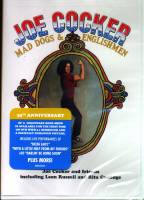
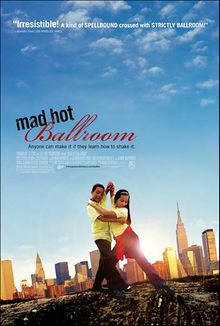
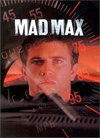
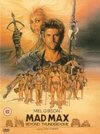

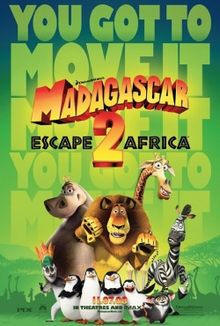
_poster.jpg/220px-Madame_Curie_(film)_poster.jpg)

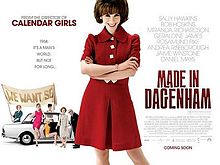
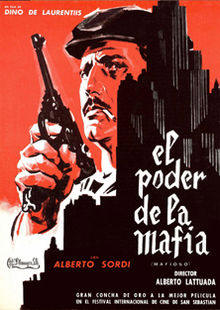

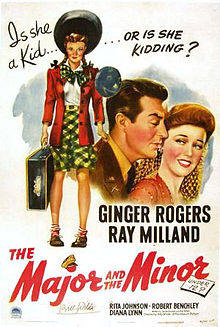
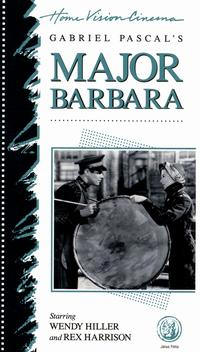
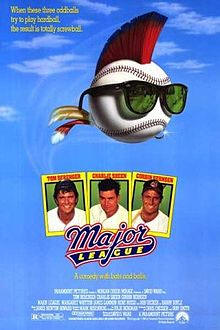
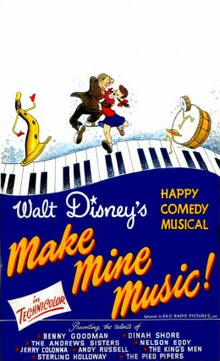
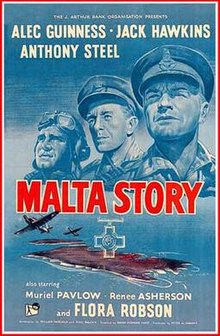
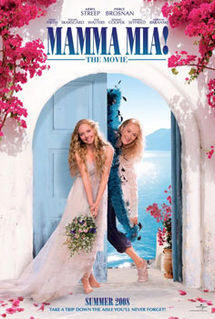
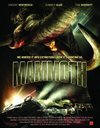
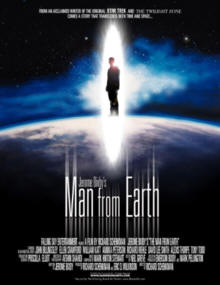

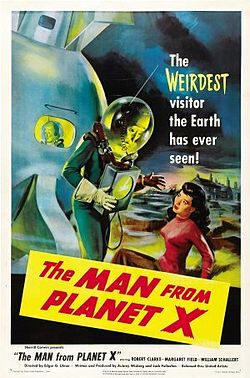


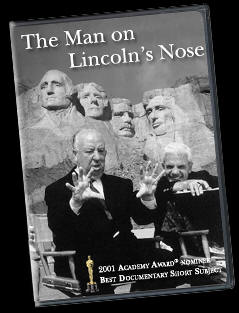

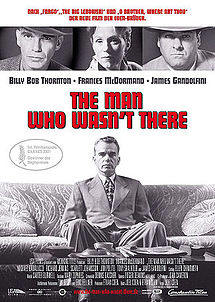
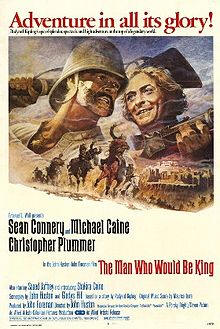
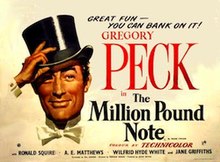






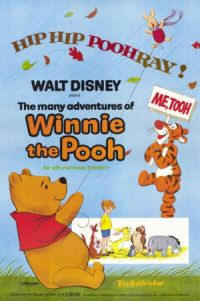


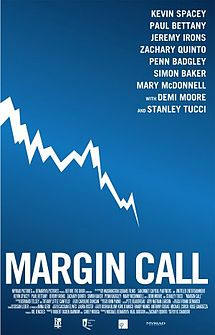
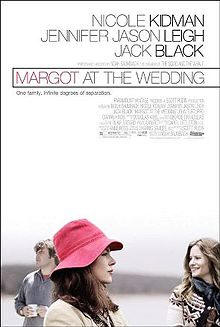

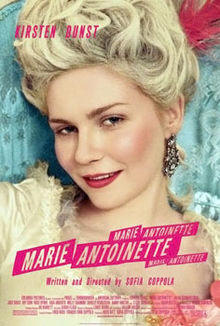




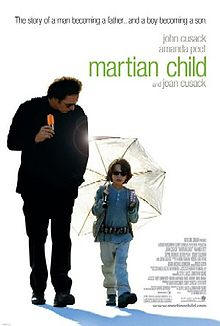
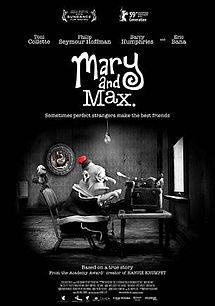
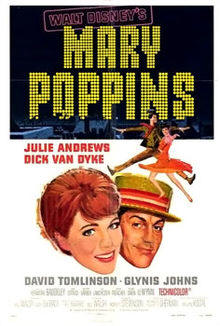

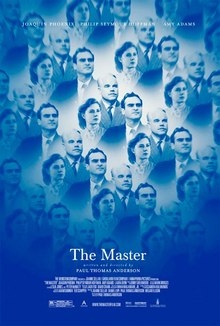




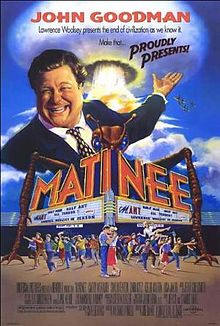



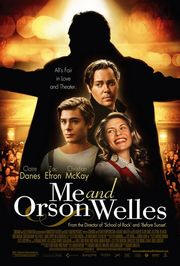





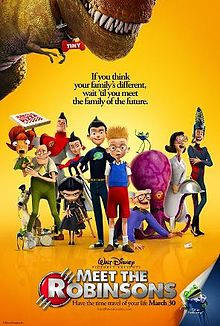
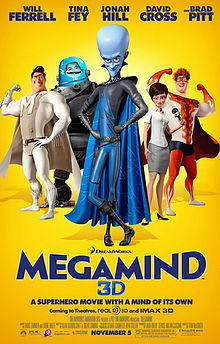
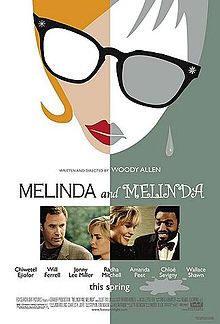



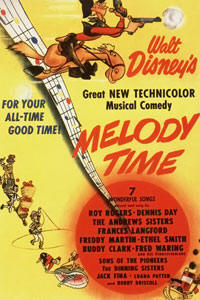
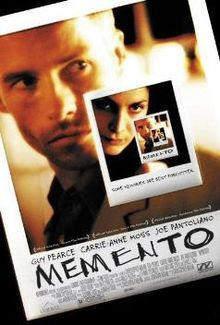


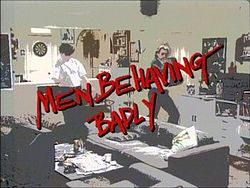
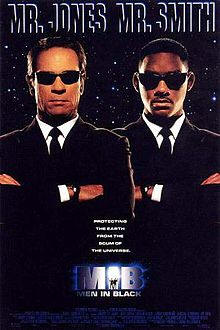


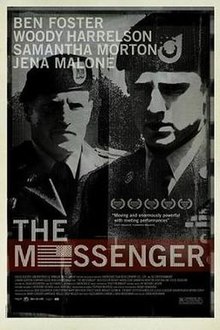


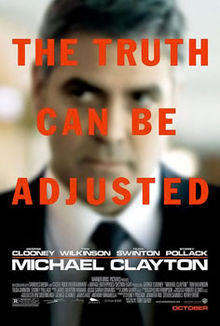


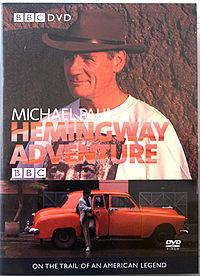
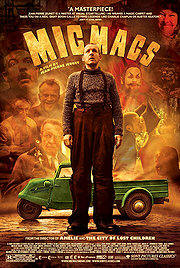
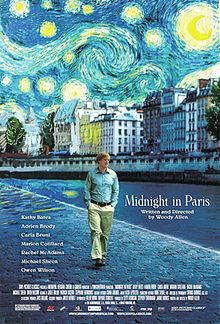
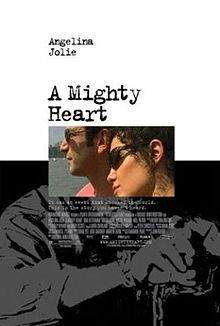


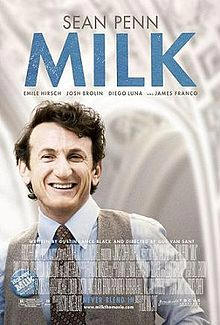

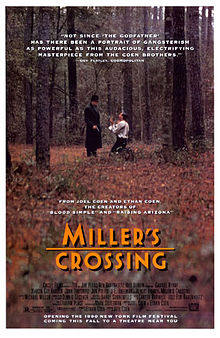


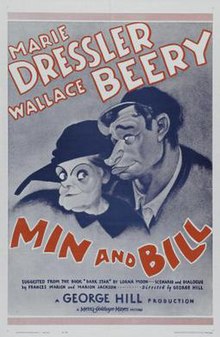

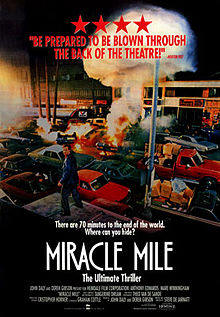
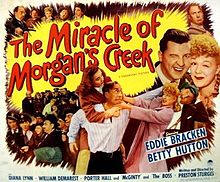

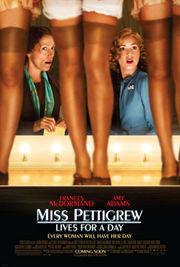


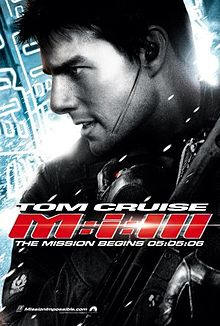
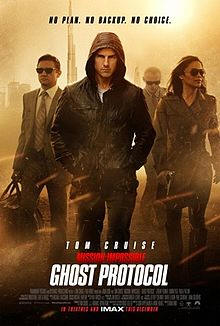
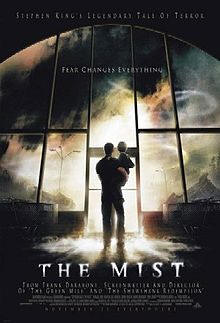
.jpg)






